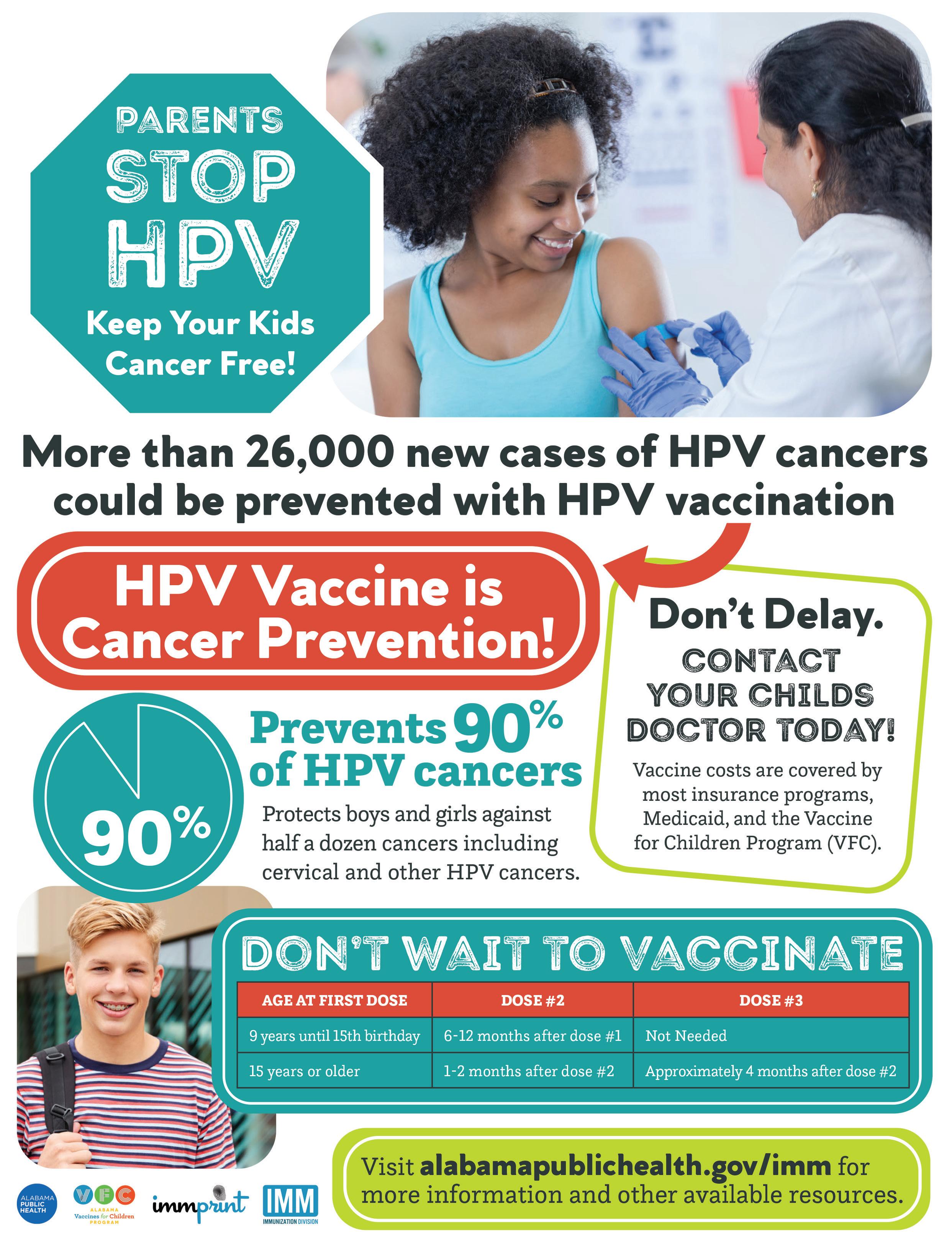
















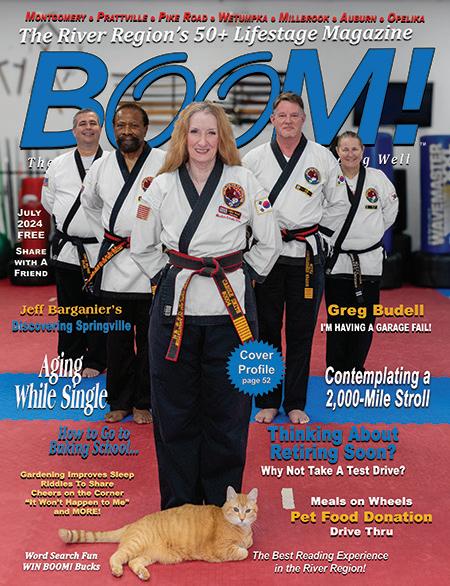

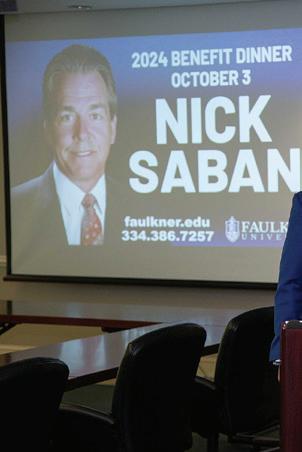

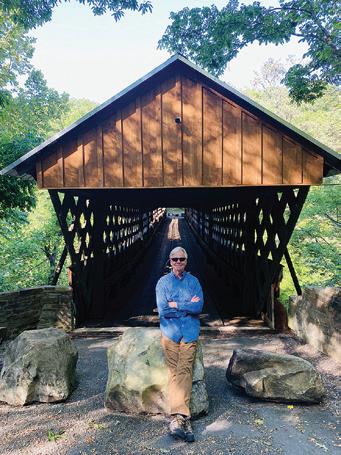
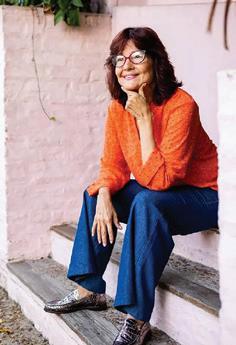
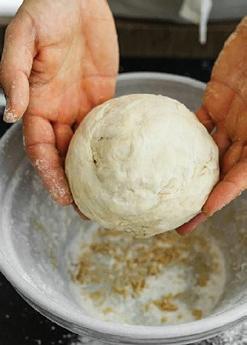
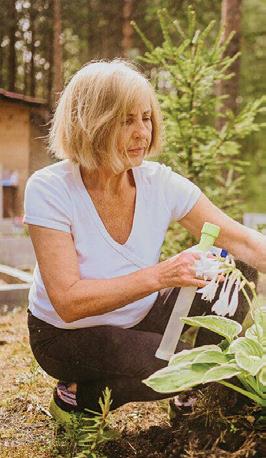
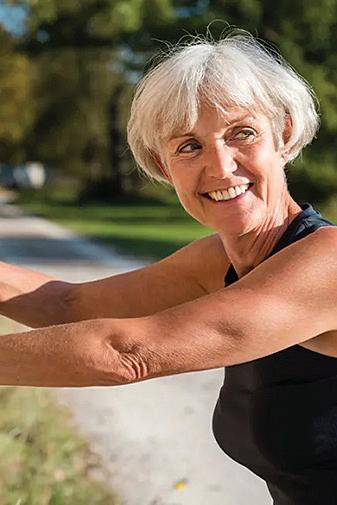
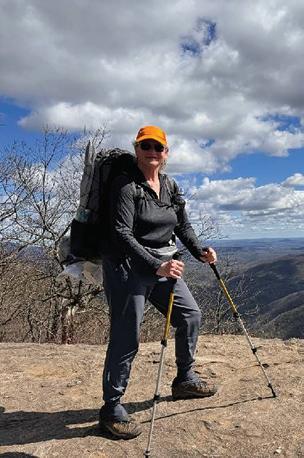

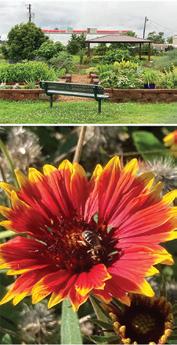



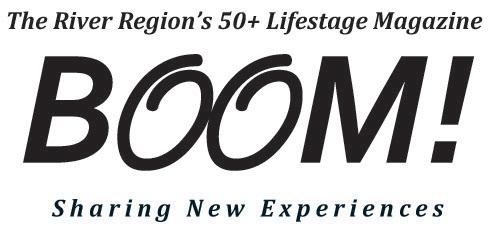
Publisher/Editor
Jim Watson
334.324.3472 cell/text jim@riverregionboom.com
Contributing Writers
Jeff Barganier
Tracy Bhalla
Greg Budell
Bella DePaulo
Sue Fagalde Lick
Craig Miller
Nancy Monson
Susan Moore
Lamont Pack
Carole Trawick Smith
Nick Thoma
Becky Upham
Mike Valles
Cover Photography
Photography by DiAnna Paulk photographybydiannapaulk.com
Advertising
Jim Watson, 334.324.3472 jim@riverregionboom.com



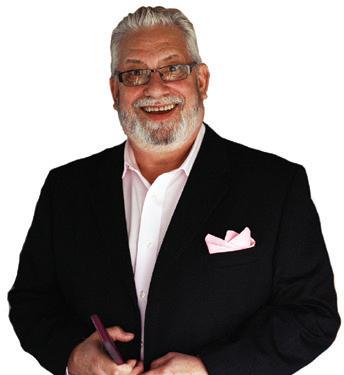
Like many Americans, I watched the Presidential Debate on June 27 between Joe Biden and Donald Trump. It was shocking in so many ways. We trust our President to lead us in times of trouble and to provide a steady hand when needed. To fight our enemies, to lead us into a better future, to be inspired in our pursuit of happiness. President Joe Biden disappointed most Americans and dramatically shook our confidence in his ability to be the leader of the free world. There’s no other way to understand his presentation.
As we celebrate America’s Independence Day, we should all ask ourselves what kind of America we want and who will lead us. I hope all of us will be serious citizens and demand honesty from the political class, which has been in short supply in the last few years. Our leadership needs to change for the better. This year’s election results will reflect the wisdom of the American people. I pray for wisdom.
This month’s cover profile is Carole Trawick Smith, the owner of the Family Karate Center located in Pepper Tree Shopping Center in Montgomery. Carole has been teaching karate since her days as a college student at Huntingdon College. When you do something, as long as Carole has done it, you become the expert in your field, and she has achieved that skill level in martial arts. Carole is an interesting woman who has experienced the loss of a spouse at a young age and fortunately found new love and husband to build a life with. Her grandmother rescued animals, Carole saw that compassion at a young age, and now she spends her time helping to rescue animals, especially cats. One of her rescues is a cat named MoMo, who she has trained to be a service cat to bond with the many students who take classes at her Family Karate Center. When you meet Carole, you feel her energy because she doesn’t know how to slow down. She ages well by giving herself to others and to the many animals she has saved. We enjoyed getting to know her and MoMo; we think you will, too.
We have much more information for your reading pleasure this month. Greg Budell describes what many of us can relate to—garage Failure! I do. We also have features from Jeff Barganier and his meanderings in small-town Alabama, which are always a fun excursion with Jeff. Are you single and aging well? According to another feature, the author explains that it's getting better. She wrote a book about it, and you can register to win it with a simple text to me! Also, check out articles on test driving your retirement plans, how to go to baking school from your home, and preparing to hike the AT from a seventy-something woman.
There’s plenty more to read this month, including a new Word Search worth $50 BOOM! Bucks, if you can complete it, text me your name for our monthly drawing. Congratulations to Joan Treadway for being our June Word Search Winner! Thank you for taking a few moments of your valuable time to read the July issue and maybe share it with friends and family; your support means the world to us. Stay cool this summer! Age Well, my friends.
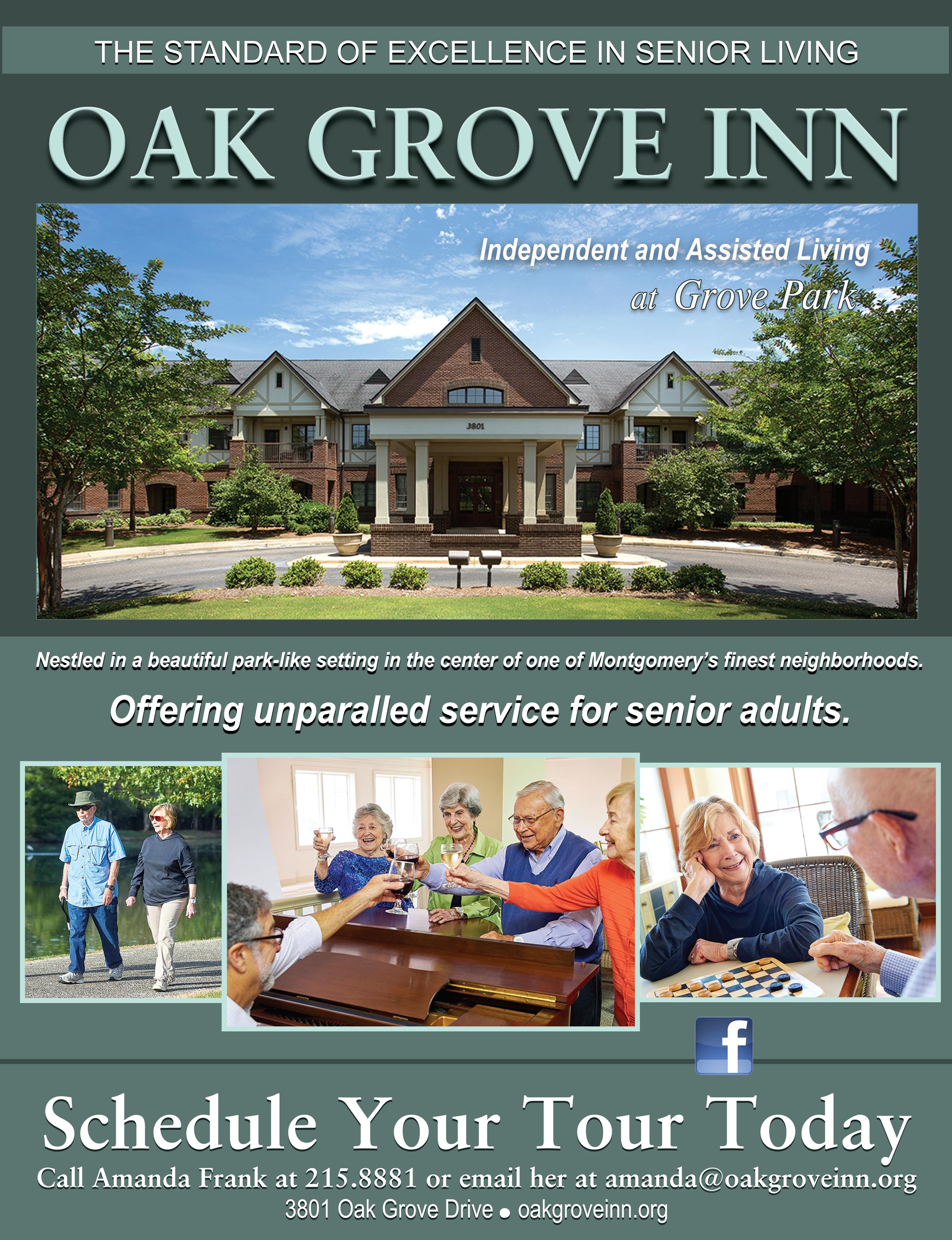

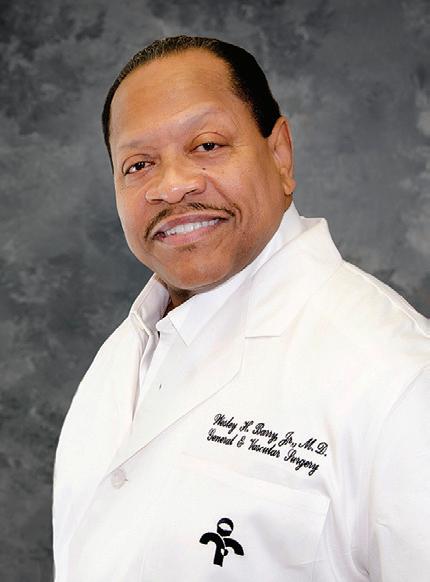
Wesley Barry, Jr, MD
1722 Pine Street, Suite 904 Montgomery, AL 36106
334-265-9225
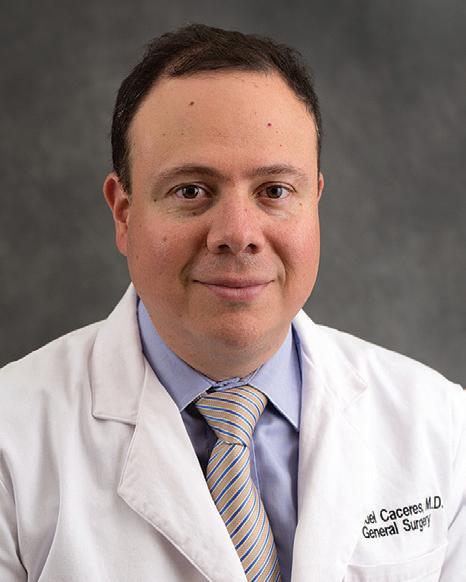
Manuel Caceres, MD 1722 Pine St., Suite 201 Montgomery, AL 36106
334.264.8741
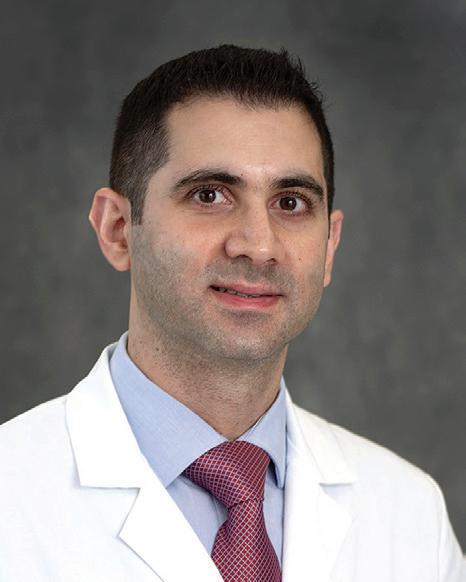
Jad Chamieh, MD 1722 Pine Street, Suite 201 Montgomery, AL 36106 334-293-6858

Brian Gary, MD
1722 Pine St., Suite 201 Montgomery, AL 36106 334.293.6858
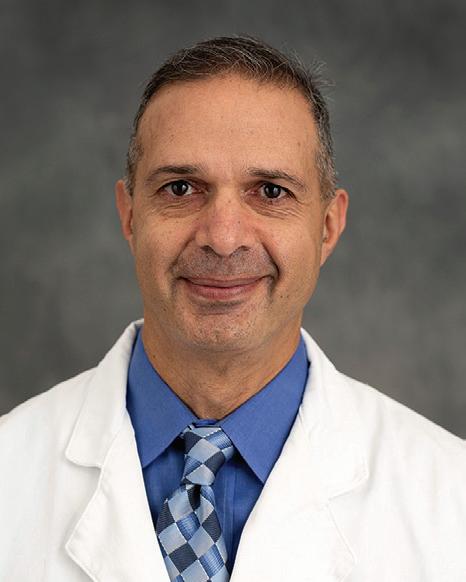
Parham Mora, MD
554 McQueen Smith Road N. Prattville, AL 36066
334.361.6126
A big misconception about general surgeons is that they are generalists and not specialists. In fact, they are quite specialized in their training, but this specialized training is over a very broad area. Their training may include rotating from different areas such as trauma, colon-rectum, plastic surgery, endocrine, critical care, cardiac, or transplant.
General surgeons don’t just operate on patients, they also evaluate patients who are sick before surgery, and oversee care after surgery. Most surgeries in a hospital are performed by general surgeons. They are privileged to follow a patient’s full journey from diagnosis and treatments through recovery. This allows general surgeons to connect with their patients.
A general surgery practice depends on the needs of patients around them. Many will also Sub-Specialize. Examples are breast, trauma, cancer and weight loss surgery. Our general surgeons have expertise in multiple types of surgery, including:
• Abdominal surgery • Bariatric (weight loss) surgery • Cancer surgery • Digestive tract biopsy or resection • Endocrine system assessment and repair • Head and neck surgery • Hernia repair • Pediatric surgery • Trauma surgery
Whenever possible, we use minimally invasive surgical techniques. These methods allow us to use smaller incisions that could shorten your hospital stay and speed your recovery time.
We encourage you to talk openly with our surgeons. Consider asking your doctor:
Is this an outpatient or inpatient surgery? What are the possible complications of this surgery? What kind of anesthesia will be used? Will you need any special preparation prior to surgery? Do you need to stop taking any medications before surgery? What type of care will you need at home? When can you expect to return to your regular activities? What can you do to help speed your recovery?
For more information visit www.jacksonclinic.org/specialty-care/general-surgery/



Sunday, July 21, 2024 Start Time 6:30 pm
MPAC-Downtown Montgomery
Legend. Icon. American Patriot. World renowned, record-setting performer. The Midnight Idol. Mr. Entertainment. No other name or person is so defining, representative or synonymous with Las Vegas and the entertainment capital of the world than Mr. Las Vegas himself… Wayne Newton.
Recognized and revered around the world, entertainment superstar Wayne Newton is known for his iconic signature song, “Danke Schoen” in addition to countless other top hit singles including, “Daddy, Don’t You Walk So Fast,” “Red Roses for a Blue Lady,” “At This Moment,” “The Letter,” “Summer Wind” and “Years.”
Tickets at Ticketmaster.com


"A true story from the Greg files"
It’s a prospect so overwhelming, so daunting, so intimidating I shrink before its sheer enormity.
Clean the garage?? Agh!
I’m convinced the worst feature a home can possess is a garage. Stuff goes in there. All kinds of stuff, much of which belongs in an air-conditioned environment but never quite makes the house. Books.
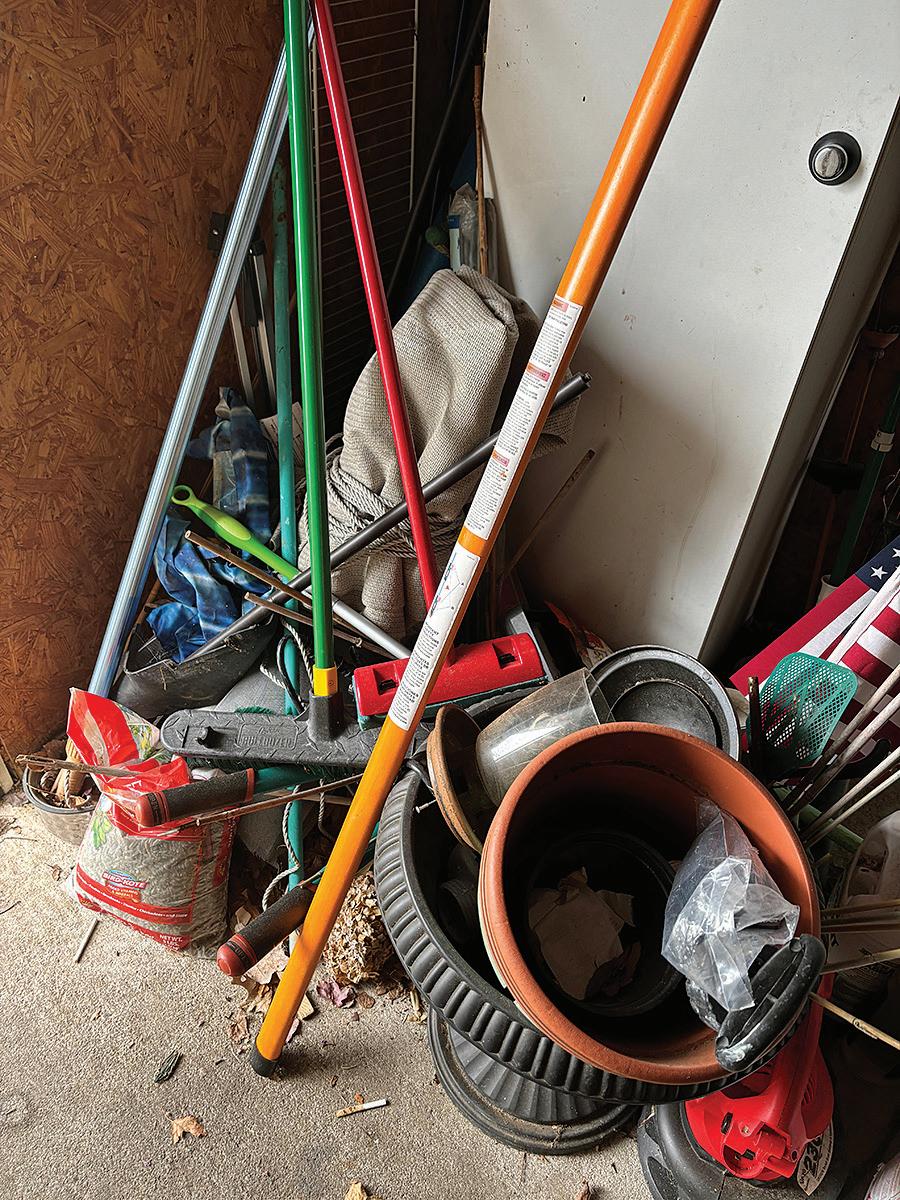
Framed photos. It’s a metastasizing beast that hasn’t proved worthy of a trip to the curb in the big green garbage can.
I went from a house with no garage to one featuring a 2-car. In eight years, there have never been two cars parked in there simultaneously. Doing so would require tossing my plastic tub of whiffle balls, yardwork things, and other piles of things growing inward from the walls. I went to play some whiffle ball home run derby with a neighbor recently. I went to look for my bat, which I found in a stack of other things with long handles (rakes, golf clubs, etc.) piled in a corner.
When I went to remove the bat, the entire pile moved with it. It had become inexplicably intertwined with other items. An old garden hose had wrapped itself around this teepee of junk. Dislodging it risked an avalanche so when
the bat refused to dislodge, I let it sit.
A garage is simply a crap magnet!
We recently engaged a local company (TreeMasters, and they’re great) to cut down trees that were dying. As they cleaned up, I asked the man with the hurricanestrength debris blower if he’d mind doing the
garage floor. He obliged, initiating a whirlwind of stuff that came spewing out from every corner. From underneath and behind the stacks and piles came a mélange of abandoned pens, a screwdriver, fastfood wrappers, cigarette butts, cups, small branches, and enough leaves to create an entirely new tree! It paid off, as over six dollars in bills and change emerged into the debris field (not to mention a missing work glove to recomplete the pair)!
There was enough miscellany to start a brand-new junk drawer, but there’s no room at that Inn within the house. The inside drawers are already dedicated to, uh, other crap.
I recently purchased a new coffee maker. I make a lot of coffee so I go through them quickly. For reasons unknown, I can’t dispose of the old ones. They return to the box they came in and then get placed on a shelf. There are 5 of them now making for a nice Coffee Maker Hall of Fame exhibit and will remain there until a therapeutic breakthrough gives me permission to let them go.
That psychosis explains much of my garage’s contents. It’s the Land of Things I can’t let go.
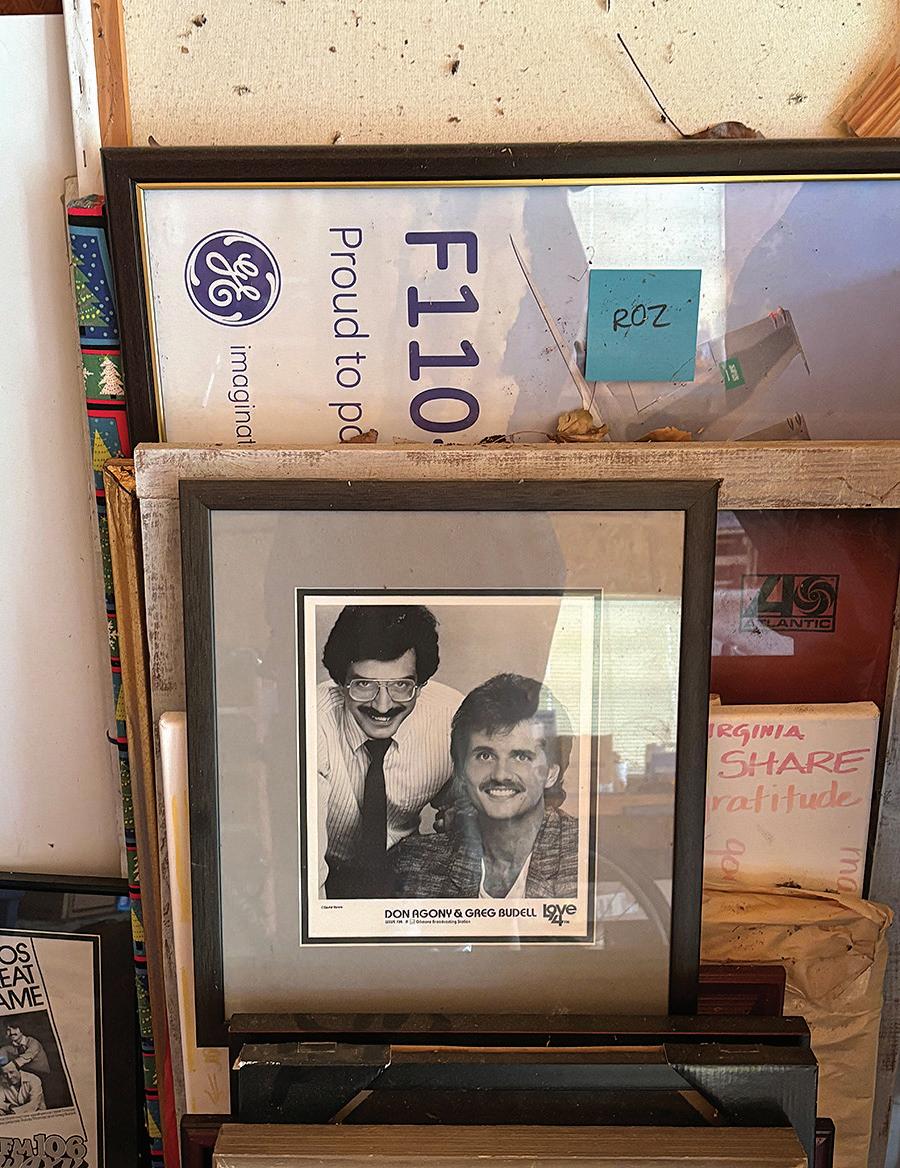
The shelf below the coffee pots is a laboratory’s stew of chemicals— near empty cans of household cleaners, RAID, motor oil, a light bulb that may or may not work, a can of Lava (whatever that is), and a holidaythemed water dish for the dog.
The lower the shelf, the goofier things get. There’s a pair of working old-school

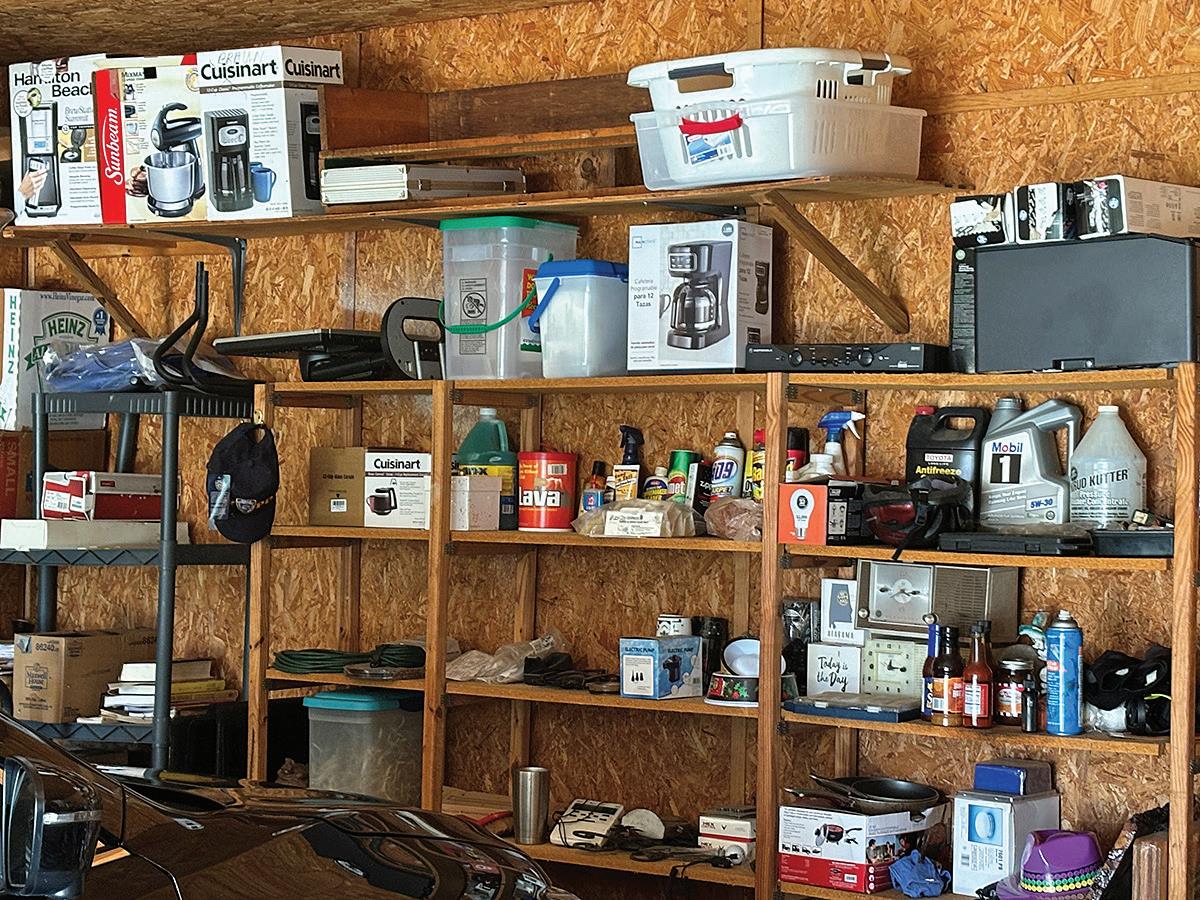
radios, a collection of sauces from Baumhower’s (they’re unopened and probably good), a box of old pots and pans, and a plastic Mardi Gras hat. Are you feeling sentimentality here?
Against one wall is a parade of framed things, items not deemed worthy of household display. I cautiously picked through them (in case one of those infamous Alabama garage snakes is hiding in there) and found one of my all-time favorite radio career pictures featuring the Miami Vice fashion of the time. I immediately promoted it to indoor status, albeit under my bed, which is another column yet to be written.
I recently decided to sharpen my golf game. There are 3 sets of clubs and 2 golf bags leaning on each other like closingtime bar drunks. When I grabbed Bag One, Bag Two came with it creating a festive, connected concoction threaded by a pool noodle. The noodle was next to a deceased pool cleaner, yet another item that may or may not work if given a second chance.
I’m pondering a good, old-fashioned garage sale. Pondering. I’ve been pondering this event since 2017. I need help.
I’m 99% sure if a thief came along and stole everything (thoughtfully allowing me to keep my bike and car) I wouldn’t miss any of this junk.
When the previous owner showed us the property, he excitedly pointed out the tool bench for my home improvement projects (I do have a hammer somewhere, and you know I have a few loose screws) and some storage cabinets emitting an antique aroma. The tool bench houses numerous boxes, most of which contain radio show prep printouts and things I never asked for but people gave me anyway. There’s a brass headboard for a single bed hanging on the wall, too. It has some interesting dents in it. What can you do with a beautiful carpet runner that’s too soaked in dog urine to ever be useful again?
Having surveyed this travesty, I decided on a solid plan of procrastination. I closed the door.
Anyone got the number of an arsonist they trust?
Happy 4th, BOOMers!
Share your thoughts on my experiences or other comments via email at gregbudell@aol.com. It's always fun to hear from BOOM! readers.
Greg Budell lives in Montgomery with his wife, Roz, and dog, Brisco. He's been in radio since 1970, and has marked 17 years in the River Region. He hosts the Newstalk 93.1FM Morning Show with Rich Thomas and Jay Scott, 6-9 AM Monday - Friday. He returns weekday afternoons from 3-6 PM for Happy Hour with sidekick, Rosie Brock. Greg can be reached at gregbudell@aol.com

By Nick Thomas
Any contemporary journalist would love the opportunity to interview famous biblical figures. Take Noah, for example. How might an interview with the world’s most famous seafaring zookeeper go? Perhaps something like this:
Journalist: Why do you think you were selected to build the ark?
Noah: Well, I was very fond of animals. In fact, I was president of the local Lions Club for nearly thirty years. So when the Boss upstairs was looking for someone to head up the ARC – the Animal Rescue Committee as we called it – He asked me to be chairman and I was pleased to accept. After that, my family always kidded me by referring to the project as Noah’s ARC.
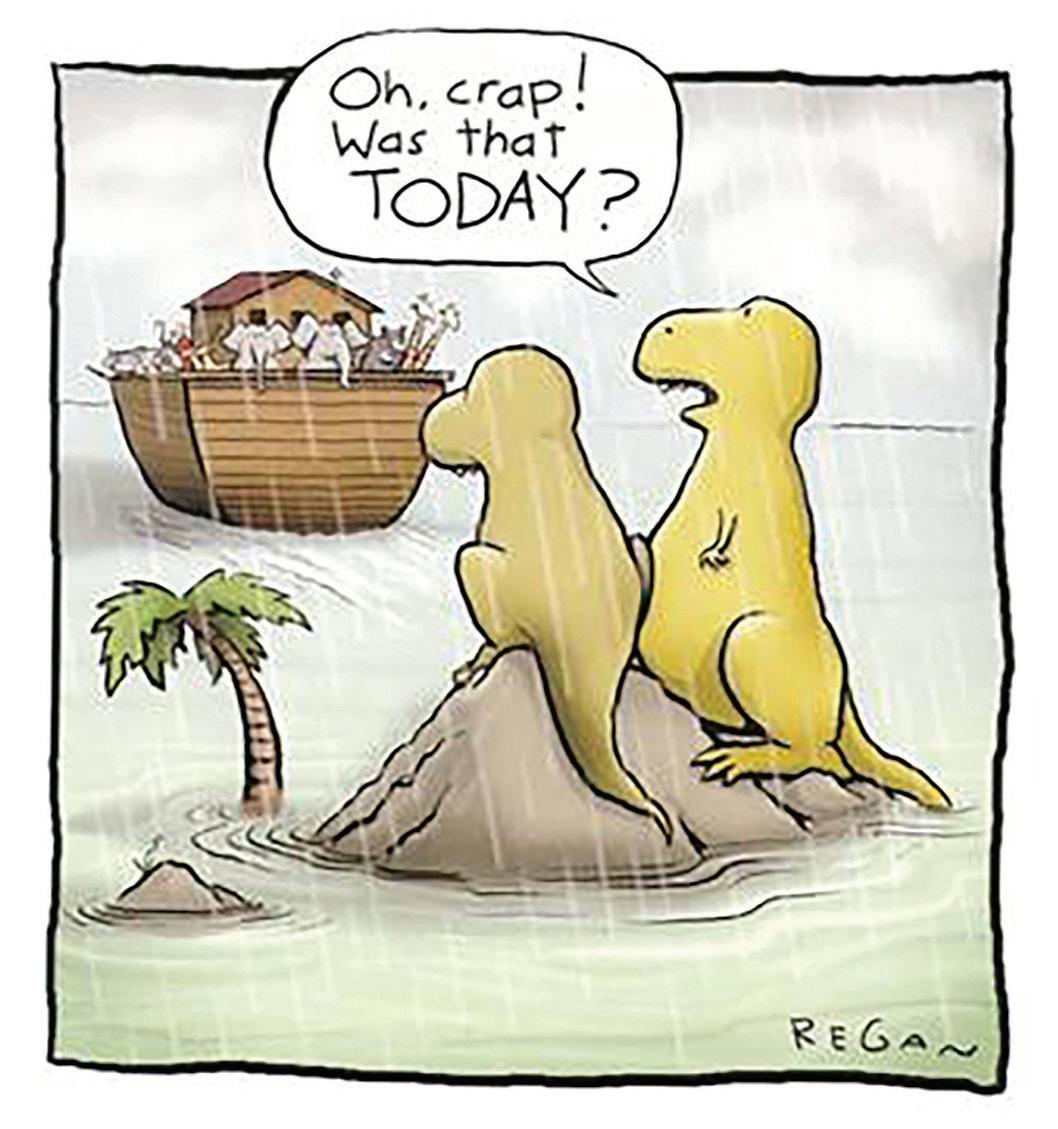
to get me a real good deal on 20,000 square cubits of cypress.
Journalist: People have wondered about animal species back in your time. Obviously, some animals were mythical, like unicorns......
Journalist: But as I understand it, it took you more than 100 years to build. Why did it take so long?
Noah: Hey, give me a break, pal. After all, I was more than 500 years old at the time. I just couldn’t pound those nails as fast as I could when I was a spry 250.
Journalist: Where on earth did you find all the materials to build the ark?
Noah: Well, my brother - Ace Goldstein - owned a chain of hardware stores across the Mediterranean Basin. He was able
Noah: Hang on now buddy, they were real! And lovely creatures, too – very gentle. But those horns were an accident waiting to happen. In fact, none of the animals standing in line to board the ark wanted the unicorns behind them. So the poor guys kept getting shoved back to the end of the line. They finally got tired of being pushed around and stomped off home.
Journalist: Perhaps you can shed light on one of the great historical animal mysteries of the planet. What really happened to the dinosaurs? Did they become extinct due to ancient
climate change, were they outevolved by mammals, or was it the giant asteroid theory?
Noah: Ah yes, in fact, my wife was actually to blame for that little incident. When she saw the two T-Rexs approaching the boat, she blocked the entrance and scolded me saying, "I am not having those messy T-Rexs aboard my boat. Do you know how much dino-dung they will produce in 40 days? I’m not cleaning up that mess. Either the T-Rexs stay behind, or I will!" Well, naturally I had to send the T-Rexs away. They were very disappointed.
Journalist: But what about the thousands of other dinosaur species? Why didn’t they make it into the ark?
Noah: Well, they were really ticked off when they heard what happened. In fact, they boycotted the ark in solidarity with the T-Rexs and refused to come aboard. They immediately filed a class action lawsuit against us, claiming that we were guilty of species profiling. We were due in court on the following Monday morning, but it was miserable weather, so the family stayed home in the ark. Just as well, really, it poured the whole day.
Nick Thomas teaches at Auburn University at Montgomery in Alabama, and has written features, columns, and interviews for many newspapers and magazines. See www.getnickt.org

Adults who have trouble sleeping may want to try getting their hands dirty for a better night’s rest.
A new study published in the Journal of Affective Disorders found that adults who spent time working in the garden had fewer sleep issues. The findings offer insight into the importance of unplugging from screens and devices and spending time outside.
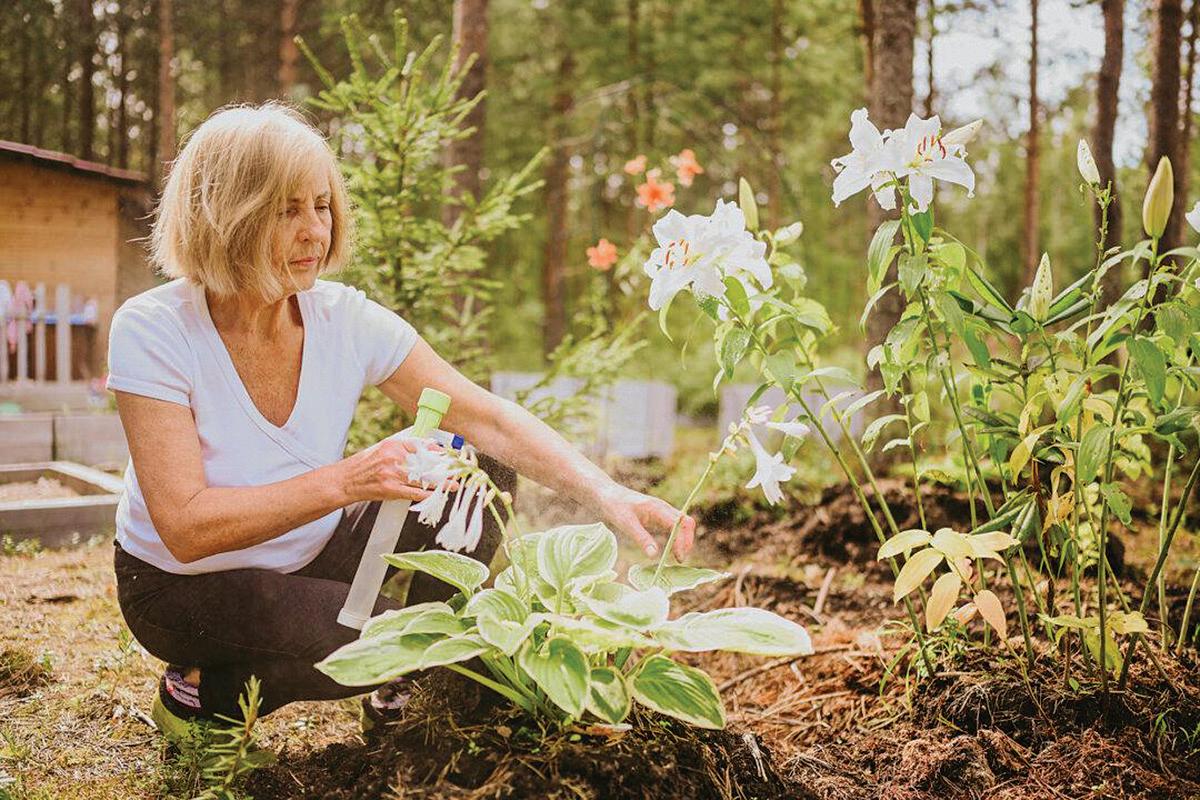
Our modern world, rife with smartphones, tablets, and laptops all offering endless entertainment, social media updates, and after-hours work emails, can make it hard to disconnect and wind down before bedtime. The National Council on Aging reports that 13.5 percent of American adults feel tired or exhausted most days and that more than one-third report getting less than seven hours of sleep in a 24-hour period. Furthermore, about 30 percent of adults report having insomnia, with about 10 percent of those having it so bad that it affects their daily lives.
Although a person can recover from one or two nights of poor-quality sleep, chronic poor-quality sleep and lack of sleep have been associated with an overall lower quality of life. People who don’t get enough sleep are at heightened risk for diabetes, obesity, heart disease, cancer, stroke, dementia, and death.
“Therefore, it is crucial to explore and develop effective strategies to promote sleep health,” the researchers who conducted the new study wrote.
The research team looked at gardening as a potentially effective way to alleviate sleep issues because it offers multiple forms of physical activity with a low risk of injuries. Previous research has found that gardening correlates to reduced sleep-related disease outcomes. However, there have been no large-scale studies of community-based populations until now.
In the study, researchers examined data from more than 62,000 American adults who participated in a 2017 Behavioral Risk Factor Surveillance System telephone survey. The data included information on adults who didn’t exercise, who gardened, and who exercised. The sample included 16,707 non-exercisers, 4,243 gardeners, and 41,148 exercisers. Respondents also reported how well and how long they slept, noting any complaints, such as whether they suffered from insomnia, daytime sleepiness, or sleep apnea.
Gardeners and exercisers were less likely to experience multiple sleep complaints than people who didn’t exercise.
Additionally, gardeners who spent more time gardening reported even fewer sleep complaints, indicating that the sleep benefits may increase the longer one spends in the garden. However, the effects gardening had on sleep apnea were unclear.
Gardening is a great, accessible activity because it requires full-body movement, which mimics a workout: Weeding requires squats and lunges, and carrying bags of mulch works out the large muscle groups. Digging, raking, and using a push mower are all physically intense activities that can get the heart rate up. In fact, if you aren’t used to many of these activities, you might find yourself sore after a solid day out in the garden.
Beyond the physical benefits of gardening, growing and eating homegrown fruits and vegetables can positively affect your diet. Gardeners are typically more likely to include vegetables in a well-balanced, healthy diet, which can also help improve sleep.
Lastly, spending time outdoors is known to improve physical and mental health. Allergies aside, people tend to breathe more deeply when spending time outside. Doing so helps clear the lungs, improves digestion and immune response, and increases oxygen levels in the blood. Furthermore, spending time outside has been shown to reduce heart rate and muscle tension, which can lessen some of the damage caused by sleepless nights.
Source: www.epochtimes.com
For years, scientists have said that aspirin has the potential to protect people from the deadly grip of colorectal cancer. But only now are they unlocking just how this common pain reliever may pull off such a feat.
Researchers have discovered that aspirin’s cancer-fighting prowess hinges on rallying the body’s immunity to combat malignant cells.
Colorectal cancer is a type of cancer that affects either the large intestine or the rectum. Globally, it is the third most common type of cancer and the second leading cause of cancer-related death. Colorectal cancer accounts for roughly one in 10 of all cancer cases, according to the World Health Organization (WHO).
A recent study published in Cancer, a peer-reviewed journal of the American Cancer Society, suggested that aspirin might prevent colorectal cancer by boosting certain aspects of the natural immune response against malignant cells. Researchers analyzed 238 colorectal cancer patients who underwent surgery between 2015 and 2020, with 12 percent being regular aspirin users. Tissue samples
revealed aspirin users had less cancer spread and higher tumor immune cell infiltration than non-users.
Further lab analysis showed aspirin exposure increased the expression of the CD80 protein on certain immune cells. CD80 is known for regulating cell activity, and its increased expression enhanced the immune cells’ ability to detect tumorassociated proteins.
Rectal cancer patients using aspirin exhibited higher CD80 levels in healthy rectal tissue, suggesting aspirin stimulated increased immune surveillance.
“Our study shows a complementary mechanism of cancer prevention or therapy with aspirin besides its classical drug mechanism involving inhibition of inflammation,” Dr. Marco Scarpa, a general surgeon at the University of Padova Hospital in Italy and the study’s principal investigator, said in a press release.
Aspirin may also protect against colorectal cancer by reducing inflammation, which can impair the immune system’s ability to fight cancer.
Aspirin’s history dates back around 3,500
years to ancient Egyptians using willow bark, a natural source of the compound. However, it wasn’t synthesized as a drug until 1897 by Bayer chemist Felix Hoffmann, eventually becoming one of the world’s most widely used medications.
Evidence shows this naturally occurring substance is proving effective against significant health threats.
One study linked low-dose aspirin use (81 milligrams at least three times weekly) to significantly reduced risk of a certain type of hormone-fueled breast cancer in over 57,000 women followed for eight years. “This is the first report to suggest that the reduction in risk occurs for lowdose aspirin and not for regular-dose aspirin and only among women with the hormone receptor-positive/HER2-negative subtype,” the authors wrote.
In low 75- to 100-milligram doses, aspirin can reduce heart attack risk by decreasing blood clot formation in diseased arteries. Thus, those who’ve had a heart attack or stroke are often advised to take daily aspirin to prevent blood clots.
Despite the benefits, all medications, including aspirin, carry potential risks. Though typically safe, aspirin can cause gastrointestinal ulcers, increased bleeding risk from blood thinning, and allergic reactions like hives and asthma in some people.


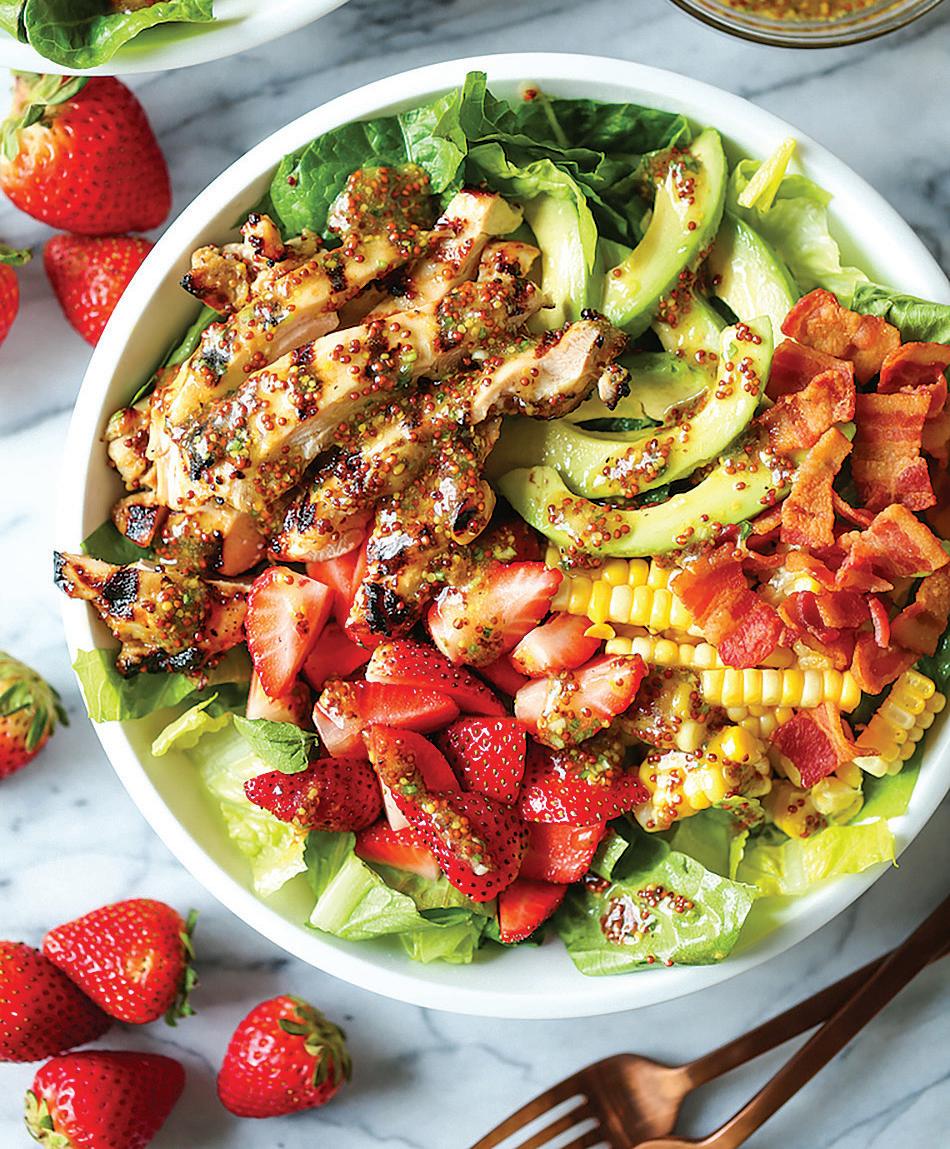
Made with the juiciest, tender honey mustard chicken, romaine, strawberries, avocado and corn. And the dressing is perfection!
⅓ cup whole grain Dijon mustard
2 green onions, thinly sliced
3 tablespoons extra virgin olive oil
1 ½ tablespoons honey
1 tablespoon white balsamic vinegar
Kosher salt and freshly ground black pepper, to taste
1 pound boneless, skinless chicken thighs
1 tablespoon canola oil
4 slices bacon, diced
1 head romaine, roughly chopped
1 ½ cups quartered strawberries
1 avocado, halved, seeded, peeled and sliced
1 cup corn kernels, canned or roasted
< In a medium bowl, whisk together Dijon, green onions, olive oil, honey and vinegar; season with salt and pepper, to taste; set aside 1/3 of the mixture. Place remaining 2/3 of the mixture in the refrigerator until ready to serve.
< In a gallon size Ziploc bag or large bowl, combine chicken and reserved Dijon mixture; marinate for at least 2 hours to 6 hours, turning the bag occasionally. Drain the chicken from the marinade.
< Preheat grill to medium heat.
< Brush chicken with canola oil; season with salt and pepper, to taste. Add chicken to grill, and cook, turning occasionally, until chicken is completely cooked through, reaching an internal temperature of 165 degrees F, about 10 minutes.
< Heat a large cast iron skillet over medium high heat. Add bacon and cook until brown and crispy, about 6-8 minutes. Drain excess fat; transfer bacon to a paper towel-lined plate.
< To assemble the salad, place romaine lettuce in a large bowl; top with chicken, bacon, strawberries, avocado and corn. Pour the Dijon dressing on top of the salad and gently toss to combine.
< Serve immediately.
Source: https://damndelicious.net/2019/04/01/honey-mustardchicken-salad/
More than 6 million Americans, including one in three seniors, suffer from dementia. Add in the spouses, siblings, adult children, and professionals responsible for their care, and we all have a stake in this story. But No Way Out of This is not about a noble, self-sacrificing wife who gives up everything to take care of her husband. We see those spouses in romanticized books and movies—but they’re not telling the whole story. Nobody’s that good. When Sue Lick’s husband’s charming forgetfulness worsened into dementia, she traded her life of writing, music, and travel with the love of her life for years of caregiving, guilt, and impossible decisions. And No Way Out of This is not just about Alzheimer’s Disease. It’s about mental illness, taking care of beloved pets in the chaos, the trials of marriage, examining your support system (or lack of one), and love stories that don’t end happily ever after. It’s the real story.

About Author Sue Fagalde Lick
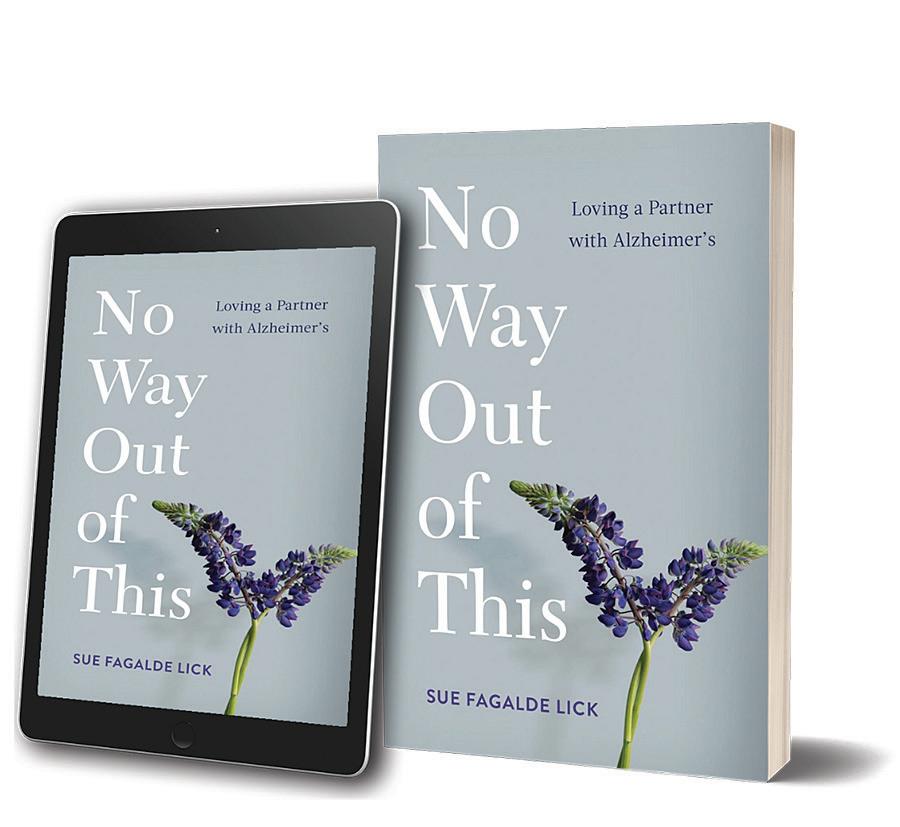
Sue Fagalde Lick is a former San Francisco Bay Area newspaper reporter and editor, is the author of the poetry chapbooks Gravel Road Ahead and The Widow at the Piano: Poems by a Distracted Catholic, the nonfiction books Stories Grandma Never Told: Portuguese Women in California, Childless by Marriage, and Love or Children: When You Can’t Have Both; and the novels Up Beaver Creek and Seal Rock Sound. When not writing, she sings and plays piano, guitar, and mandolin at St. Anthony’s Catholic Church and wherever people will listen. She lives in a coastal forest just south of Newport, Oregon.



Seven-production slate includes A Christmas Carol, Shakespeare’s Hamlet, and The Wizard of Oz
Alabama Shakespeare Festival will put up seven productions in its 53rd season, featuring stories that probe humanity’s courage, conscience, and conviction. ASF proudly continues its mission of building community by engaging, entertaining, and inspiring people with transformative theatrical performances and compelling educational and community programs.
“The upcoming season celebrates stories for all ages about our humanity through laughter, sentimentality, and strength,” said outgoing ASF Artistic Director Rick Dildine.
Opening the season is Ken Ludwig’s sentimental, biographical Dear Jack, Dear Louise. Dildine’s full-scale adaptation of A Christmas Carol takes over the Festival Stage in a triumphant celebration of the holiday season for the whole family. In the new year, we face fear and change with love and humor in The Watsons Go To Birmingham — 1963. Spring brings the comic swashbuckling of Ken Ludwig’s Sherwood: The Adventures of Robin Hood in a mini-rep with William Shakespeare’s most puzzling tragedy, Hamlet. From the 2023 Southern Writers Festival, and the first of ASF’s New Southern Canon, emerges the world premiere of Donnetta Lavinia Grays’ Kudzu Calling. Our season concludes with the RSC’s musical and MGM filmlike adaptation of The Wizard of Oz on the Festival Stage.

“We so appreciate the support and dedication of our returning — and new — subscribers and patrons,” said ASF Executive Director Todd Schmidt. “We hope to see them all back in Season 53 for the exceptional work ASF is known for.”
Season 53 subscription renewals are under way. New subscriptions go on sale June 28, 2024. Single tickets go on sale July 22. Subscriptions and tickets are only available through the ASF Box Office at 334-2715353 and at ASF.net

ASF continues its opportunities for the community to further engage with theatre through SchoolFest student matinees with cast and crew talkbacks, ASF Insights (deep dives with theatre and subject matter experts to enhance the patron experience), the always popular Bard Talks with theatre historian Dr. Susan Willis before each Shakespeare production, and community discussions around themes in its productions.
The Southern Writers Festival of New Plays will enter its 24th year of developing new works about the South, with public readings on June 15, 2024, in conjunction with the world premiere of Zelda In the Backyard, Elyzabeth Gregory Wilder’s play developed through the 2022 festival.

Share your comments and read hundreds more from fans of Jan's at www.facebook.com/JansBHG
Opens at 11 am, Great Food! DAILY MEAT & THREE
Served at Lunch along with our regular menu from 11AM - 3PM Lunch & Dinner! Live Music! 850 Eastern Blvd, Montgomery, AL 334.277.8300
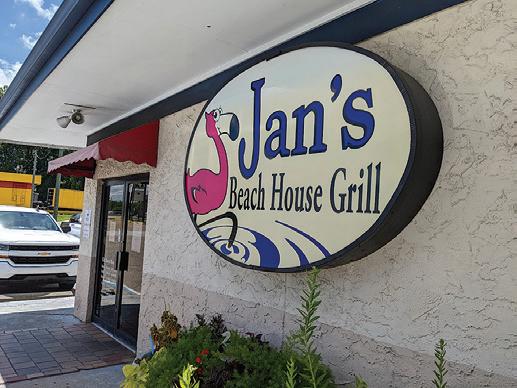
By Becky Upham
What does it take to live to be 100 years old? If you answered good genes mixed with a little luck, you may be in for a surprise: There are actually a few habits that increase your chances of joining the “centenarian club,” according to a new study.
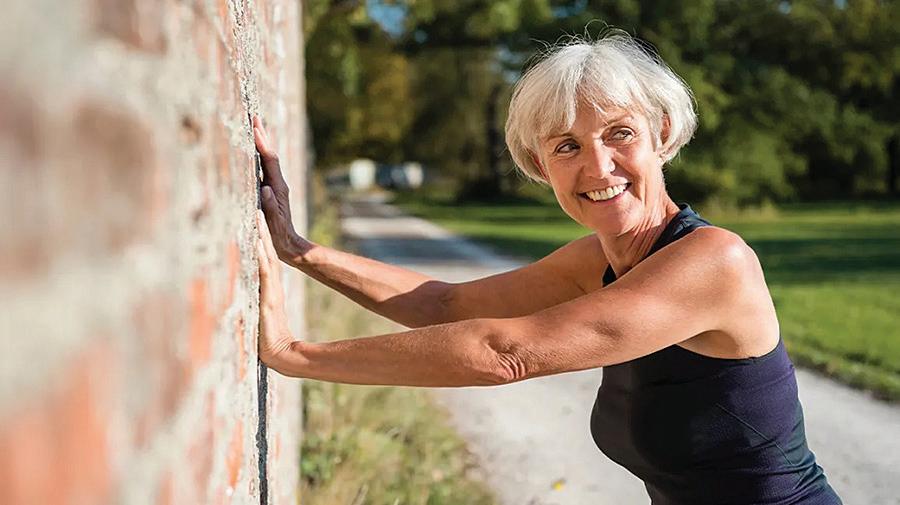
When it comes to lifestyle choices, physical activity appears to be the most important to extend life into the 100s, followed by never smoking and having a healthy diet, says a coauthor of the study, Xiang Gao, MD, PhD, a professor and researcher at the Institute of Nutrition at Fudan University in Shanghai.
These findings highlight the importance of a healthy lifestyle in maximizing lifespan,
both in younger people and those who are 80 or older, the authors wrote. “Our findings suggest that adhering to a healthy lifestyle is
important, even later in life,” says Dr. Gao.
Although there’s plenty of evidence that people following a healthy lifestyle generally have a lower risk of many chronic diseases, the researchers wanted to find out if practicing certain habits after the age of 80 would continue to have life-extending benefits.
People aged 80 or older who could potentially live to 100 by 2018 were
randomly selected from a nationwide survey. The investigators then collected data through face-to-face interviews, and included age, sex, place of residence, years of education, marital status, and if they had any chronic conditions such as diabetes, heart disease, hypertension, or cancer.
Lifestyle factors, including smoking, alcohol use, exercise, dietary diversity, and body mass index (BMI), were combined to create a healthy lifestyle score.
Never or not smoking, not drinking or moderate drinking, regular exercise, dietary diversity, and a BMI within the normal range were all considered favorable. For each category, participants were assessed on both their current and former status.
Scientists evaluated participants’ diets based on how often they ate fruit, vegetables, fish, beans, and tea. The more often they ate foods from that group, the higher their diet diversity score.

When viewing each element individually, researchers found that exercise was the most important factor in longevity and was associated with a 31 percent higher likelihood a person would become a centenarian, followed by never smoking and a healthy diet.
Researchers didn’t find a significant link between alcohol use or BMI and the likelihood of living to be 100 years old. Although the study wasn’t designed to discover why that might be the case, investigators suggested that moderate alcohol use wasn't necessarily related to adverse health outcomes, and that a higher BMI may have a protective effect against frailty in older people.
When scientists calculated the healthylifestyle score using only exercise, diet, and smoking status, they found that a higher score was even more strongly linked to centenarians. This type of study can be valuable but represents only one pillar in our understanding of how people can live longer, says Valter Longo, MD, a professor of gerontology and biological sciences and the director of the Longevity Institute at the University of Southern California in Los
Angeles, who was not involved in the study.
It’s
Dr. Longo agrees a healthy lifestyle can help improve the chances of seeing your 100th birthday, and says that it’s never too late to make positive changes, especially when it comes to a healthy diet.
People who get regular exercise, see good healthcare providers, and have a biological age lower than their chronological age all have improved chances of hitting the century mark as well.
Biological age is based on an analysis of chemical modifications in your DNA that can estimate how quickly or slowly you’re aging compared with your peers.
Longo has written books on longevity and developed a fasting mimicking diet (FMD) that lowered participants’ biological age by about 2.6 years.
Here are his tips for eating to live longer.
Eat mostly vegan. Longo suggests a
primarily plant-based diet that limits meals with fish to a maximum of two or three per week. Choose seafood with a high omega-3, omega-6, and vitamin B12 content (salmon, anchovies, sardines, cod, sea bream, trout, clams, shrimp).
Keep protein intake low. If you are younger than 65, keep protein intake low — between 0.31 to 0.36 grams (g) per pound of body weight. That comes to 40 to 47 g of proteins per day for a person weighing 130 pounds (lb), and 60 to 70 g of protein per day for someone weighing 200 to 220 lb. After age 65, you should slightly increase protein intake by way of fish, other lean proteins, eggs, dairy (he suggests goat and sheep products), beans, nuts, and legumes.
Minimize saturated fats from animal and vegetable sources. Limit meat, cheese, and sugar, and maximize good fats and complex carbs.
Focus on whole grains and veggies. That includes tomatoes, broccoli, carrots, and legumes and generous amounts of olive oil (3 tablespoons per day).
Source: www.everydayhealth.com



Thrifty Tuesdays are back this summer at the Montgomery Zoo. Starting June 4 – July 30, every Tuesday we will offer ½ price admission after 12pm (noon) until 4pm. We are excited to provide this discount to our River Region community and beyond. This is a great opportunity to visit our amazing park at an affordable rate while still enjoying everything the zoo has to offer. This offer cannot be combined with any other discount, coupon, and/or offer. This includes military discount, senior discount, and AAA discount. It is only available on Tuesdays after 12pm (noon). Admission to the Montgomery Zoo includes:Admission to the Zoo and Mann Wildlife Learning Museum - Entry to Waters of the World from 10:00 am – 2:00 pm - Entry to Parakeet Cove from 10:00 am – 3:00 pm - Entry to Reptile FacilityDaily Keeper Talk at 1:30pm. Additional adventures and attractions: - Train ride: $3 per person - Giraffe Encounter: $3 per person - Sky Lift Ride: $5 per personParakeet feed sticks: $2 per stick. For more info visit www.montgomeryzoo.com


Language may drastically change over time, but many of the ways in which we use it have stayed the same, a phenomenon proven by ancient riddles and “yo mama” jokes discovered on Mesopotamian and Babylonian tablets dating back thousands of years. Indeed, it seems probable that for as long as we’ve been communicating with each other, we’ve been finding ways to keep things interesting with wordplay, good-natured razzing, and riddles.
Though linguistic trickery is found in all corners of the globe, the word “riddle” originated from the Common Germanic verb rēdaną, which means “to interpret or guess.” Within the definition lies the explanation for what makes riddles so appealing and hilariously frustrating: There are often many potential answers, but it’s the guesser’s responsibility to outsmart the riddler by choosing the right one.
Riddles are part brainteaser, part joke, and part exploration into the subtle nuances of language. We challenge you to guess the correct answers to these head-scratching riddles, and then turn to page 17 to see whether you’re right.
1. What can go up a chimney down, but can’t go down a chimney up?


6. What do Alexander the Great and Winnie the Pooh have in common?

2. What question can you never say yes to?

3. What has one eye, but can’t see?

4. What can travel all around the world without leaving its corner?

5. . What kind of room has no doors or windows?

7. What is the end of everything?

8. What part of the chicken has the most feathers?

9. What has a bottom at the top?

10. . What is red and smells like blue paint?

11. When is a door no longer a door?

12. Two in a corner, one in a room, zero in a house, but one in a shelter. What am I?

13. A plane crashed between the border of France and Belgium. Where were the survivors buried?

14. Poor people have it. Rich people need it. If you eat it you die. What is it?

15. Spelled forward, I’m what you do every day; spelled backward, I’m something you hate. What am I?
Riddle Answers: Page 17
Source: www.riddles.com
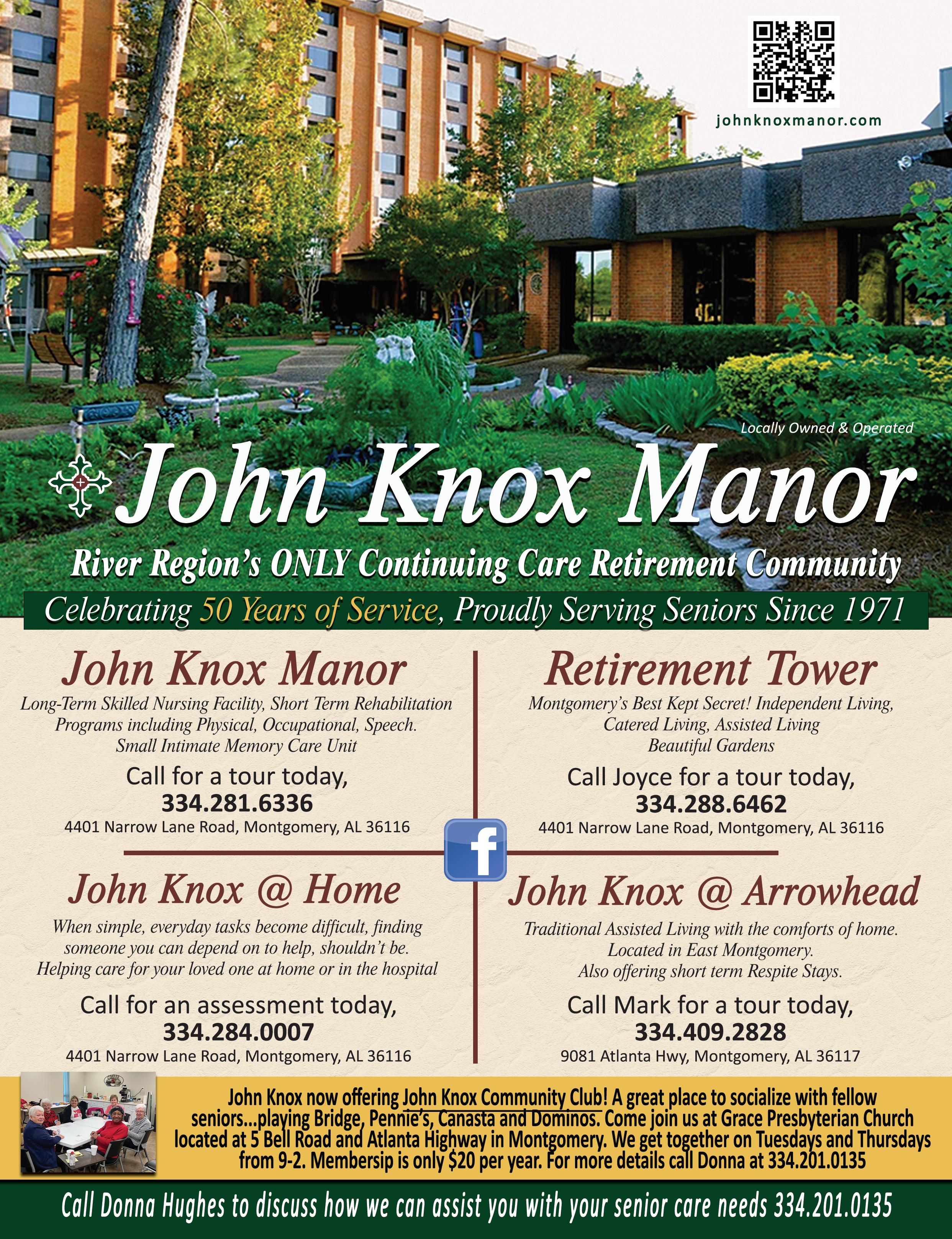
By Nancy Monson
Bread, bagels, baguettes, cream puffs, eclairs, Danish, pretzels, cupcakes, croissants and pizza. You name a type of baking, and chances are Brooklynite Ira Polly, 60, has taken a class in it. "My wife and I are empty nesters, and I want a hobby that I can turn to in the future when I retire from my job as a technologist," he explains. (He writes computer code for a major national bank.)
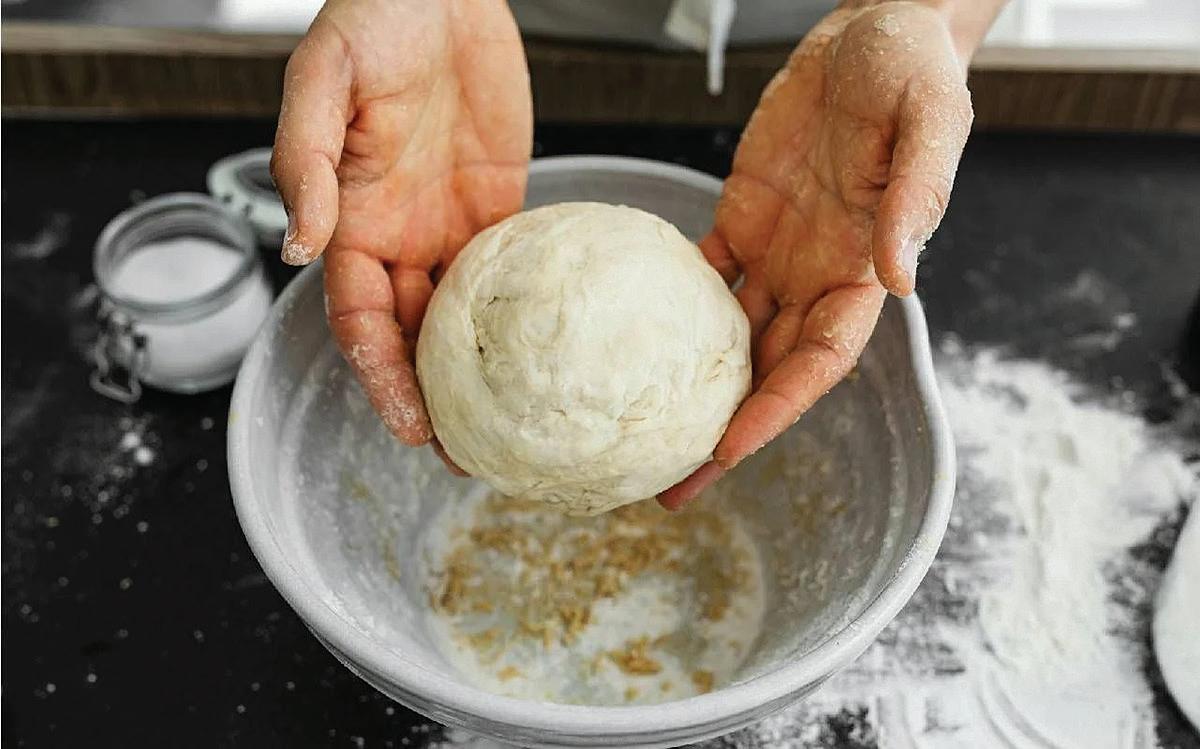
Baking is a good fit: "I like figuring out the chemistry of baking and watching the dough rise, and it gives me something to do with my hands."
Ironically, he doesn't care to eat most of his creations, but rather prefers to give them away to others. "I bake for the satisfaction and enjoyment of making something that I hope will look like it's from a store," he says.
During the pandemic, it seemed like everyone took up baking sourdough bread (next on Polly's list of classes to take) as a way to pass the time. For many, the desire to bake continued even after they had returned to their regular lives and jobs.
Enter online baking classes: Whether you are looking for live classes that are streamed into your home or on-demand classes that are pre-recorded so you can watch them at your convenience, it's now easy to find a virtual course that fits your interests and allows you to create fantastic confections without leaving your home kitchen.
King Arthur Baking Company. (https://www.kingarthurbaking.com/ ) The largest and most prominent online baking instruction site, the King Arthur Baking Company attracts about 6,000 virtual students a year — including Polly. Their in-person classes are also hugely popular, with 15,000 students attending annually at their Vermont and Washington State campuses.
"We have had an online baking program since 2020," says Amber Eisler, director of the Baking School. "We've found that going online makes our classes much more accessible because people can bake from their home kitchens but have the same level of access to our instructors." A wide array of baking topics is covered, from sweet treats, pies and breads, to savory chicken pot pies, ramen noodles and falafel.
You'll receive a list of suggested equipment, supplies and ingredients when you sign up for a class, but don't worry if you don't have everything. "Our instructors can work with you if you don't have a particular piece of equipment,
you realize your pan size isn't quite right or you've run out of an ingredient," says Eisler.
The format for classes is a "bake-along" on Zoom with two teachers and two cameras — one focused on the instructors and the other on the baking surface, she explains. The instructors lead a group of up to 24 students through a recipe. Just as if you were there in person, you can ask questions of the instructors and share visual images of your progress and results. On-demand classes are also available, and there are lots of free recipes and baking advice posted on the King Arthur website.
Masterclass. (https://www.masterclass. com/subcategories/bake-deliciouspastries-desserts ) Starting at just $10 a month, you can take as many on-demand baking courses on Masterclass as you like, led by master bakers, pastry chefs and chocolatiers. You can also view about 200 courses on a variety of other topics. Skillshare ($13.99/month plus) and Udemy ($20/month) are similar course aggregator websites that offer access to on-demand baking classes.
Christina Tosi Baking Class, Studio. com: (https://studio.com/classes/ christina-tosi/creative-baking) Taking this immersive on-demand class ($249) from the award-winning pastry chef behind New York City's Milk Bar Bakery will help you become a more confident and creative baker over the course of a month. Plus, you'll gain access to three of Milk Bar's recipes.
Molly J. Wilk's Online Pastry School (https://courses.mollyjwilk.com/ bundles/mollyjwilk-online-pastryschool) For $28/month or $280/year, you can tap into a growing video library of French pastry recipes. Membership includes one new pastry recipe a month and one live Q&A with American ex-pat Molly J. Wilk, who attended Le Cordon Bleu and now teaches virtually from her home in Versailles, France.
Zingerman's Bakehouse. (https://www. bakewithzing.com/virtual-classes)
This Michigan-based company offers live pastry, bread and cake classes online, along with baking kits that provide everything you need to make their recipes.
Baking Hacks
To get great results, note of these tips:
Buy essential baking equipment. A rolling pin, baking pans and parchment paper are de rigueur. You can use regular measuring cups for baking if you like, although for more professional and precise results you may want to consider
purchasing a digital scale to weigh your ingredients. You may also want to purchase a thermometer to place in your oven, and a stand mixer. You don't need a bread-maker, says Eisler, although you may want one.
For people with arthritis in the hands, a French rolling pin that is thicker in the middle and tapers to the ends on either side may be a better choice than a traditional handled rolling pin because you don't have to grip the handles. French-style rolling pins also allow you put more weight in the center of the pin rather than on the outer handles, which is really where you want to be applying pressure to your dough.
If you can't find the ingredients or equipment you need locally, King Arthur has an online baking store that can help you get ready for class. They also sell gluten-free and keto-friendly product lines.
Get to know your oven. Baking times can differ between gas and electric ovens, and opening and closing the doors can
change the temperature.
Keep a diary of what you make and how you make it. You'll likely bake something more than once. "The instructors will tell you how to do something, but you have to experiment with your own oven and equipment," says Polly.
Call the King Arthur Baker's Hotline if you need help. The company runs a baking hotline at (855) 371-2253 staffed by real-life bakers for emergency and non-emergency baking calls. You can ask them anything from "Why won't my dough rise?" to "I've run out of certain ingredient — what can I substitute in?" and "what do I need to do if I'm baking at high altitude?"
Nancy Monson is a writer, artist and coach who frequently writes about travel, wellness and creativity. She is the author of "Craft to Heal: Soothing Your Soul with Sewing, Painting, and Other Pastimes," Connect with her on Instagram.
source: www.nextavenue.org


Get ready for the tastiest event of the year as the 12th Annual Pike Road Crawfish Boil makes its highly anticipated return on Saturday, May 18, 2024!
Hosted at Century Church from 10 AM to 6 PM, Century Church is located at 1001 Marler Road Pike Road, AL 36064. This favorite community event promises a day filled with great food, live music, and lots of fun, all in support of a great cause.
The Pike Road Crawfish Boil brings the community together for what we all believe in – PIKE ROAD SCHOOLS! Proceeds from the event directly benefit the Pike Road Patriot Fund, which benefits arts and athletics for Pike Road Schools. We are excited to share that over the past decade, the Pike Road Patriot Fund has donated $190,343 to arts and athletics for
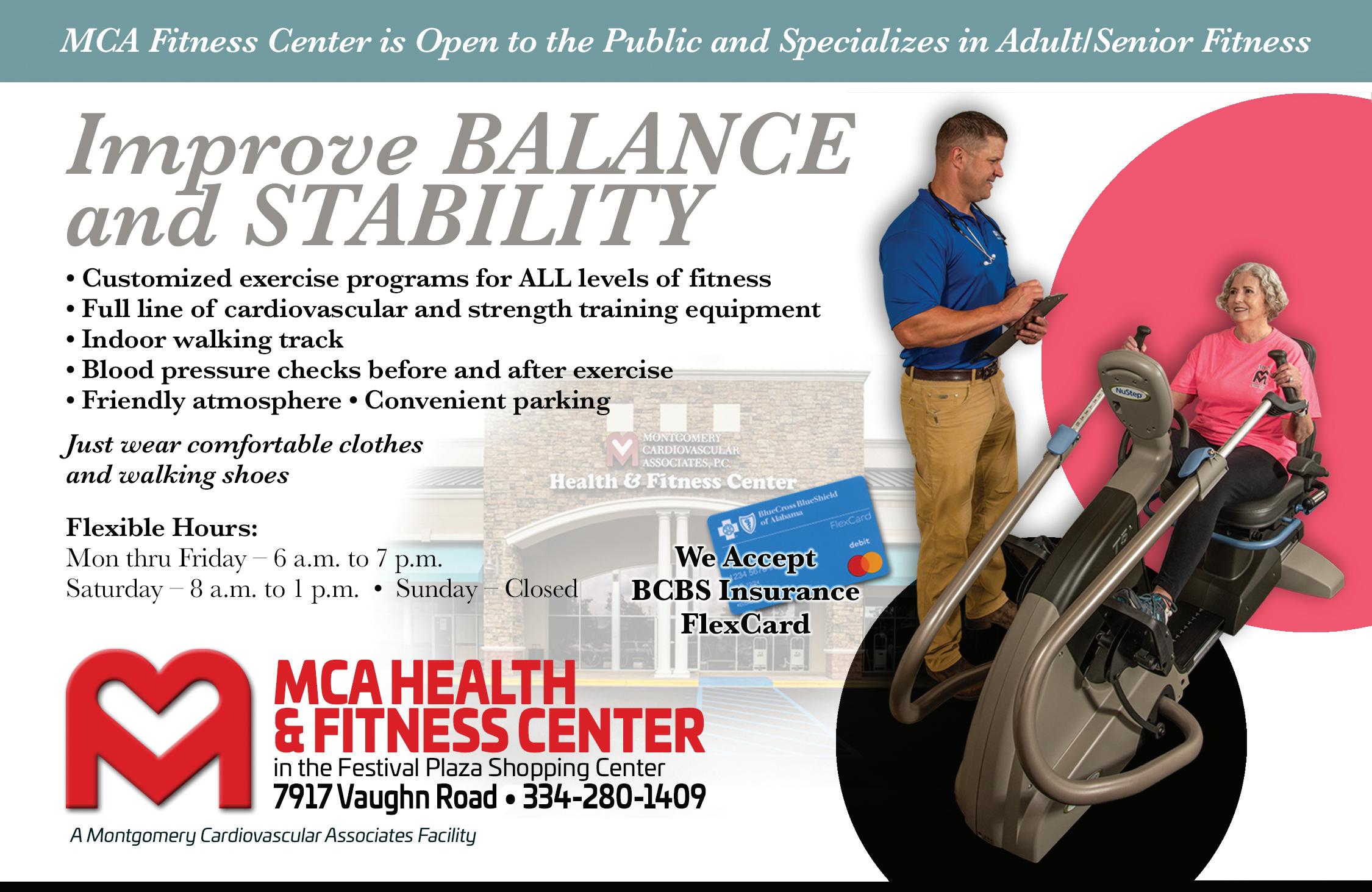

By Craig Miller
When Jeanette Rice announced that she was taking on the Appalachian Trail at age 73, no one in her family was truly surprised. Rice is a lifelong adventurer. She once rode her bike from Seattle to Baltimore and spent several of her early retirement years sailing with her husband, Bill, from Nova Scotia to the Caribbean.
Still, as Bill Bryson's 1998 best-seller "A Walk in the Woods," will testify, hiking the "A.T.," as it's known in shorthand, is no walk in the park. It's a grueling 2,197mile trek that starts west of Athens, Georgia, winding north through 14 states, and culminating in a climb up the 5,268-ft. Mt. Katahdin in central Maine.
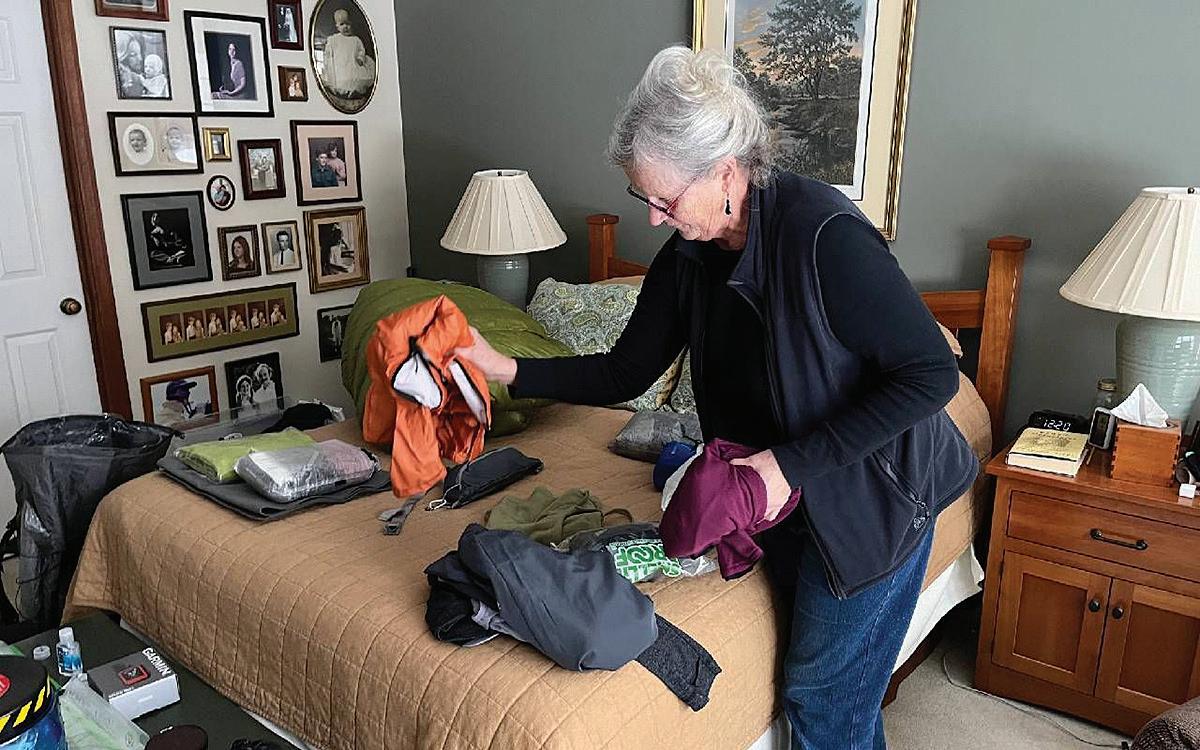
Appalachian Trail Conservancy, which keeps the official tally, Clark's achievement does not technically qualify as a thruhike, as it took longer than 12 months to complete.
Once Rice made up her mind and began setting dates, she initially kept her plans from most of her family and friends. "I just didn't want to hear a lot of questions," she explains. "I don't think anybody could talk me out of this. I shared it with Bill and we generally don't tell each other what to do," she laughs.
Rice had been mulling the possibility of trekking the A.T. since 1992, when she discovered some trail guides in a book shop. "It was like the clouds opened up," she vividly recalls. "The sun came out, the spirits came down and said, 'You are supposed to do this.' And I said, 'Yeah, I'm supposed to do this.' And I'm running outta time because I'll be 74 when I'm on the trail."
Rice is not the first septuagenarian to take on the A.T. but turning 74 along the way, a successful thru-hike — completing the trail end-to-end within a year — would require Rice to tie the current age record for a woman, set by Nan "Drag'n Fly" Reisinger, who finished the trek in 2014.
The average A.T. thru-hiker is 37, but most who complete the trail are in their 20s. In 1955, Emma "Grandma"
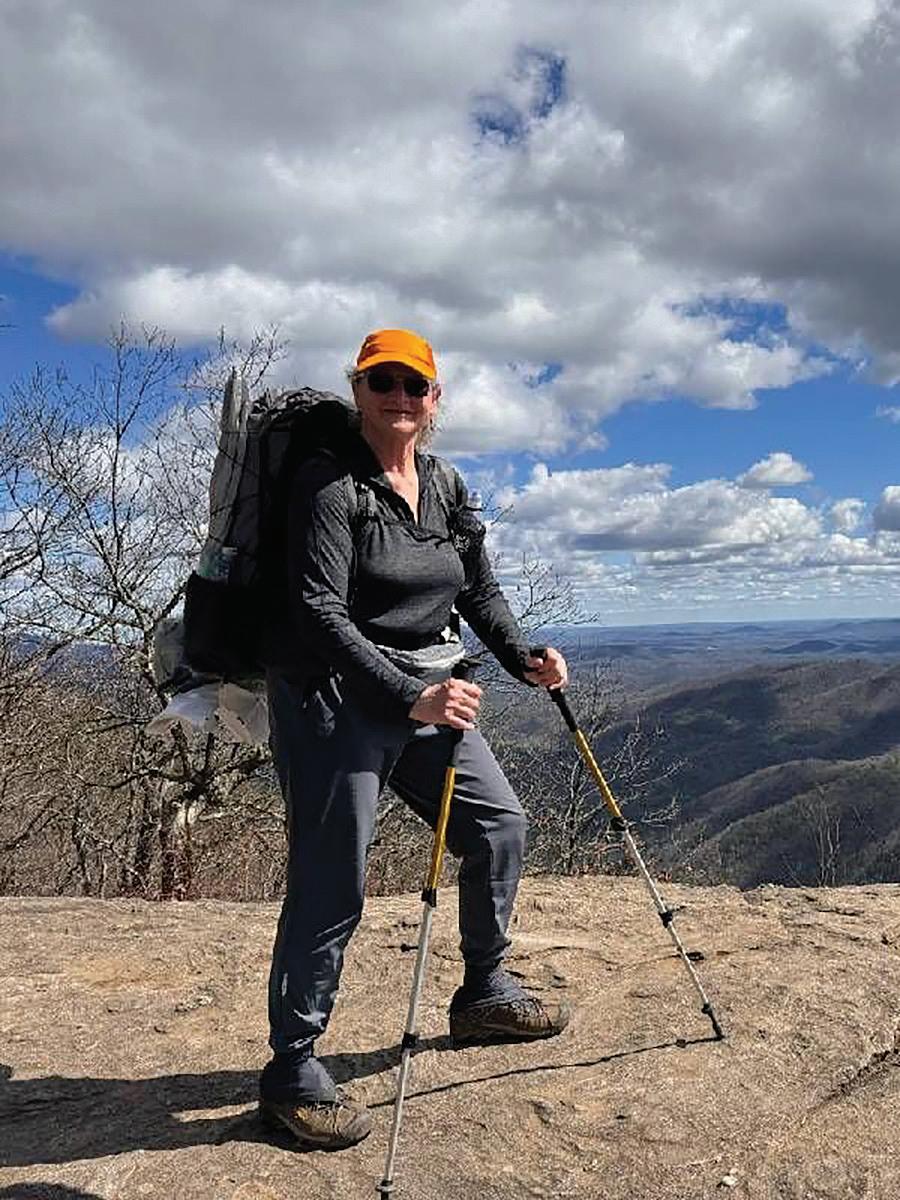
Gatewood became the first woman to solo the A.T. when she was 67. Last year, Pamela Clark, 76, of Florida managed to cover the entire trail, though with some forced interruptions. According to the
Rice trained doggedly for months by briskly walking the back roads near her home in the Helderberg Hills of upstate New York. But soon after she departed from the trail's southern terminus in the Chattahoochee National Forest, Rice began to encounter some challenges of her own. She found that water could be hard to come by along the trail, and she was pummeled by some severe weather.
Both are growing concerns along the A.T. as the climate becomes more chaotic. Generally speaking, the northern reaches are getting wetter and subject to more frequent washouts, while the southern section is drying out and seeing more wildfires.
Then, about 54 miles from the starting line, atop Rocky Mountain, she was stung by a bee. It startled her because at altitude in early March, it seemed too chilly for that to be a worry. But in Rice's case it's always a worry because she's "deathly allergic" to bee stings. "Oh, it'll kill me," she says.
"All of a sudden, zap – behind my left thigh or left calf. And really, I'm like, 'No,' she laughs in retrospect. "And then my lips started swelling and I started getting itchy."
She did a deep dive into her pack for one of two epinephrine injectors or "epi-pens" she had brought along and jabbed herself in the thigh to stave off any life-threatening effects – but she was mildly rattled by having to use one of the pens so soon into her trip.
In spite of it all, Rice says she was on Cloud Nine, churning up five to 12 miles a day. "I loved it," she recalls, with still reverberating bliss. "I was so happy. I felt so peaceful. I was doing great. I enjoyed every day. I didn't have any aches or pains. Nothing hurt. I felt like I was getting stronger."
Initially Rice's husband, Bill, seven years her senior, had taken the whole idea in stride (so to speak). But after he bid farewell to his wife, he began to worry. At one point her GPS device sent Bill an errant ping, showing her well off the trail. She says he began frantically checking in to see if she was all right.
"The last two days I was on the trail, he seemed to be in such a frenzy with texts and phone calls that he ran my battery down," recalls Jeanette. Bill's angst was understandable. In their 55 years of marriage, the two had never been separated for more than about six weeks and this outing was estimated to take six months.
As the worries and stress mounted for Bill and the rest of the Rice family, they began to weigh more heavily on Jeanette. She came to realize there was more at stake than her own pride, more to consider than her own physical and mental preparedness for what they all expected to be a monthslong trek. Finally, barely 80 miles into it, Rice made the tortured decision to head home.
"I sobbed unmercifully before I made the decision to come home to him," she recalls. "I didn't want to get off trail."
The A.T.'s magnetism is legendary. According to Ann Simonelli at the Appalachian Trail Conservancy, 3 million to 4 million people leave their footprints on it in a typical year, but just a little more than 1,400 earned their "2000-Miler"
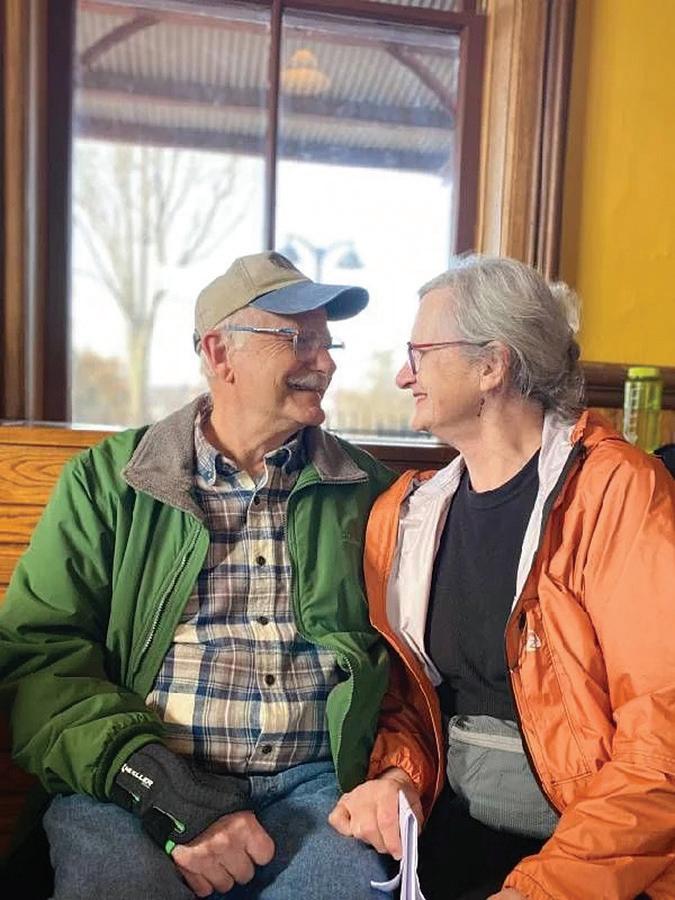
certificates in 2022 (which was a big year and the most recent one with complete data, as people are still reporting in from 2023).
"A thru-hike for many people definitely relies on community and others to help keep the thru-hikers going," says Simonelli. But who supports the support group back home?
"I don't know if it's a cautionary tale," says Rice on reflection. "It's a tale of how relationships evolve. And I think we have to continue to be cognizant of each other's positions and feelings."
But the itch is still there to be scratched. "I can't seem to shake the need to do this," says Rice.
When she first came off the trail, Rice seemed resigned to becoming a "segment hiker," taking on the world's longest continuous footpath a piece at a time. But after only a few weeks at home, she was once again determined – not just to
finish the trail – but to start again at the beginning and thru-hike the whole thing. Maybe next year.
"If I'm still vertical next spring, I fully intend to start again," she now insists. "I'm supposed to do this. I'm supposed to learn something and I don't know what it is."
One thing she's learning is patience. She draws on some centuries-old wisdom from Sun Tzu's "The Art of War": "Those who are victorious plan effectively and change decisively. They are like a great river that maintains its course but adjusts its flow." "That's how I will be successful," says Rice. "And I'm hoping that I'll find renewed hope and a renewed purpose when I come back."
Tempted to take on the A.T. as an older adult? Here are some tips gathered from various sources by the Appalachian Trail Conservancy:
• Prepare your body
• Do lots of walking, then practice hiking on trails carrying a pack similar in weight to a thru-hike pack (33.9 pounds).
• Exercise to improve flexibility, side-toside stability and strength in your knees, quadriceps, core and upper body.
• Listen to your body
• Take a "zero day" (a day off the trail to rest) at least once every two weeks.
• Limit yourself to 8-12 miles a day for the first few weeks to give your body time to adjust to the rigors of day-in, day-out hiking.
• Connect with past A.T. thru-hikers of similar ages and demographics
• The ATC maintains “affinity lists” of people who have recently completed hiking all or much of the A.T. and are willing to share their advice.
The lists – including an over-55 group – are available by e-mailing info@appalachiantrail.org.
Craig Miller is a veteran journalist based in the northern Catskills of New York. His reporting is focused on climate science and policy, energy and the environment. In 2008 Miller launched and edited the award-winning Climate Watch multimedia initiative for KQED in San Francisco, where he remained a science editor until August of 2019. He’s also a proud member of his local volunteer fire department.
Source: www.nextavenue.org
Despite all the scaremongering about being old and single and supposedly alone — scaremongering aimed with special intensity at single women — for just about everyone who is single at heart, single life just gets better and better over time. Those hallmarks of the single at heart life — joyfulness, psychological richness and authenticity — become even more deeply experienced.
By Bella DePaulo
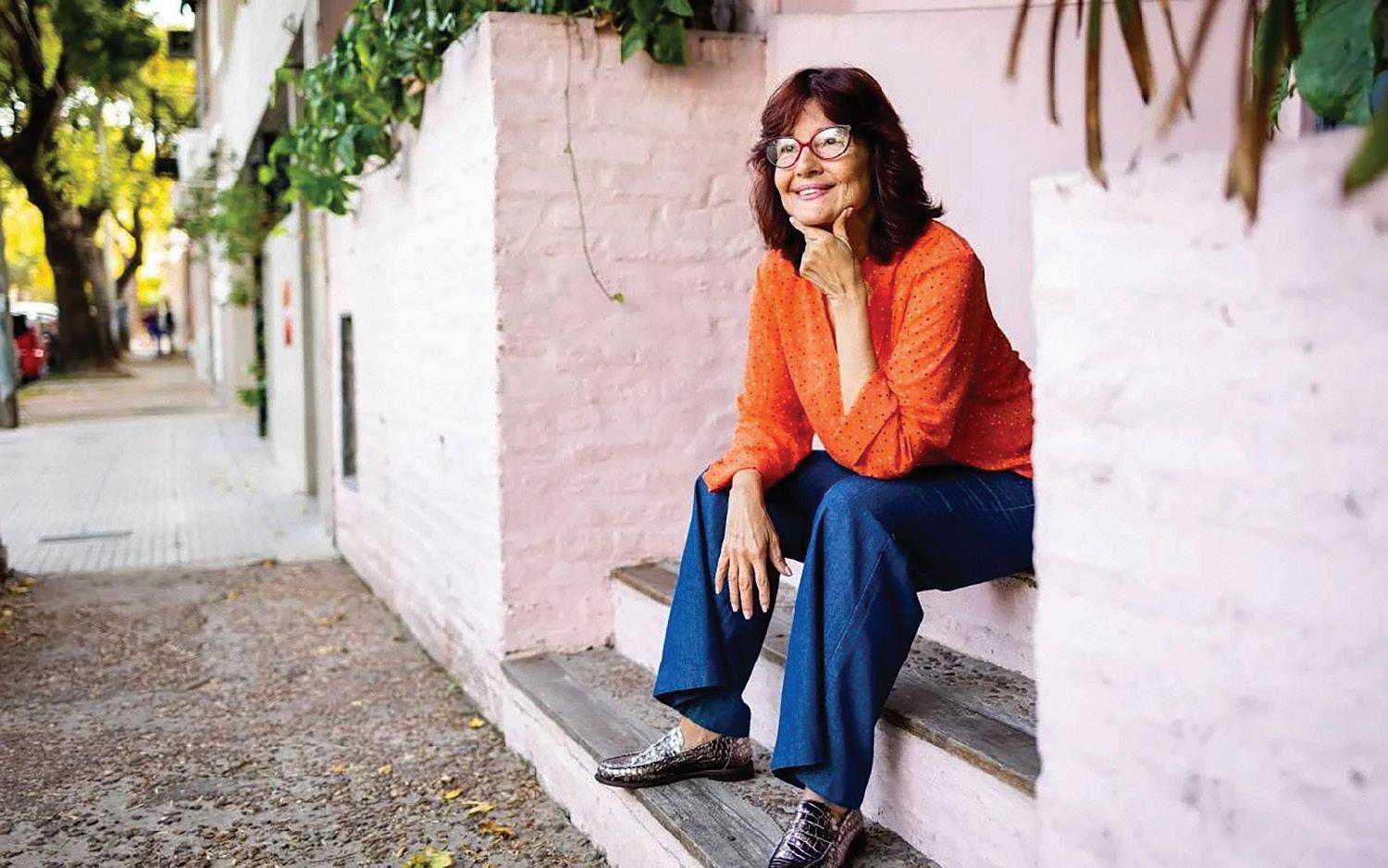
Those annoying relatives who kept asking if there is anyone special in our life have mostly zipped it. What's more, we no longer care what they think, if we ever did. | Credit: Getty
Sophia, 57, a science editor and writer from England, said, "I've been single for thirteen years, and I have never been happier. Ever. I'm having a great life, and I only wish I had started this journey with myself sooner."
There are more fellow solo singles in later life than there were when we were younger. As we age, fewer and fewer single people even want a partner. There's less pressure too. Those annoying relatives who kept asking if there is anyone special in our life have mostly zipped it. What's more, we no longer care what they think, if we ever did.
Throughout our adult lives we pursued the interests and passions that made
our lives so rich psychologically and so consistent with who we really are. With no romantic partner at the center of our lives, we did not need to bend or deny our wishes or plans to accommodate a partner. Because we were not marking time, waiting and hoping for such a partner to appear, we did not put off living our single lives as fully and completely as our opportunities and resources would allow. We continued to learn and grow.
A study of US adults at midlife compared, over a five-year period, more than 1,000 people who had always been single to more than 3,000 who were continuously married. It was the single people who were especially likely to agree with statements such as "I think it is important to have new experiences that challenge how you think about yourself and the world."
First, our numbers. Consider the results of a Pew Research Center report, based on a nationally representative sample of US adults in 2019, that focused specifically on solo singles — they were not married, not cohabiting, and they were not in a committed romantic relationship. Overall, 31% of Americans who were 18 and older were solo singles.
Age, though, mattered a lot. Among women in their thirties and forties, only 19% were solo singles, the lowest of any age group. But look what happens by the time they reach 65 and beyond — nearly half (49%) are solo singles. In later life, if you don't have a spouse or a serious romantic partner, you are no longer the outlier — you are practically the norm. (It is different for men. The percentage of solo singles decreases with age, from 51% for the youngest group, to 27% all through the thirties, forties, fifties and early sixties, and then down to 21% for those 65 and older.)
Second, our desires. Studies of more than 3,300 Dutch adults without romantic partners showed that all
across their adult lives, from ages 18 through 75, the desire to have a partner kept declining. Tap into just about any random study and you will find the same thing.
Take, for example, that 2019 Pew survey. Across all ages, half of all solo single people said they were not interested in a committed romantic relationship or even a date. The youngest adults (18 to 29) were the most interested: 63% wanted a committed relationship or at least a date. But for the solo singles 65 and older, only 22% were interested in any of that.
Jane Gross, who founded "The New Old Age" blog for the New York Times, has never married. Throughout her twenties and thirties, she said, "all I wanted was joined-at-the-hip, happilyever-after togetherness, with babies, even a mother-in-law."
By 65, though, she felt differently and considers herself single at heart: "I know that I'm greedy for the quiet of my own home at the end of a long day. And I'm grateful not to have to sit through movies I don't want to see, stay at parties longer than necessary, eat at 'proper' meal times, collect towels from the floor, or have someone follow me from room to room, expecting me to talk when I don't feel like talking."
Third, the pressures. The Pew researchers asked the solo single people how much pressure they felt from friends, family members and society to be in a committed romantic relationship. All three sources of pressure subsided with age. The oldest solo singles are the most blissfully free. More than half of those who are 65 and older say they feel no pressure at all from friends, family or society. And fourth, the satisfaction. Studies of adults who do not have a romantic partner show that once they get to
their forties and beyond, they just keep getting more and more satisfied with their single lives. One set of researchers discovered that when they studied German singles, and another set found the same thing when they studied Dutch singles.
People who stay single also become more confident about who they really are. In the midlife study that compared lifelong single people to continuously married people, it was the single people who were more likely to agree with statements such as, "I judge myself by what I think is important, not by the values of what others think is important" and "I have confidence in my opinions, even if they are different from the way most other people think."
As good as it can get for all solo singles, it gets even better for the single at heart. We've got this. We've been preparing for it for as long as we understood ourselves as single at heart and committed ourselves to the life we love the most.
Embracing the Single Life
Carla, who lives in Essex, England, was just 33 when she first shared her life story with me, but she was already planning for her later years. She told me, "When I renovated my house, I had quiet words with my builders and so now have a staircase which could easily be removed and replaced with a lift (elevator) and a bathroom which could be converted to a wet room with a sliding door. So hopefully I will be able to stay in this house, which I love, for most if not all of my life."
She also had a wise insight into the psychological dynamics of aging while single. "My actual experience of living single hasn't changed that much," she said. "It's always been good and I've always preferred living alone to living with other people. My perception of living single has changed hugely for the
better, based mostly on listening to how I actually feel about it rather than how I am supposed to view it. I can't see myself changing it, now. Aside from my grief over [my] Dad, in the rest of my life I am the happiest I've ever been."
Getting to live authentically may be one of the most profound rewards of embracing our single lives. Ginny, 59, from Ontario, Canada, said, "As time passes, I feel as though I'm becoming more myself. I'm expressing opinions I would never dared have expressed before, accepting feelings that were quashed before, setting limits to human interactions that drain me."
Peggy, 67, from Atlanta, said, "I am more secure and know more who I am every day."
Bella DePaulo (Ph.D., Harvard) has always been single and always will be. The Atlantic calls her “America’s foremost thinker and writer on the single experience.” She is the author of Single at Heart: The Power, Freedom, and Heart-Filling Joy of Single Life. Her TEDx Talk, “What no one ever told you about people who are single,” has been viewed more than 1.7 million times.
source: www.nextavenue.org
Editor’s note: Adapted from “SINGLE AT HEART: The Power, Freedom, and Heart-Filling Joy of Single Life” (Apollo Publishers) by Dr. Bella DePaulo

"Single" to 334.324.3472 then you'll be entered to win a copy of “Single at Heart”
By Mike Valles
Before you buy any large item, such as a car, you typically want to take it for a test drive first. It is also true when you buy a house. Hopefully, you are also considering taking a serious look at retirement before you retire—which is even much more expensive than a car or a house.
No matter how well you think you understand what you will need in retirement, taking a test drive will let you see if your expectations are realistic. Most likely, since you have never retired before, you cannot be sure until you take a realistic test. You will likely find afterward that you need to make some changes to your retirement plans. It could be especially useful for those who want to retire early.

Perhaps the biggest reason to take a test drive is to see if you can live on the finances you saved for retirement. After using a retirement calculator to understand how much income you think you will have in retirement, figure out how much you expect to spend each year—then divide it by 12 to see what your monthly budget will be.
much they will need for a comfortable retirement because they do not know how long they will live. In the United States, MacroTrends says that the average lifespan is 79.25 years. Men live a little less than this, and women live a little longer. Of course, some people live much longer than this. In your calculations, be prepared to live at least 15 years after age 65.
One thing that many people find almost unbearable after they have entered retirement is to discover that they have more time on their hands than they want. After a few trips (First Citizens says it is something that 60 percent of seniors want to do after retiring) and finishing some long-awaited projects, they no longer know what to do with themselves. It often leads many to take on a part-time job or volunteer somewhere. Of course, you cannot know what it is like until you find out for yourself.
In your calculations, expect about a 3.2 inflation rate each year. Your Social Security will automatically receive a cost-of-living adjustment (COLA) to match the inflation rate of the year before. Keep in mind that CBS says that Social Security may need to cut its benefits by about 20 percent if Congress does not act by 2034.
Some surveys have found that many people and others have no idea how
There are several ways to take a test drive to find out if you are ready to retire. You are apt to find one method more suitable to your availability and proximity to actual retirement. Or there may be two methods you want to try— one now and another as you get closer to retiring.
Find out how comfortable you will be during retirement with your projected income by living for a month on that income. Most financial advisors suggest that your retirement savings should permit you to live on 80–90 percent of your current income.
After living on that budget for a month, you discover that it is not enough, you need to find a way to increase your retirement savings. An alternative would be to push your anticipated retirement date back for a couple of years.
2. Stay at Home for at Least a Week
Instead of traveling anywhere, take a week or more off from work and spend time at home. Find out if you will get bored quickly and run out of interesting things to do. It will also enable you to discover if you like being alone (or with your spouse) watching TV, engaging in a new hobby, etc., all day for weeks, months, and years at a time. AARP mentions that spending more time with your spouse can prove to be a challenge because of increased strain—if you are not used to it.
3. Check Out Your New Desired Location
If you plan on moving to a new location to retire, find some way to live there for a couple of weeks before you retire. Whether it is across the city or in a different country, it will let you discover if it is as comfortable and inexpensive as you hoped it would be. Do not make the mistake of waiting until you move to find out—you may be very disappointed.
Before you retire, eliminate as much of your debt as possible. Pay off your mortgage, credit cards, car loans, and other debt—especially those with high interest rates. It will enable you to reduce your financial needs in retirement and let you have more money each month.
Downsizing is also an option to enable you to live on less. You can get a smaller house where you live or move to a cheaper state. It may be cheaper to live elsewhere, or you may want to live closer to family and relatives. Some states have less taxes and will not tax retirement income.
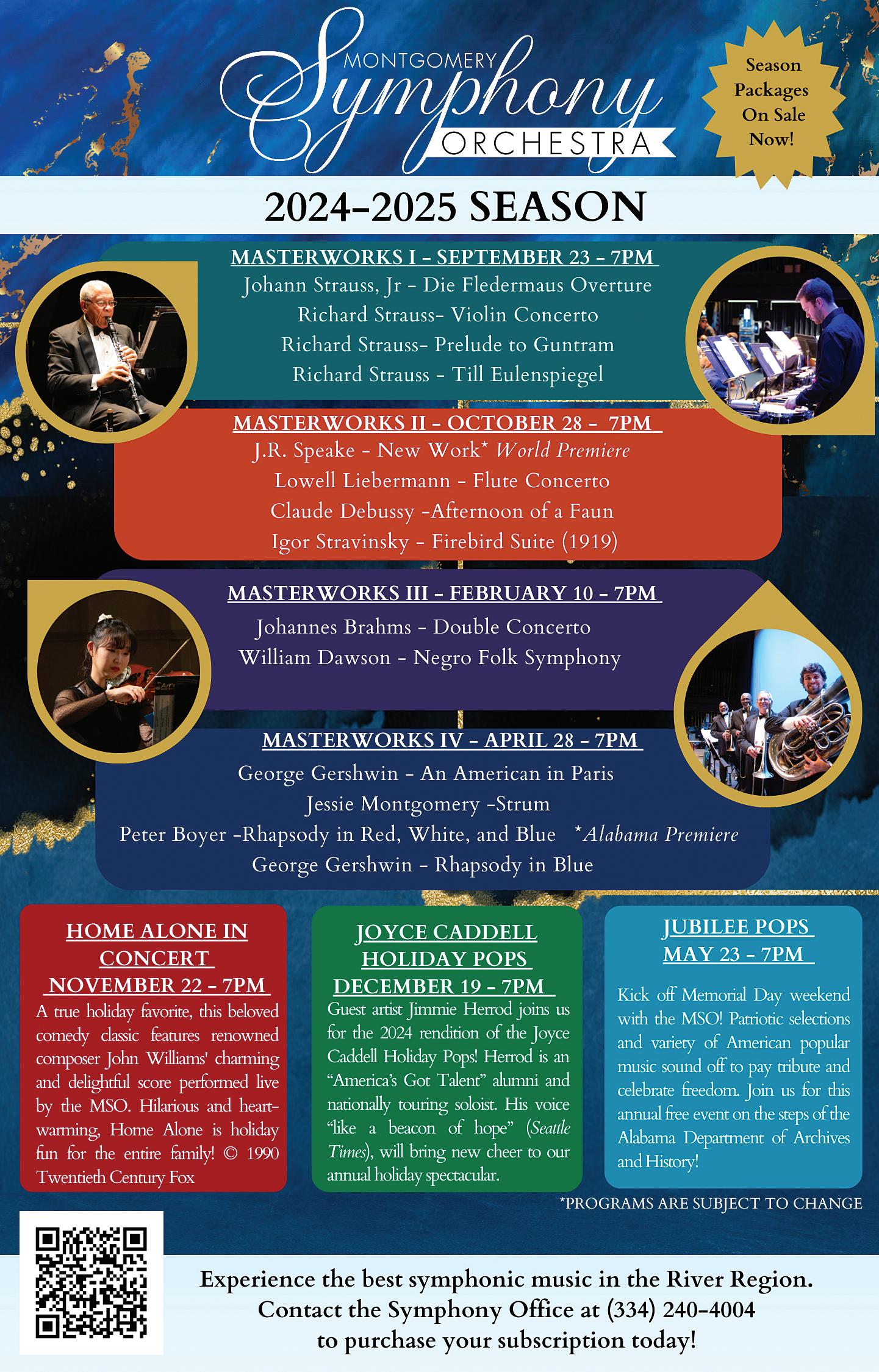
You may also want to put some of your retirement money into a Roth account—a Roth IRA or a Roth 401(k). Money rolled over into these accounts is after tax, so you must pay taxes on any money put into those accounts. The advantage of doing this is that it will help reduce your taxes later when you must take the required minimum
distributions (RMDs).
Taking a test drive can save you time and money if you discover you need to delay your retirement. Many seniors are putting off retiring for a couple of years after turning 65. More people than ever are thinking they will not retire at all.
Source www.theepochtimes.com
The Alabama Herb Society began meeting at the Crump Senior Center in 2018 and immediately began an intensive long range gardening program in the existing, but essentially abandoned, garden. The first priority was to bring back to productive life the 14 seriously neglected and weedy raised beds. After this modest beginning, many other projects were undertaken by a succession of volunteers, and today major new initiatives are either underway or on the drawing board.
In 2020, Parker Strength, as his Eagle Scout project, removed several invasive Chinese Tallow (popcorn) trees at the back of the Crump property and prepared it for replanting with native trees, shrubs, and flowers. Since then, Herb Society members, volunteers from Maxwell/Gunter, and members of the community, have nurtured the grounds to the delight of various flying and walking creatures in what was once an acre of barren Bermuda grass and invasive trees.
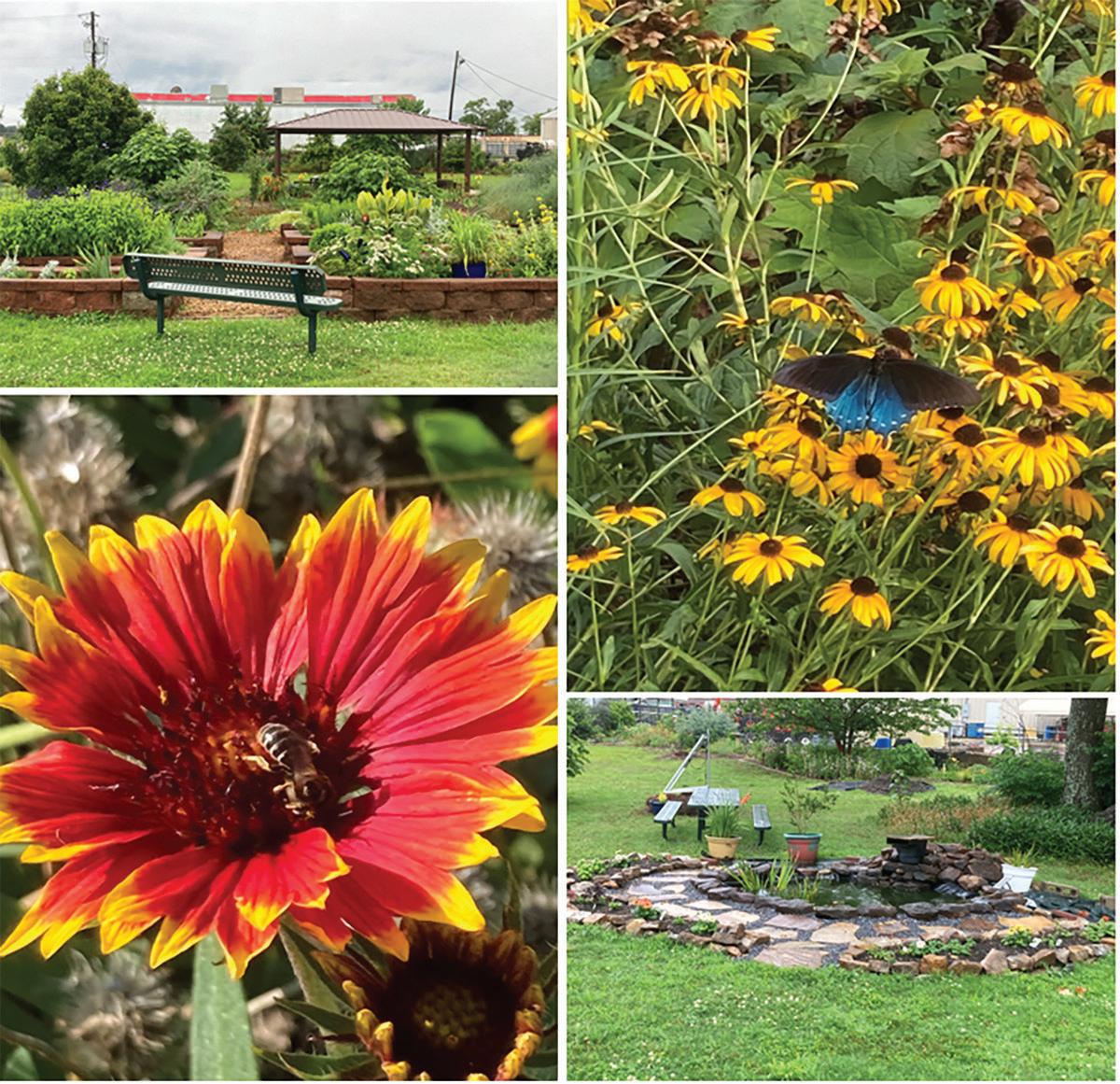
candidate, John Carson Bullard, created a raised bed encircling the small fish pond, and AmeriCorps volunteers planted it with flowers and herbs.
The center of the garden now boasts a 28 foot pavilion that was built in 2022 with generous help from the City of Montgomery and a grant from Burpee Seeds. This shaded space with concrete floor is ideal for meetings, picnics, or other social gatherings.
This spring, another Eagle Scout
A big boost to the garden will come soon, as the Herb Society has been awarded a grant to build a rain garden, a walkway with porous pavers, a green roof over a proposed garden shed, and rainwater harvesting devices at the Crump Community Center. (This project has been funded wholly or in party by the United States Environmental Protection Agency under the assistance agreement BG96464623 to the Alabama Department of Environmental Management. The contents of this document do not necessarily reflect the views and policies of the Environmental Protection Agency, nor does the EPA endorse trade names or recommend the use of commercial
products mentioned in this document.)
The Crump Community Center is located in the Gailbraith Mill Creek watershed. Three Mile Branch, part of the watershed, is on Alabama’s 303(d) list, which is a state’s list of impaired or threatened waters. The rain garden/bioretention area will be a very large depressed area in the landscape to collect rain water from the surrounding roofs, parking lots, and roads. This will allow the flow of water carrying nonpoint sources of pollution such as pesticides, pathogens, sediment, and other pollutants to soak into the ground, diverting those pollutants from going into the nearby impaired stream, Three Mile Branch. Students from the Biosystems Engineering Department at Auburn University graciously designed the rain garden and porous walkway, and the Herb Society hopes to begin construction on that in the coming weeks with the help of other partners/ volunteers.

Each year that passes, the efforts of the Herb Society and other volunteers are enhancing the beauty and environmental value of the Crump Center garden for the benefit of not just Crump Center members but all the citizens of the surrounding area.
As the temperature continues to rise this summer, the members of AUM OLLI staff are completing the schedule and activities for the 2024 Fall Term. There will be new options as well as a number of popular returning choices.
The first field trip is before the term begins, on Wednesday, August 7, 2024: attendance at the Alabama OLLI Day, hosted by AU OLLI at the Gogue Performing Arts Center in Auburn. The program features keynote speakers, siblings Margaret and Bill Renkl, talking about their book collaboration The Comfort of Crows (she wrote the text, and he painted the illustrations). Their talk will be followed by a reception, the book sales, and signings. Since the program and reception are free, the only expense for AUM OLLI members is the transportation fee ($10.00). (For more details, see the AUM OLLI article in the June issue of BOOM). Members must register, and registration is open until noon on July 15, 2024.
There are additional field trips in the fall schedule: preview night for Noises Off at the Cloverdale Playhouse, a trip to the Hyundai Motor Manufacturing, a wine and food tasting at Peppertree Steaks N’ Wines, a tour and lunch at Montgomery Whitewater, and a reception at the Montgomery Museum of Fine Arts. Some of these trips are free, and others have a fee to be paid at registration.
The staff has decided to experiment with one- and two-day workshops in the craft/ do-it-yourself category. The AUM OLLI fall schedule features one-day workshops in oil painting, dot painting, and pillow making. There is a two-day pottery workshop. The workshops have varying fees in addition to the annual membership and term fees.
Open House for the 2024 Fall Term is scheduled for Thursday, August 29, 2024, from 10:00 a.m. – noon. The first lunch presentation is scheduled for Monday, August 26, 2024, three days before the
Open House for obvious reasons: How to Enroll and Pay Online for OLLI. The subjects of additional lunch presentations during the term are quite varied: Chancellor Carl Stockton, a notorious Alabama banned book, safety tips for senior adults, Alabama raptors, and war and diplomacy with Iran.
A detailed coverage of the course offerings for the 2024 Fall Term will appear in the August issue of BOOM! The AUM OLLI catalog, which will be available online in the coming weeks at www.aum.edu/olli, will include details on all the opportunities covered in this article as well as the course schedule.

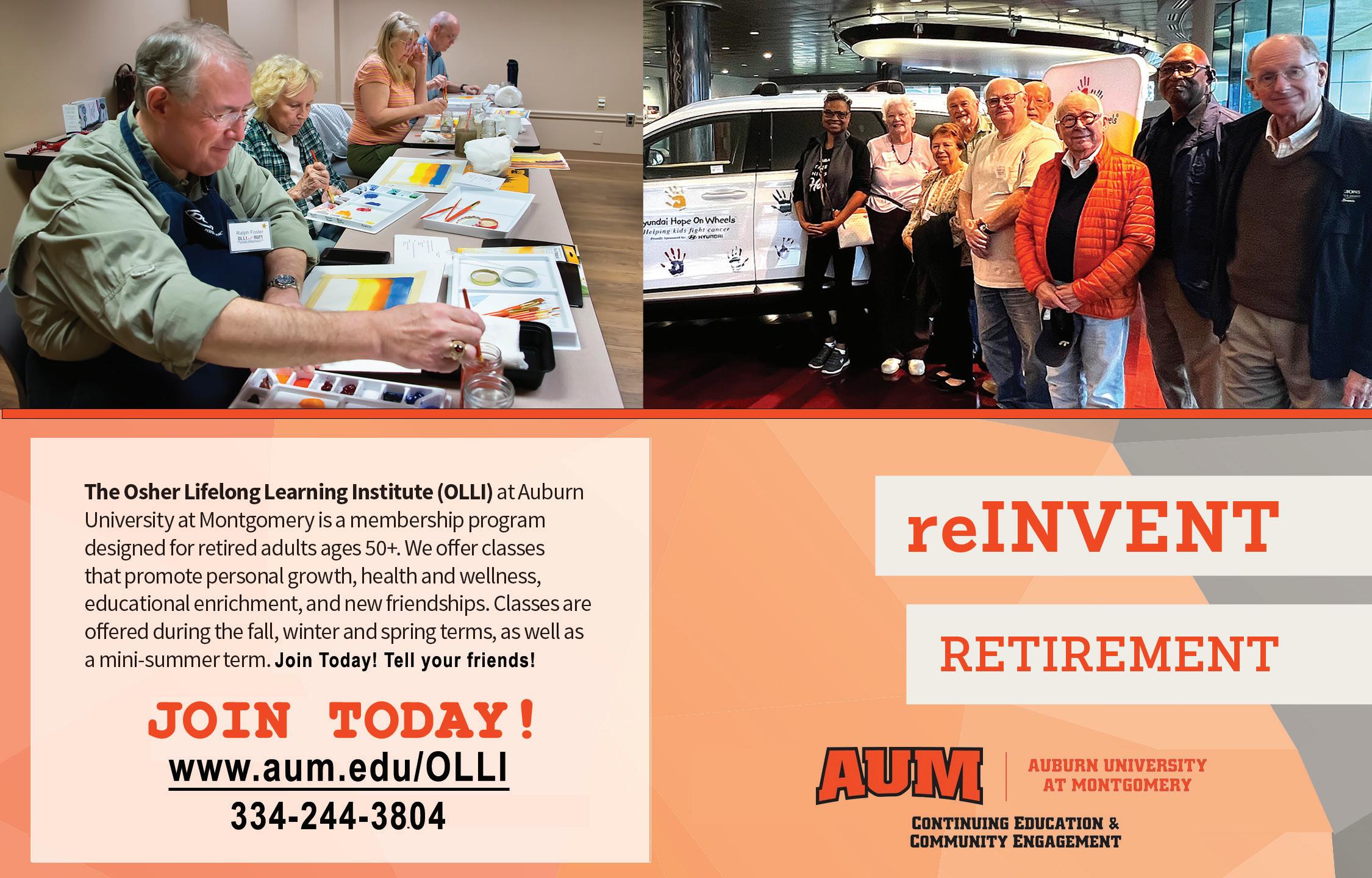
Photography provided by Jeff Barganier
Sometimes, when I set out in search of a particular story, another story first finds me.
Back in May, I met Donna Self while watching energized solar particles slam into Earth’s upper atmosphere at 45 million miles per hour, aka, the aurora borealis or northern lights. In the midst of all the frenzied photography taking place around us, Donna began to share with me the considerable attractions of her hometown of Oneonta. She told me about Palisades Park and historic sites like Horton Mill Covered Bridge. And, right there, beneath the storied glow of frenetic atoms, I decided to go see these Blount County treasures for myself.
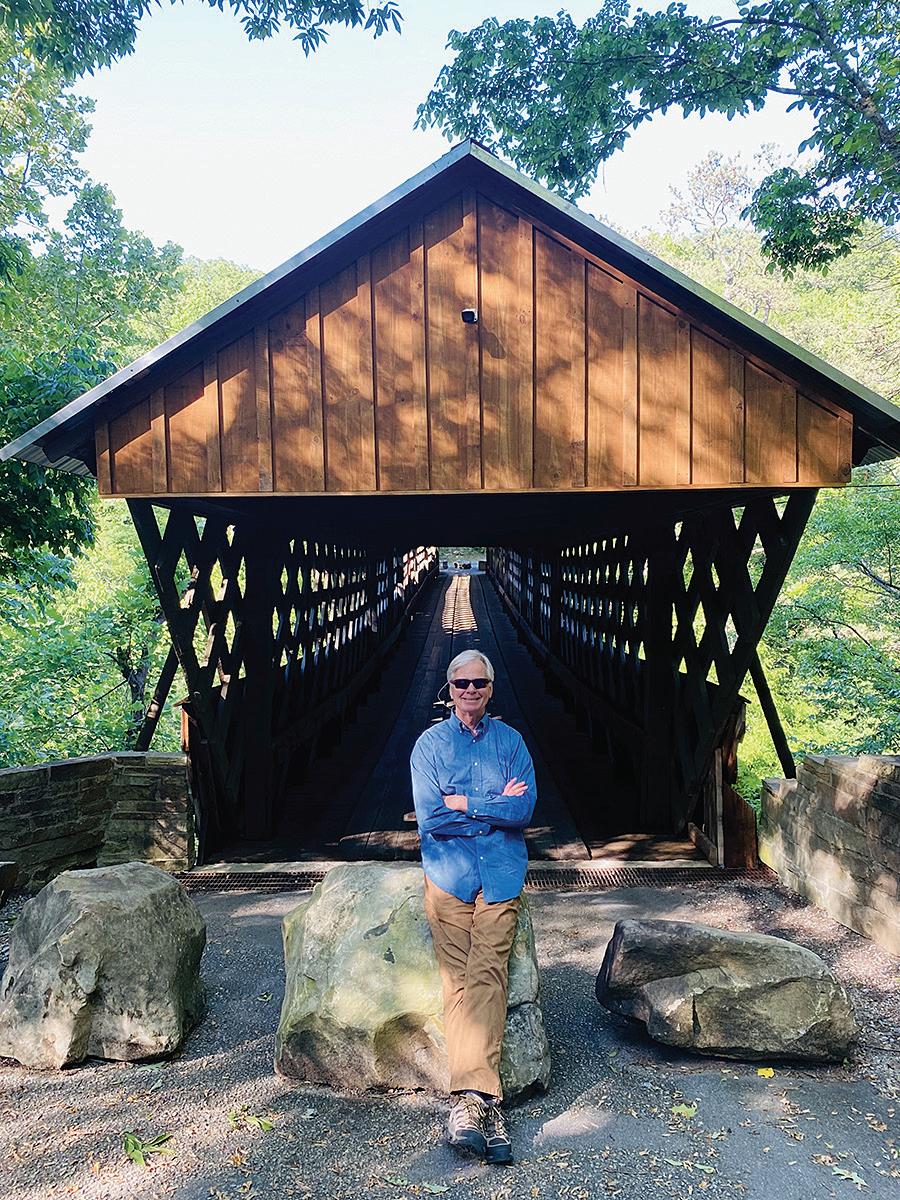
We almost missed the town. GPS was sending us left at the first light, onto Highway 9, toward Oneonta. But heavy traffic at the intersection of 9 and 11 kept us idling for several minutes, leaving us to gaze up the road at what appeared to be a commercial district. “Looks like a town ahead of us,” I told Cindy. “Want to check it out?”
a Main Street that looks much like it did 100 years ago. Storefronts are close to the narrow street and adorned with pressed metal, iron ornamentation and vintage signs.
The next day was a gorgeous sunny Saturday. Cindy and I drove northeast past Birmingham and Trussville. But thirty minutes beyond the Magic City, well short of our Oneonta destination, we found ourselves wanting to meander for a spell in the picturesque village of Springville.

As we stepped from the car, time slowed to a crawl. Sights and sounds charmed us. And friendly folks greeted us like long lost friends. The chiming of church bells reminded me of scenic Blairsville in North Georgia. But, unlike Blairsville’s court-housesquare, Springville’s magnetic force is the serendipity one discovers in a stretch of Highway 11 that tracks straight through town. Springville’s half-mile historic district includes numerous historic homes and features
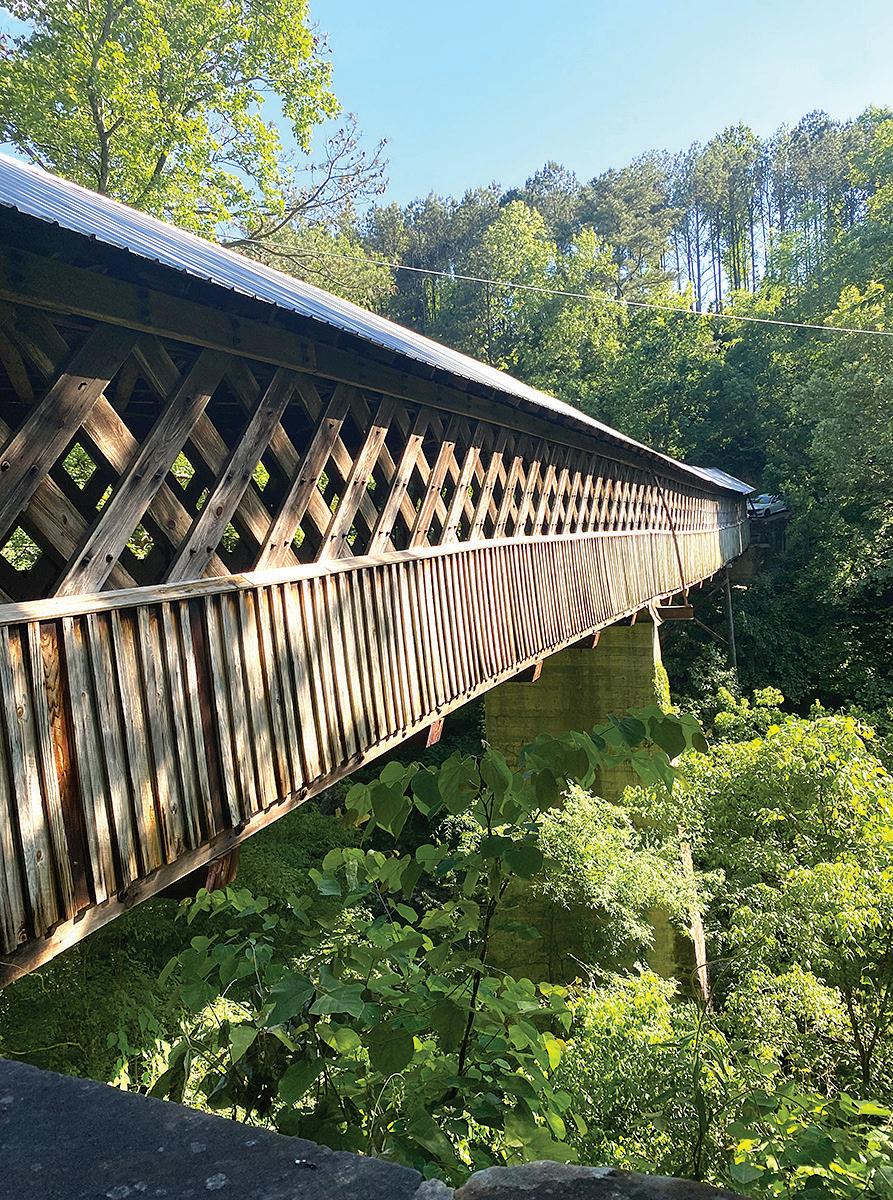
As Cindy strolled away toward a dress shop, I crossed the street to Lasters Sundries to find a young family from Oneonta enjoying ice cream. The pretty young ladies behind the ice cream bar were patient with me as I vacillated over the many flavors. “So, what’s Springville famous for,” I asked. I didn’t have my recorder with me; and, unfortunately, I don’t remember the answer. But I do remember one of the girls proudly proclaiming that her ancestors came through Ellis Island from Sicily. I sensed her pride of history and belonging was indigenous to Springville.
You see it in the neat streets, in the way people carry themselves; and how they never meet a stranger. Citizen esprit de corps is crystal clear, like the waters from local natural springs that attracted early 1800’s settlers—not unlike how the cool waters of Cave Spring, Georgia also attracted newcomers. (See: BOOM! January
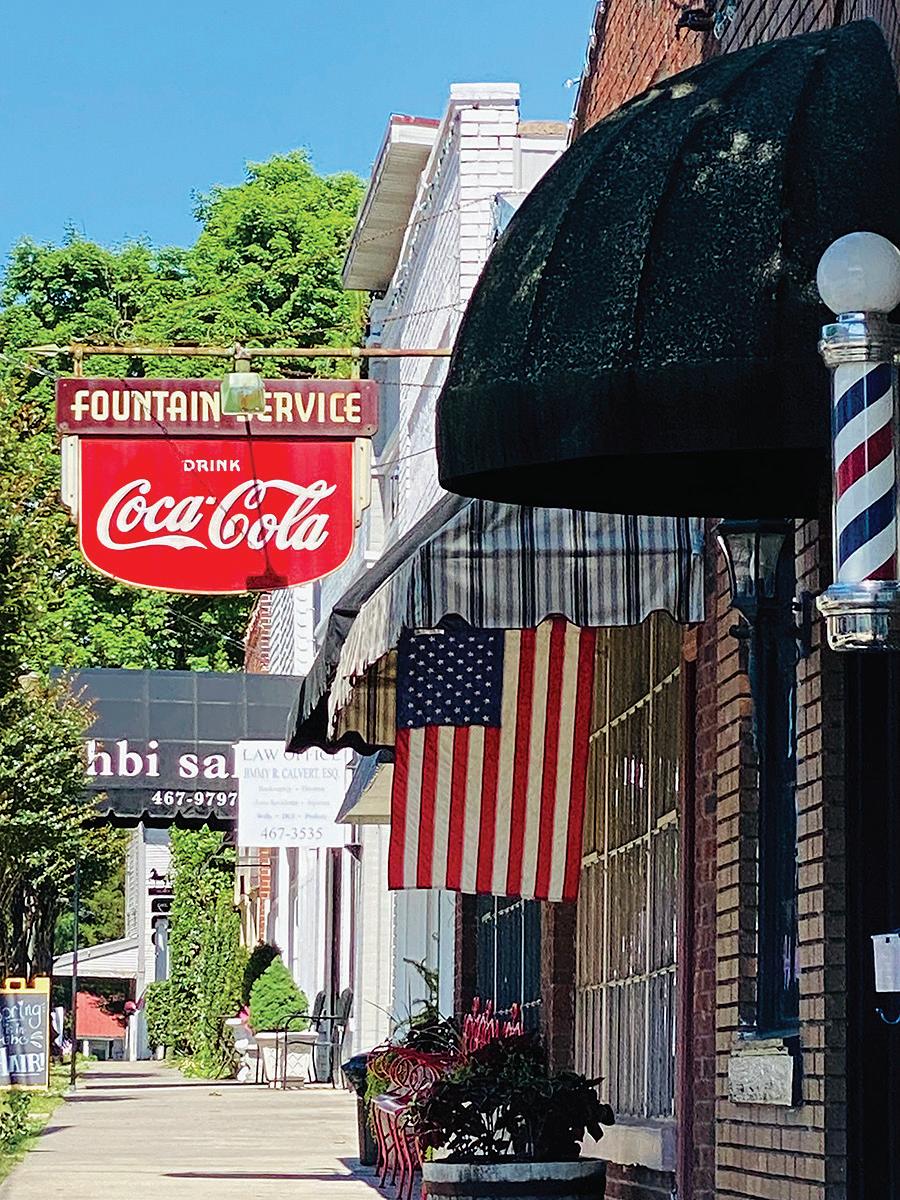
We toured some neighborhoods in case we decided to stay forever. A young man in a pickup pulling a trailer full of lawn equipment flagged us down. We lowered our respective windows. He grinned over at us. “Did y’all notice that church lawn back there? I cut that.” Yep. Community pride on display again.
“We’re from the Montgomery area. What should we do while in Springville?” I asked.
“You ought to visit Big Canoe Creek Preserve. It has a pretty creek and walking trails. There’s also a festival going on now out at Homestead Hollow,” he replied. I learned later that the Preserve features 422 acres of pristine meandering creek through lush forest, one-of-a-kind species, wildlife, stunning flora, hiking and biking trails.
But, as Cindy’s not a hiking/biking kind of girl, we drove to the festival at Homestead Hollow on Highway 9, parked in a vast grassy field, and strolled toward the entrance. A couple walking

toward us held out two tickets worth $10 each. “We have extra tickets. Here. Have a blessed day.” Indeed, Springville was the special story that found me, a town of unfeigned hospitality amidst natural beauty of hills and springs. We’ll be going back soon to experience more of it.
Meanwhile, we eventually made it to Oneonta. Named after Oneonta, New York, the Blount County town of about 7,000 began
as a mining village. The origin and development of Oneonta followed the advent of the Birmingham Mineral Railroad, a part of the Louisville & Nashville line. There are many historic sites in Oneonta, including the L&N Railroad Depot, Garner Hotel Building and the historic TinTown area. But, this trip, we were looking for Palisades Park and the Horton Mill Covered Bridge. At Palisades Park we discovered historic structures, amazing views, and exotic rock formations that rival those at Dismals Canyon near Phil Campbell, Alabama.
Horton Mill Covered Bridge is on the Covered Bridge Trail for which Blount County is famous. It’s an architectural marvel and photographer’s dream come true. The same may be said of Palisades Park. Both Palisades and Horton Mill Bridge exude history in tranquil settings that speak to young and old alike. But, if you take the grands, be sure they’re on a leash, especially at Palisades Park where the cliffs are spectacular but dangerous—nature’s idea of an “attractive nuisance.” One must exercise extreme care when approaching the edge.

In closing, a cautionary note for these reckless days in which we live: I-75 through Tarrant to or from Birmingham is dangerous. People drive like demoniacs. We were almost hit from behind. Twice. By the same driver. And we narrowly escaped a collision with another reckless speed-demon. Avoid I-75 through Tarrant. Many blessings.
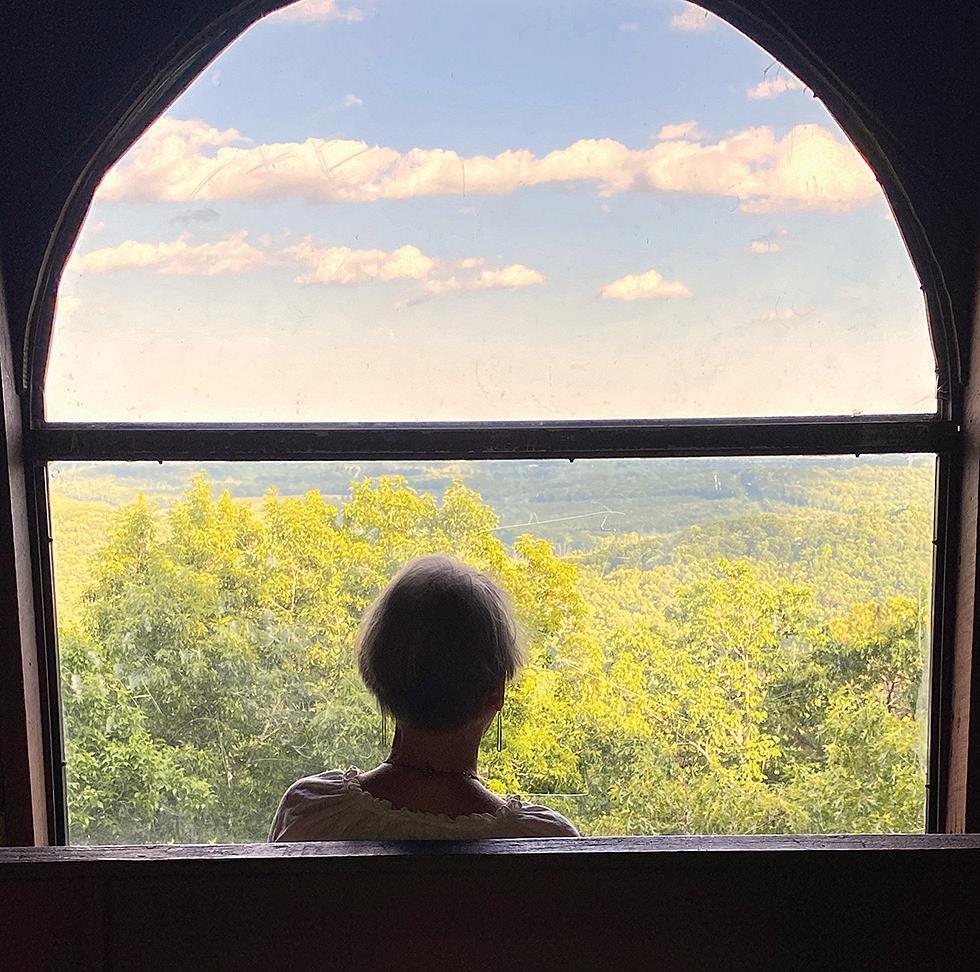
To learn More: www.historic-structures.com/al/ oneonta/horton-mill-covered-bridge/ www.homesteadhollow.com www.exploringalabama.org/places/ palisades-park www.bigcanoecreekpreserve.org
(See: BOOM! February 2019)
Jeff Barganier is a novelist, travel writer and speaker. He travels far and wide upon the slightest excuse for something interesting to write about. His novels include Lawson’s Bluff (2021); The Slash Brokers (1998). He also manages Cindy Barganier Interiors LLC (www.cindybarganier.com) at The Waters in Pike Road, Alabama. Contact Jeff at Jeffbarganier@ knology.net . You may print out his features at www.jeffbarganier.com and take them with you when you travel!
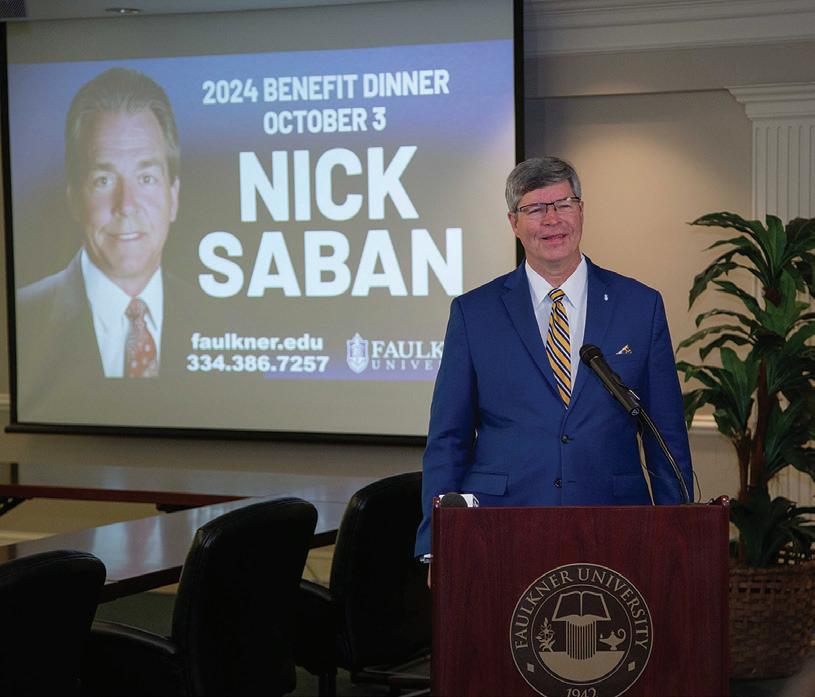
“Our theme this year as a university is relevance. This university is relevant as we aim to impact education, health care, justice and prosperity in this region,” said Faulkner University President Mitch Henry. “We are committed to bringing awareness to what needs to change, what needs to be improved and how we can directly impact this world in a meaningful way as a Christian university. Our theme at this year’s dinner fits well with this purpose as we aim to celebrate the heroes of adoption and foster care who are meeting a critical need in the state of Alabama.”
“This year’s keynote speaker, along with his wife Terry, founded an organization that has gone above and beyond to care for and support organizations that not only support adopted children and foster care children, but any child who is in critical need. They have supported education organizations as well as those who provide direct services to the most vulnerable children in this state and other states. The name of that charity is Nick’s Kids and our speaker is none other than Nick Saban.” A man of vision who has a proven record of championship success, former head coach of the Crimson Tide for nearly two decades, Nick Saban is all about excellence, about purpose, about process and about giving back to his community. He returned the University of Alabama to the top of the college football landscape with his commitment to building the total program both on and off the field. Saban's uncompromising dedication to excellence in every phase of the program has resulted in winning six national championship titles with Alabama and one at LSU, surpassing Paul "Bear" Bryant for the most national titles in college football. You can see Nick Saban speak on October 3 at the Renaissance Convention Center in downtown Montgomery. It will be a special event with all proceeds going toward student scholarships. Tickets are on sale now by calling 334-386-7257 or by visiting www.Faulkner. edu/saban.
The Auburn Downtown Merchants Association is pleased to announce that the 8th annual Cheers on the Corner event will take place on July 26, 2024, 6-9 pm in downtown Auburn. This event has been a sell-out in previous years, so buy your tickets early. Attendees will receive a souvenir wine glass and get to enjoy the tastes of downtown at over 20 stops. Each stop will provide you with a savory bite paired with a refreshing beverage sample. Entertainment District Event. Live music. Must be 21 years or older to purchase a ticket. Tickets are $45 in advance and $50 the day of. Tickets go on sale on July 8th. NEW this year will be a Best Small Bite and Best Sips contest! You get to vote for your favorite! Entertainment District Event. Live music. Must be 21 years or older to purchase a ticket. Tickets are $45 in advance and $50 the day of. Tickets go on sale on July 8th. For more info visit https://downtownauburnonline.com/



Prattville's Way off Broadway Theatre presents a summer production of Williams Shakespeare's comedy Twelfth Night, Thursday July 11, 2024 - Sunday July 28, 2024. It's the 1930s, when shipwrecked and separated from her twin brother, a young Northerner named Viola finds herself stranded on the shores of the Mississippi Gulf Coast, near a town called Illyria. In a panic, she disguises herself as a young man, and calling herself Cesario, enters the service of local lord Orsino, who has fallen hard for a lady named Olivia, who is in mourning, and will not hear his advances. Cesario is sent to woo Olivia for Orsino, even as Viola falls for Orsino, and Olivia starts to fall for Cesario. Meanwhile, a power struggle is happening in Olivia’s house between her uncle and her steward. Eventually, the two plots overlap, creating a high Holy mess that turns the town on its head. One of Shakespeare's funniest comedies, this adaptation will have ya' hootin' and hollerin' from one end of the muddy Mississippi River to the " t'other"! to order tickets visit https://prattvilleal.gov/departments/cultural-arts/ticket-information/
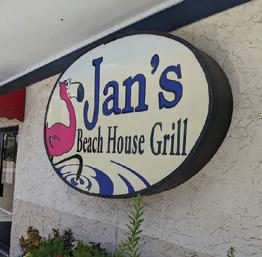
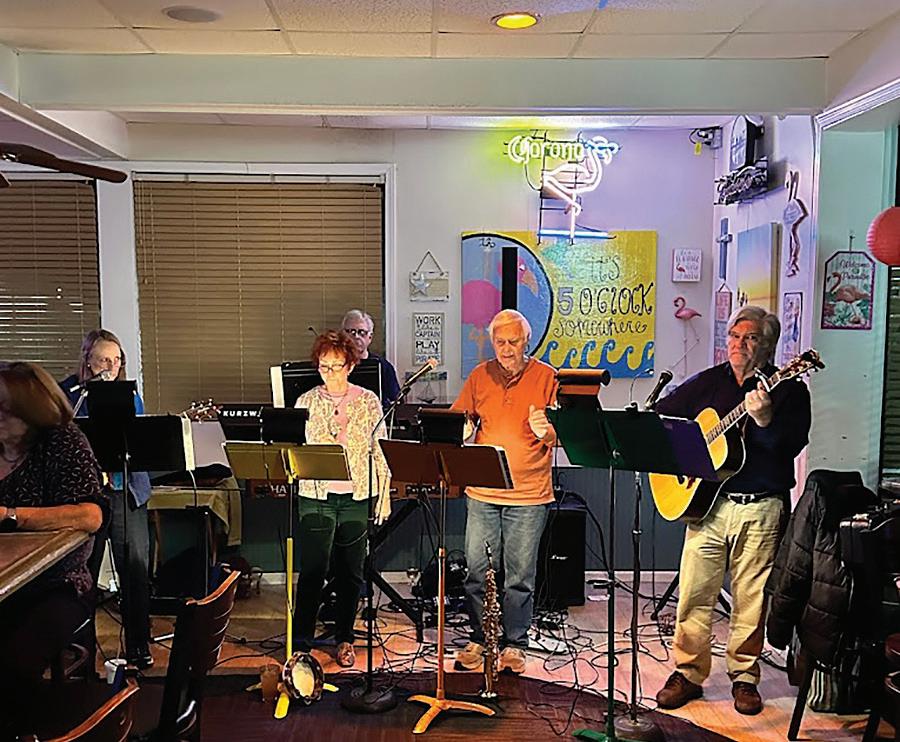
The David Brewer Singers will present an evening of Gospel Music at Jan's Beach House located at 850 Eastern Blvd in Montgomery. There will be great food and drinks and great Gospel Music from 6:30 to 8:30 pm. Call your friends and plan for an evening of fun and fellowship!
Tuesday, July 16/23

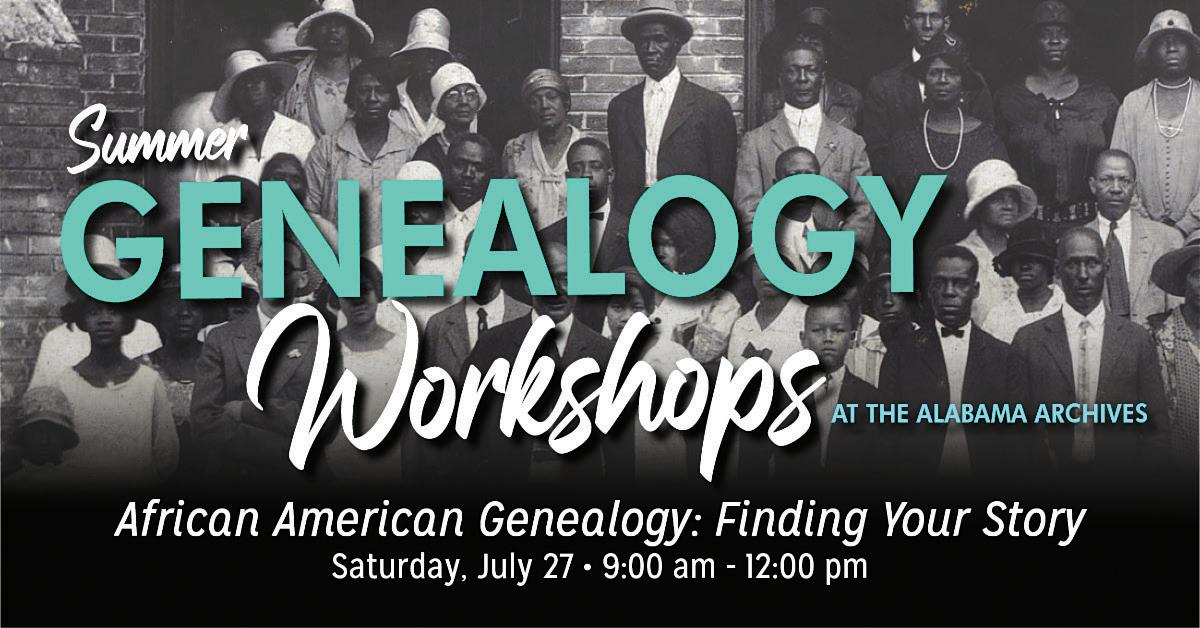
This workshop will equip participants to effectively navigate potential research roadblocks and address challenges specific to African American genealogical research. Following the workshop, participants will have the opportunity to ask questions and share personal experiences in an open discussion with instructors and other researchers. This workshop is suited for all levels of research experience. Registration closes at 12:00pm CT, Friday, July 26. Location: Alabama Department of Archives & History, 624 Washington Avenue, Montgomery, AL 36130. Date and time: Sat, Jul 27, 2024 9:00 AM - 12:00 PM. TICKETS-General Public, Price: $30.00, Friends of the Archives Members, Price: $20.00, Student, Price: $20.00. Register here: https://lp.constantcontactpages.com/ev/reg/j3nemab
Celebrate America's 247th Birthday!
Meet George and Martha Washington, Thomas Jefferson, Patrick Henry, Phillis Wheatley, Samuel Adams, Dolley Madison, Thomas Paine, Dr. Benjamin Franklin, Alexander and Eliza Hamilton, and more! Experience the Battle at Concord Bridge, and join the Independence Day Ball. There will be music throughout the day, and all your favorite food vendors will be on-site. The Children's Area is open from 11:30am to 6:00pm with games galore! American Artisans will return this year, offering woodcrafts, honey, brooms, baskets, pottery, jewelry, soaps, and more. And back by popular demand will be the Tickled Pink Petting Zoo, with farm animals to pet and feed. Uncle Sam will be handing out American flags as well. Gates open at 11am. Activities begin at 11:30 am and continue through twilight's last gleaming, when the incredible FIREWORKS close out the day! Admission is just $5 per person, and children ages 4 and under, veterans and active military are FREE. *No entry after 8pm. For a complete Schedule of Events, visit us online at www.americanvillage. org/Independence-Day


BOOM! starts conversations and shares stories. Share your business with BOOM! readers. For more information call/text 334.324.3472 or visit www.riverregionboom.com
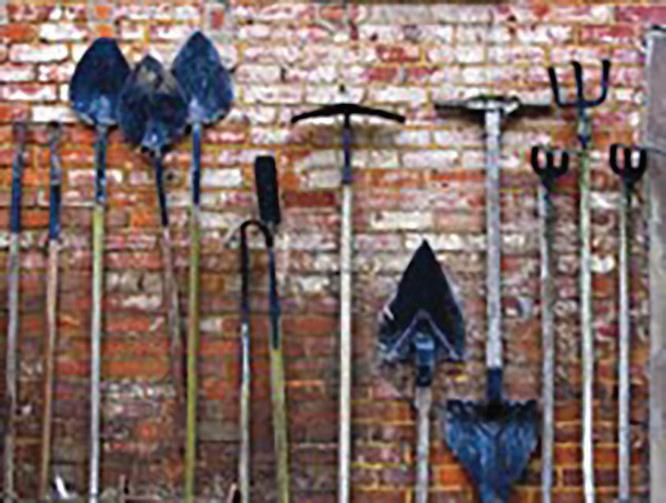
Capital City Master Gardener Association presents Lunch & Learn, the 1st Wednesday of Every Month from 12-1 pm. They will meet at Montgomery Cultural Arts Center (Armory Learning Arts Building), 1018 Madison Ave., Montgomery 36104. Mark your calendars, July 3, 2024 “Garden Tools – Use and Maintenance” Mike Forster, Master Gardener, will present “Garden Tools – Use and Maintenance”. Mike will bring a variety of garden tools and share uses and care. He will explain how to identify the many shovels and pruners already in your garage. Should you use a lopper or a hedge trimmer in the yard? Mike will know the answers. Don’t miss this very practical session!! August 7, 2024 “Growing and Using Popular Herbs”. Debbie Boutelier, Advanced Master Gardener, will present “Growing and Using Popular Herbs”. Are you already growing a variety of herbs at home? Do you cook with them? Have you ever tried drying herbs? Can you identify lemongrass or citronella? Join us and discover lots of new things that Debbie will share about herbs! BRING A SACK LUNCH, FREE PROGRAM, WATER PROVIDED, For information, please contact the Montgomery County Extension Office 334.270.4133. Also visit www.capcitymga.org.
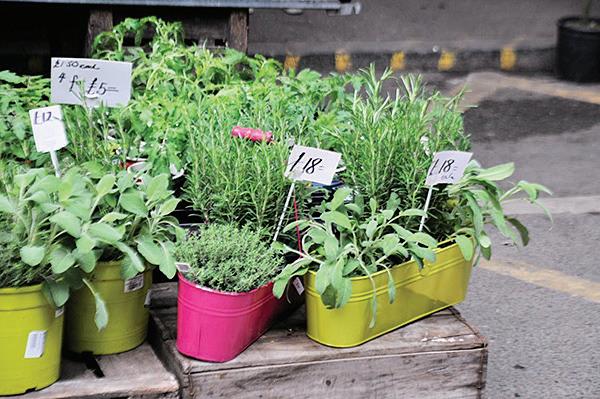
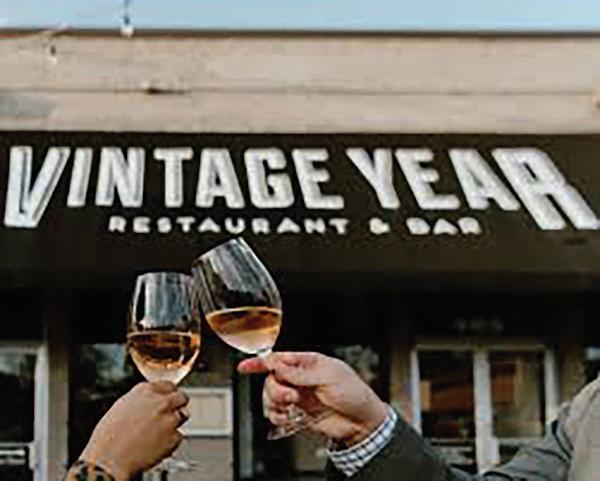
Vintage Year and Ravello Ristorante have once again been honored for outstanding wine programs in Wine Spectator Magazine's 2024 Restaurant Awards. The Award of Excellence recognizes restaurants with wine lists that feature a well-chosen assortment of quality producers along with a thematic match to the menu in both price and style. "It's quite an honor to be recognized again on such prestigious lists," said proprietor Jud Blount. "We have assembled an outstanding staff who are focused on bringing the best experience to our customers." “Restaurants that make wine a priority are what the Wine Spectator Restaurant Awards program is all about,” said Marvin R. Shanken, editor and publisher of Wine Spectator. The leading authority on wine, Wine Spectator examines the world of wine from the vineyard to the table, exploring wine’s role in contemporary culture and delivering expert reviews of more than 15,000 wines each year. Vintage Hospitality Group operates the fine-dining flagship restaurant, Vintage Year, Vintage Café, a coffee shop, daytime eatery and retail store as well as Frenchie’s, a French bistro, all in Montgomery’s historic Old Cloverdale neighborhood. Ravello Ristorante is its hot Italian establishment, along with several private event spaces located downtown. The company also owns the hydroponic farm MGM Greens and Red Bluff Bar, a venue that offers live music, beer, wine and small bites along the scenic Alabama riverfront. Vintage Hospitality Group’s national press accolades include receiving coverage in the New York Times, U.S. News & World Report, Garden & Gun, PBS NewsHour, USA Today, Forbes and Newsweek Magazines.


Plan to grab the little ones and attend an event they will love! Elmo, Abby Cadabby, Cookie Monster, and their friends from Sesame Street are coming to your neighborhood to say hello! At Sesame Street Live! Say Hello, sing, dance, and play alongside your favorite furry friends, all while you follow Elmo’s puppy, Tango, in a fun game of hide & seek. So put on your dancing shoes and make your way to where the air is sweet for this all-new celebration on Sesame Street! Wednesday , November 6, 6pm. www.mpaconline.org
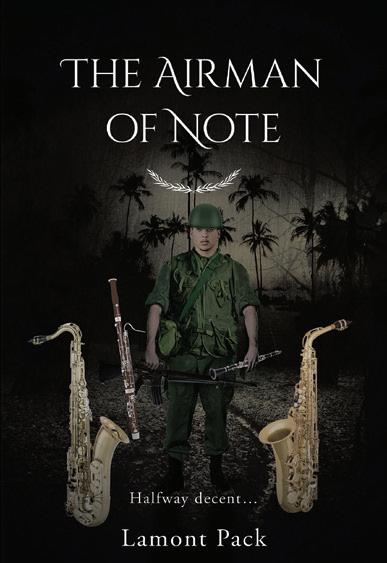
Book Summary: The Airman of Note's intent is to provide what can be done and what did happen in life. Since we are consumed by life forces and respond based on ethnic characteristics and cultural bias, they can broaden experiences and horizons. For what we do with experiences do more to define us as people and allow us to travel where we have never fathomed. Therefore, this book of poems is designed to do just that. Like a parachute, your mind must be open before you are able to appreciate the beauty and other splendors of life functions in this environment that affect our total existence. Provided are snippets of life experiences mixed with humorous gestures of other forces dealt with daily by all of us--if we are blessed to live that long. These voices are not in a vacuum or shouting in the wilderness but are here and now--the voices you don't usually hear. In their daily struggles to exist toward a reward of decent lives, most folks come up short, yet there are those who reach the "halfway decent" mark and begin to see the light at the end of the tunnel and become energized. Finally, the "halfway decent" views that the "American Dream" may soon be within reach, they work harder but never give up. As the Good Book says, "But they that wait upon the Lord shall renew their strength; they shall mount up with wings of eagles; they shall run, and not be weary; and they shall walk and not faint" (Isaiah 40:31 KJV). So I encourage you to join me and see how the other half of Americans live with struggles in their daily lives. With this thought in mind, may peace be with you and God continue to bless you!
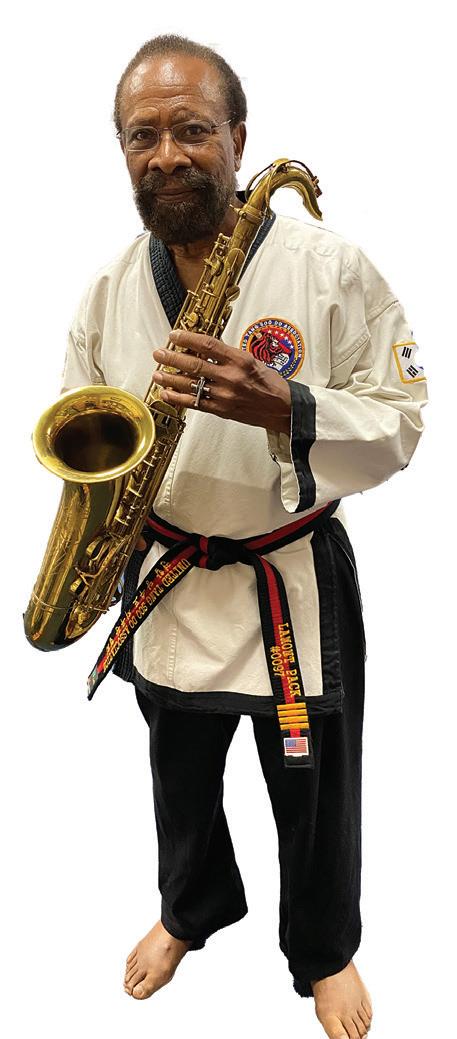
The author, Lamont Pack, was originally from the countryside of Savannah, GA. He attended school there before moving to New York City and becoming a Brooklynite. After high school, he joined the Air Force to avoid the military draft and was sent to Vietnam. He served his country honorably in Southeast Asia, serving tours in Thailand and Vietnam. During his tenure in the Air Force, Lamont Pack's roles were as diverse as his experiences. He started in personnel administration, then moved to surgical services, and eventually became a physician associate in family practice, primary care, and emergency services at Air Force hospitals and clinics. His four-year military tour extended to an impressive 26 1/2 years, after which he transitioned to civilian healthcare agencies. He started at Baptist Healthcare Systems, Montgomery, Alabama, as director of central sterile services and then at Erlanger Healthcare Systems in the same position in Chattanooga, Tennessee. Next, he moved to Alabama for state-level employment. At the state level, he worked in the food stamp office. Next, he continued from there to a public health agency, where he worked as the administrator in the tobacco prevention and control program. He followed this position to the diabetes prevention and control program as the director for the state of Alabama. Outside of his professional life, Lamont Pack found solace and joy in his personal pursuits. He expressed his creativity through music, playing the clarinet and saxophones. To maintain his physical and mental well-being, he achieved the rank of 4th-degree black belt master in the United Tang Soo Doo Association. Prior to the challenges of COVID-19 in 2020, he dedicated his time to instilling knowledge, discipline, and character in youth and adult students at the Family Karate Center under Grandmaster Carol Smith in Montgomery, Alabama. You can buy the book at www.amazon.com
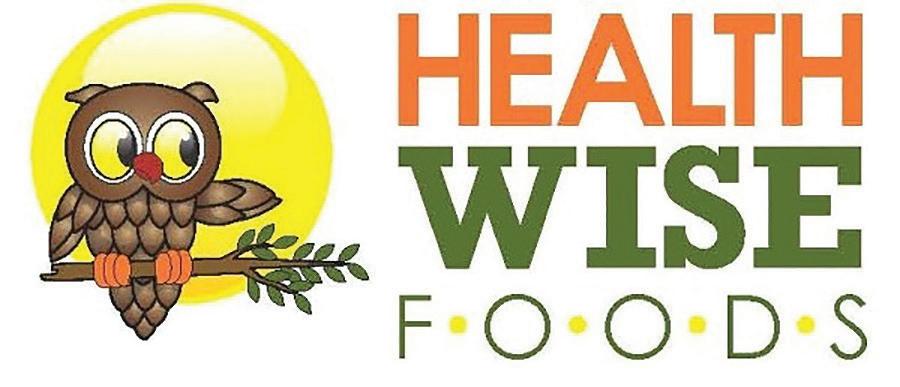

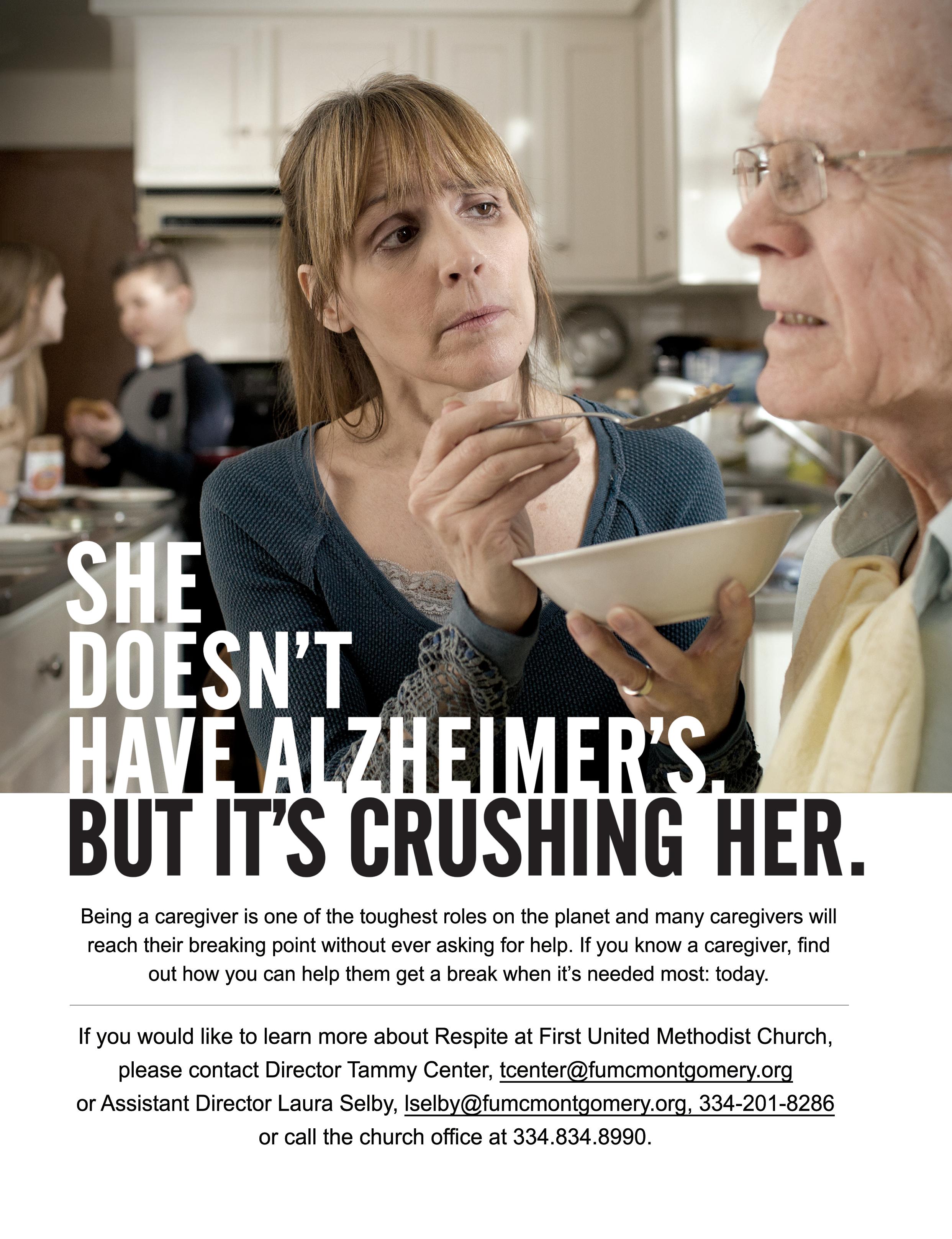
I ignored any negative comments of being the only girl drummer or the only girl in martial arts class; and I kept kicking and practicing every day.
This month’s cover profile is Carole Trawick Smith, the owner of the Family Karate Center located in Pepper Tree Shopping Center in Montgomery. Carole has been teaching karate since her days as a college student at Huntingdon College. When you do something, as long as Carole has done it, you become the expert in your field, and she has achieved that skill level in martial arts. Carole is an interesting woman who has experienced the loss of a spouse at a young age and fortunately found new love and husband to build a life with. Her grandmother rescued animals, Carole saw that compassion at a young age, and now she spends her time helping to rescue animals, especially cats. One of her rescues is a cat named MoMo who she has trained to be a service cat to bond with the many students who take classes at her Family Karate Center. When you meet Carole, you feel her energy because she doesn’t know how to slow down; she is selfless and a servant leader in her business and her community. She ages well by giving herself to others and to the many animals she has saved. We recently sat down with Carole as she shared her many experiences. We enjoyed getting to know her; we think you will, too. If you want to learn self-defense for protection and security, Carole’s Family Karate Center is a great place to start. Better yet take a friend and learn together!
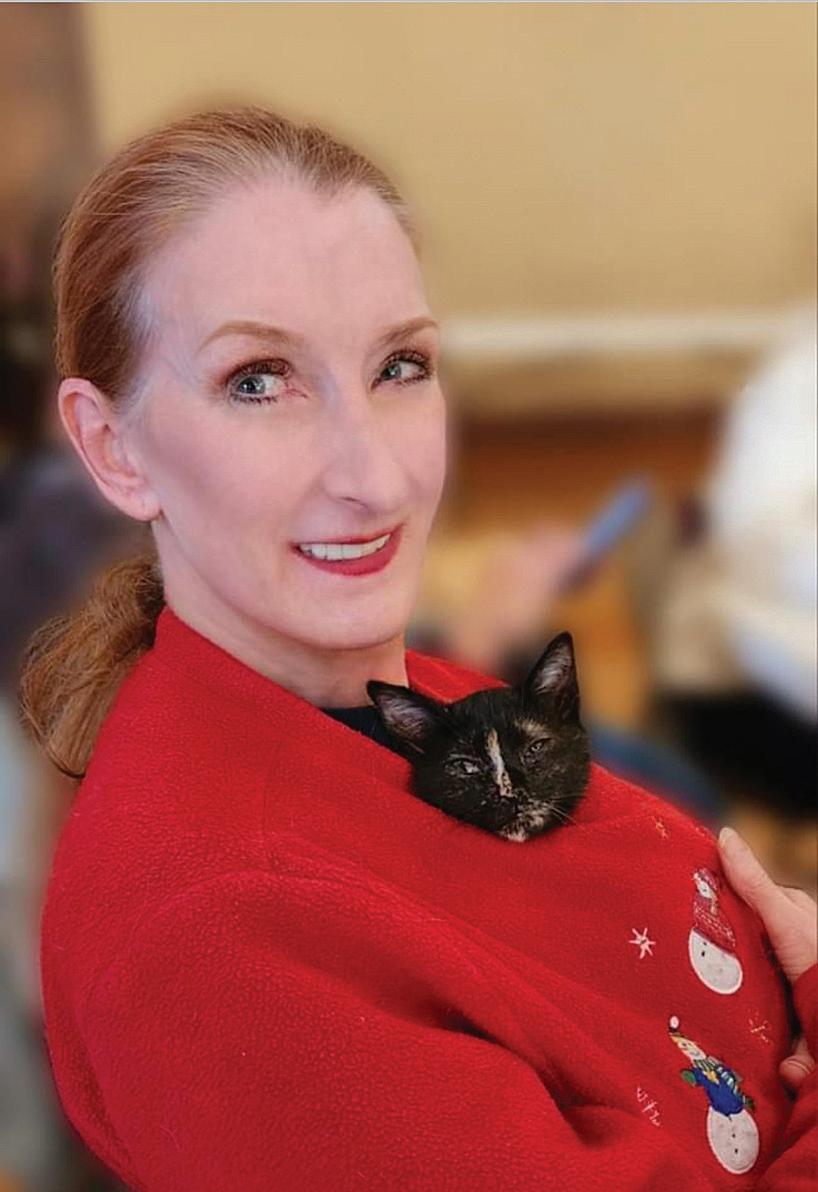
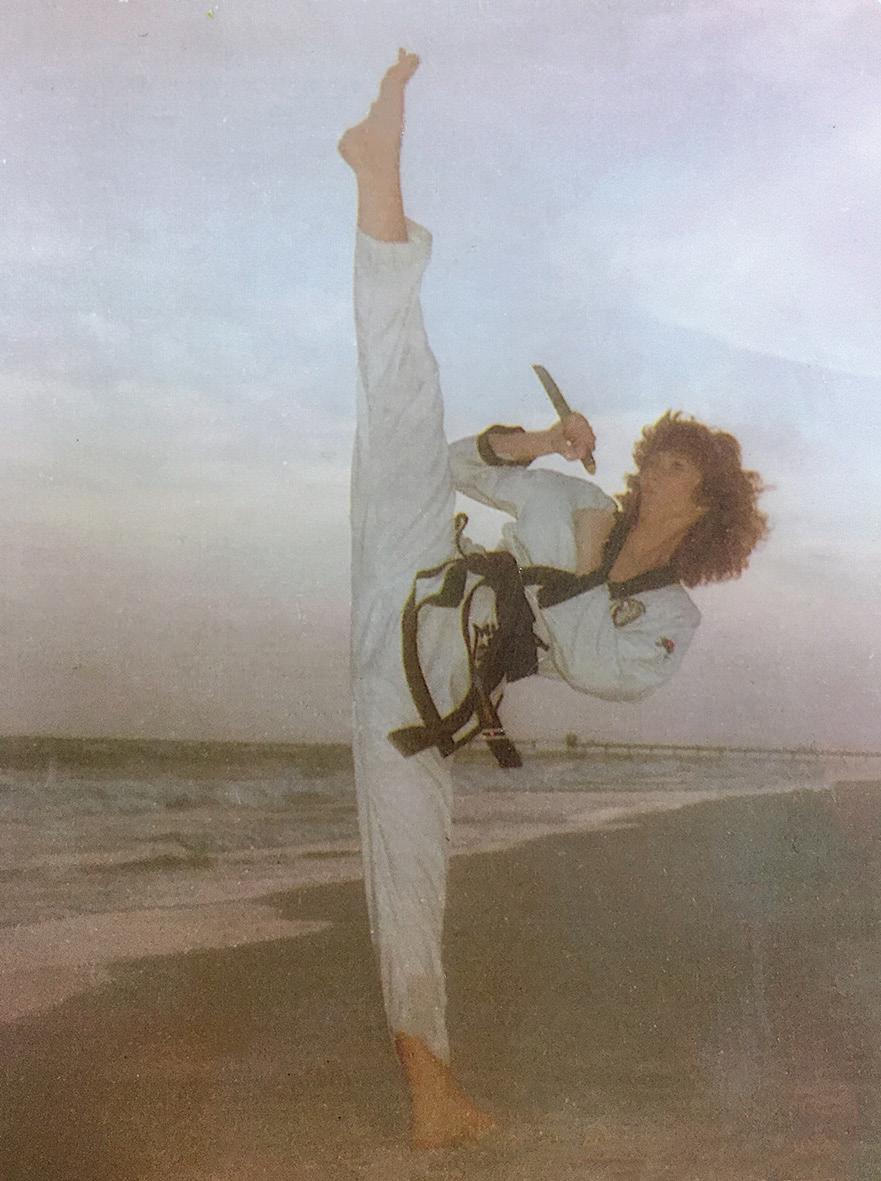
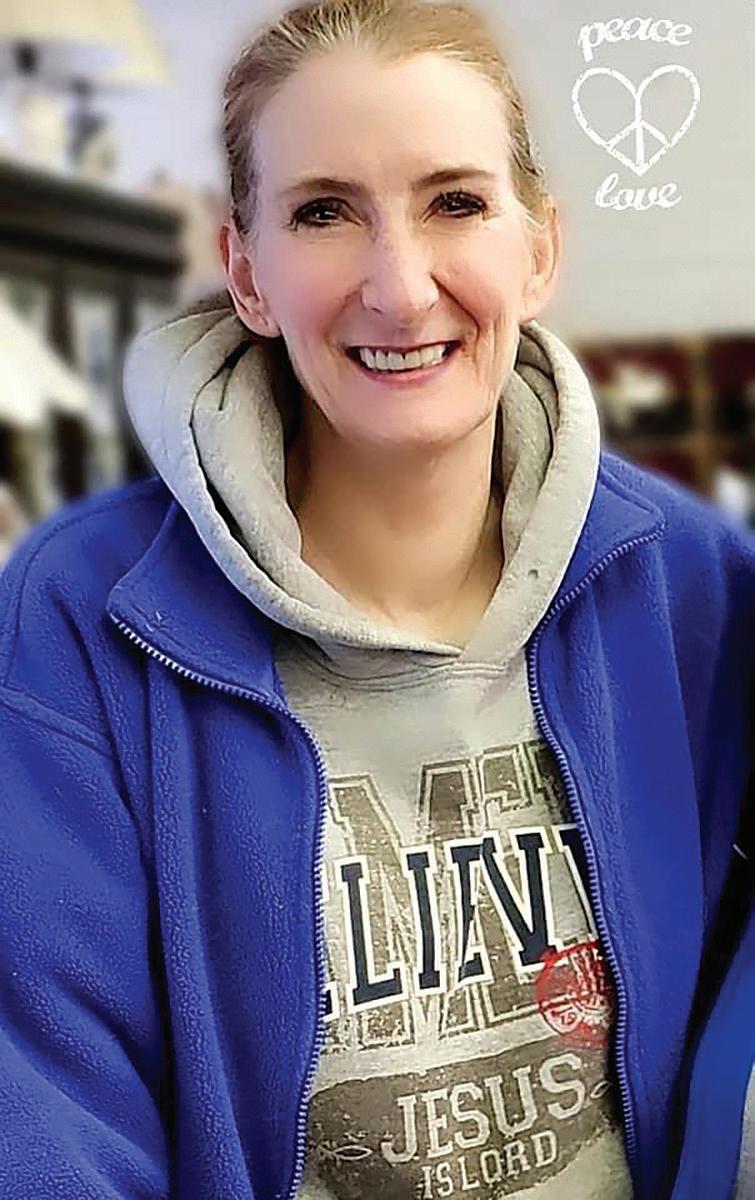
BOOM!: Please give us a brief biography, i.e., where you’re from, your education, what brought you to the Montgomery area, your children, your family, etc.
Carole: I was born here in Montgomery in 1960. I went to Forest Avenue,
Cloverdale Junior High, Jeff Davis High School, and Huntingdon College. I have my Masters from Auburn.
BOOM!: Carole, you own and operate the Family Karate Center, located in Pepper Tree Shopping Center, 8159 Vaughn Road in Montgomery. Can you
share with our readers how you became involved with Korean Martial Arts? Please explain the difference between Karate and other martial arts. What was your experience as a young woman studying Karate in a sport dominated by men? What has been Karate’s greatest benefit to you personally?
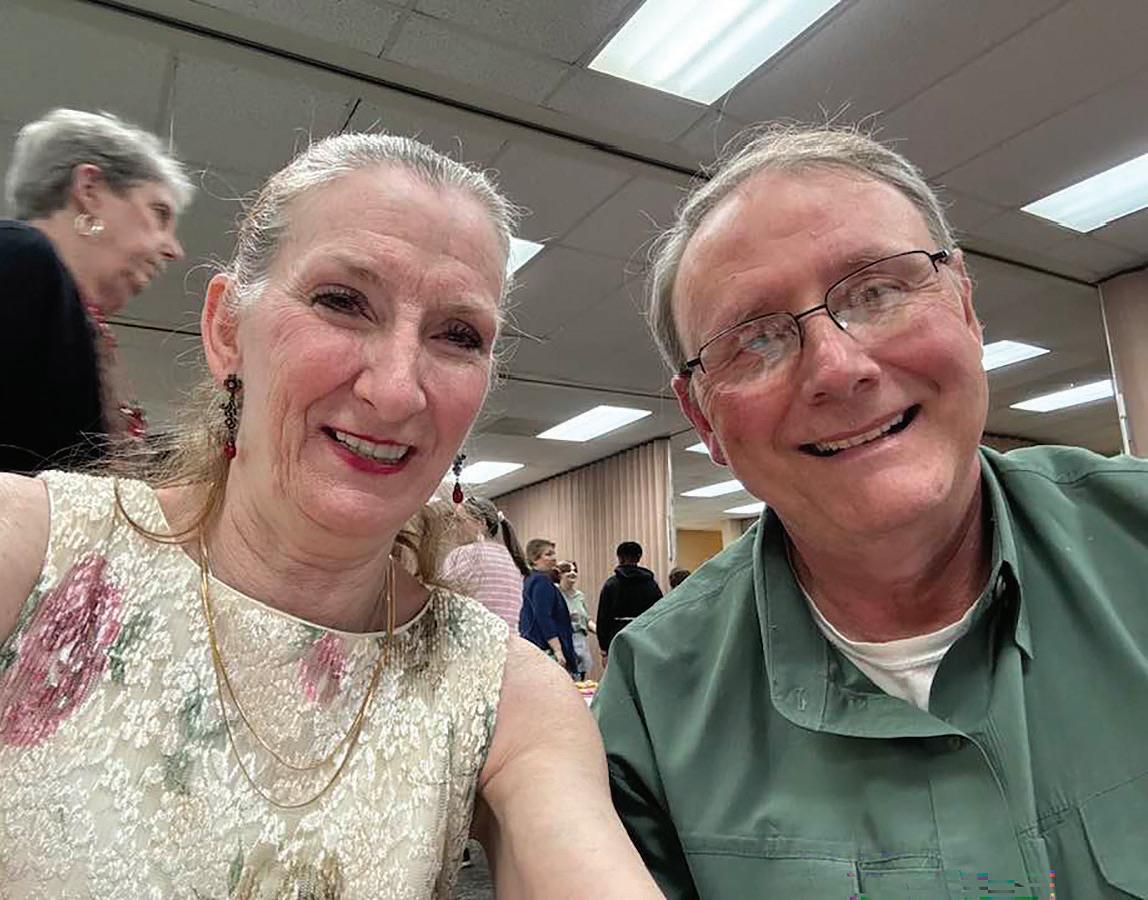
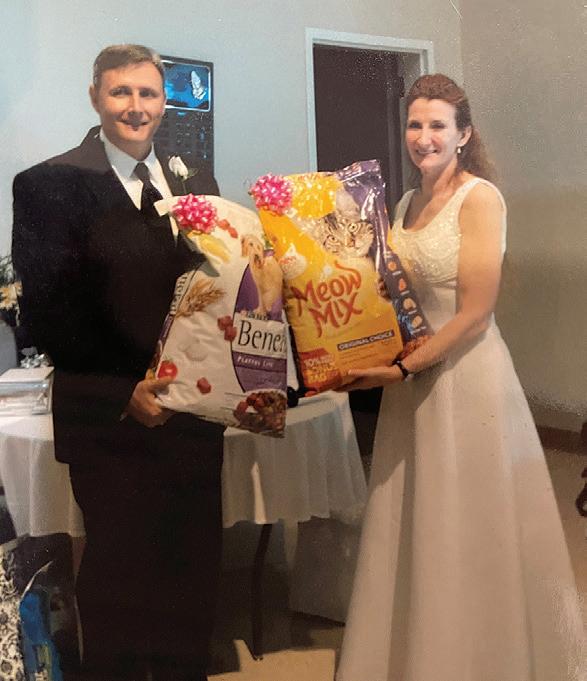
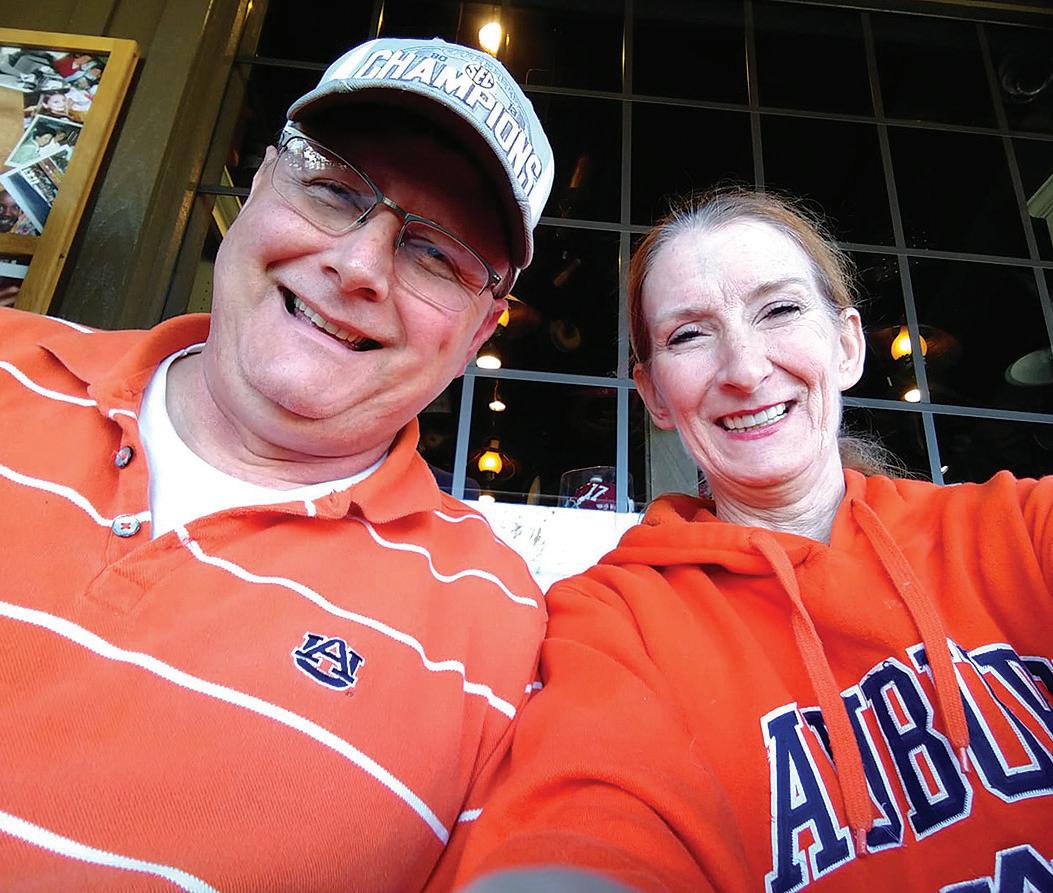
Carole: I have always loved martial arts, and knew this would be my passion when I saw Bruce Lee in The Hornet TV show when I was five. I looked at my mom and said, “That’s what I want to do. I want to be Bruce Lee!” In 1965, little boys had YMCA football, Dixie Youth Baseball, YMCA basketball, and Boy Scouts swim team, and girls had … cheerleading … for the boys. With my setting up targets around the house to practice every kick, Bruce Lee did on The Hornet, my mom knew she had to keep calling until she could find a martial arts class somewhere. Unfortunately, there were none. Even though The Hornet was no longer on TV, I still kicked anything that stood still enough and asked my brother, Wayne, to hold pillows for me to kick. In 1971, the first YMCA martial arts class opened. Needless to say, my mom had my name first on the list. I was the first female to sign up for Tang Soo Do martial arts in Montgomery that year. 52 years later, I’m still training and teaching this form of martial arts! I’m now an 8th Degree black belt.
BOOM!: Would you please tell us about your journey to own and operate the Family Karate Center? What were some of the challenges you had to overcome? Do you offer classes for all ages? Which ones do you prefer to teach? Who teaches the older adults? What’s the best way for our readers to take classes?
Carole: My instructor, KI Yul Yu, moved away when I was 15. My friend, Michael W. Hicks, a Montgomery Police Officer, and I wanted to keep the school going. We rented our first building and opened
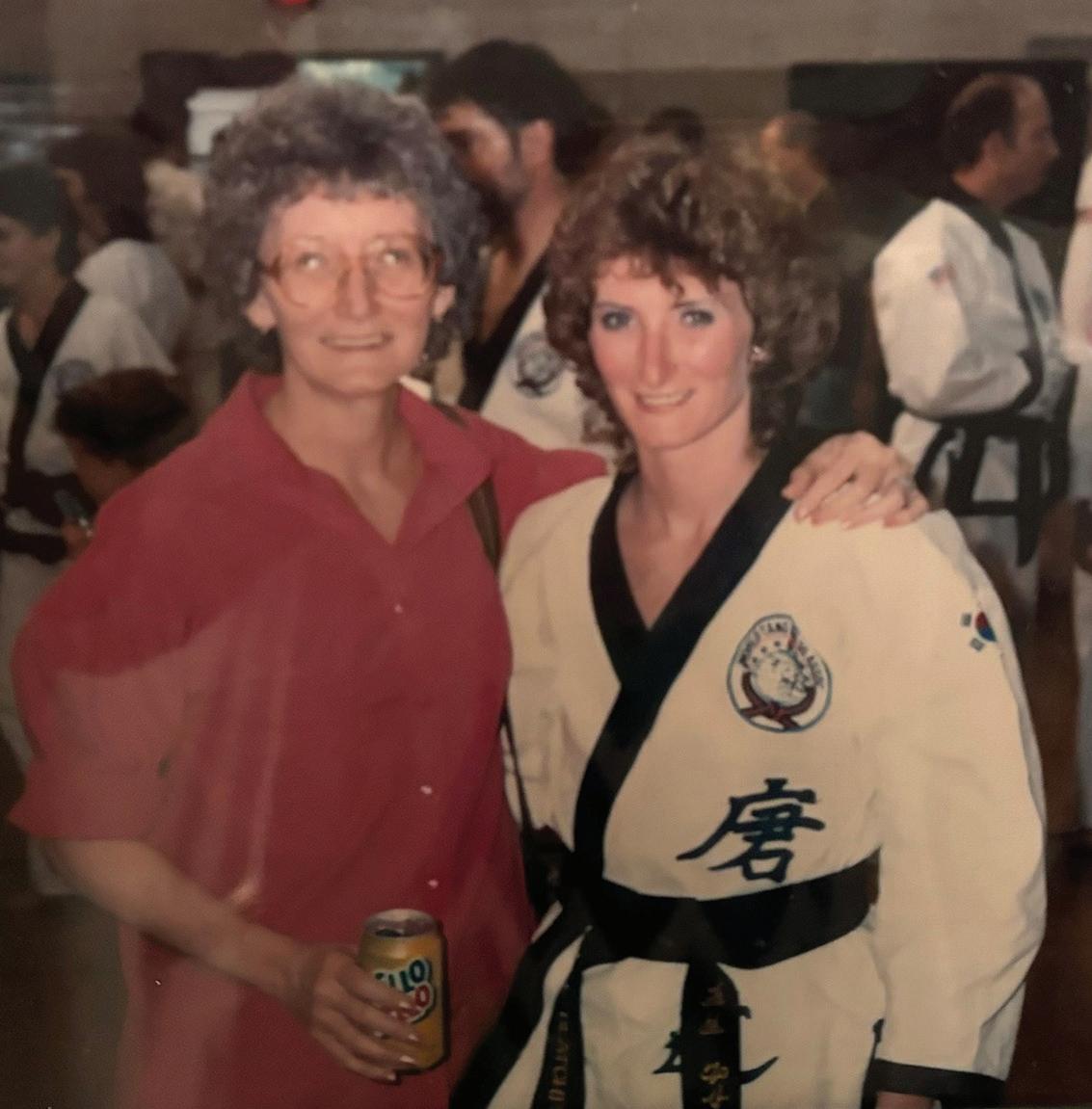
Montgomery Tang Soo Do Academy. I was beginning marching band as a drummer at Jeff Davis High School, so I had
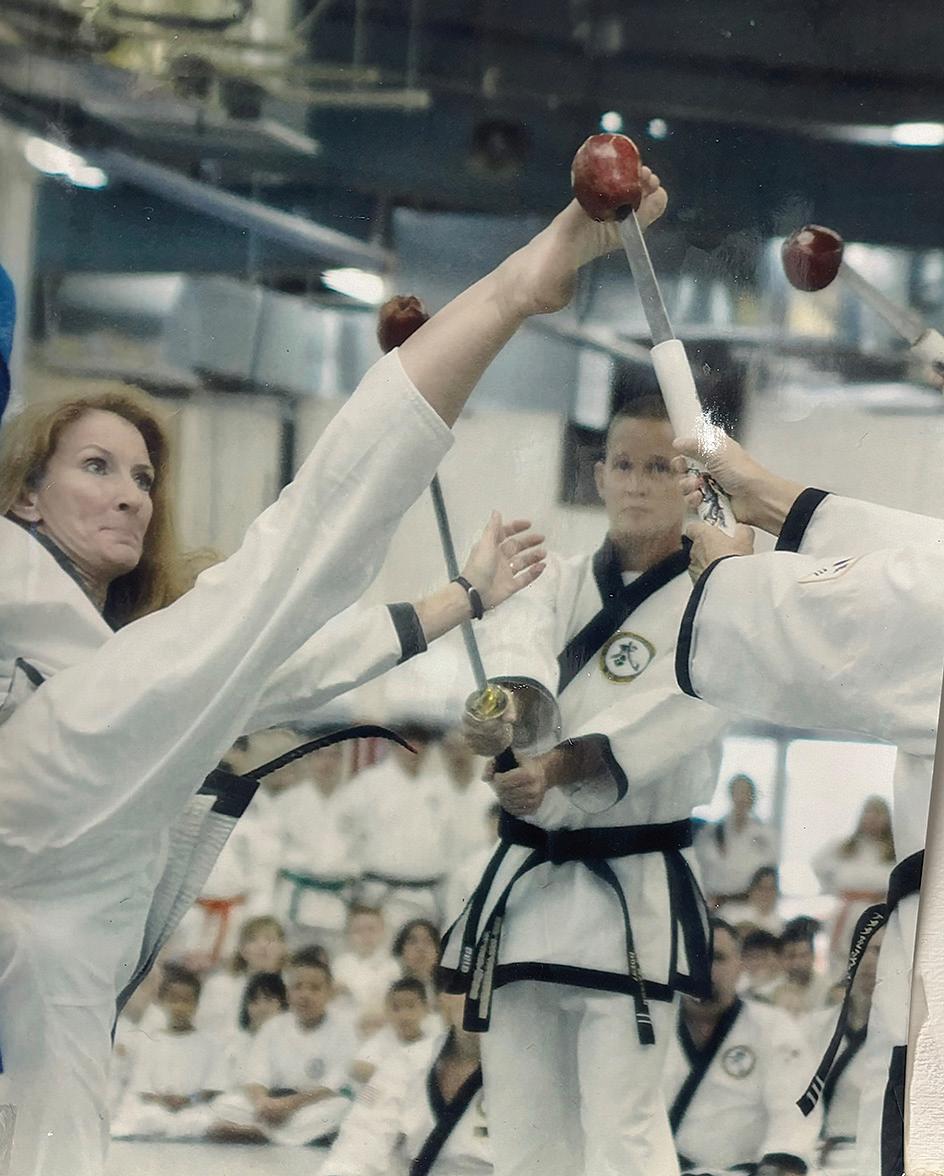
band and karate classes to keep me busy as a teen. When Master Michael Hicks moved to Birmingham, I started Family Karate Center, a full-time martial arts school. I was the first female to test for a Tang Soo Do black belt here, the first to open a karate school, and the first to test for a Masters belt. I kept my school running while I attended Huntingdon College and then Auburn. There have been challenges of being the only girl in a martial arts class—as it was being the only female drummer in a drum line. But Mom taught me to hold my head high and believe in myself. When I was told, “You kick like a girl,” Mom taught me to reply, “Yeah, and if you kicked as fast as I do, you could too!” I ignored any negative comments of being the only girl drummer or the only girl in martial arts class; and I kept kicking and practicing every day.
BOOM!: You have a compassionate heart for your students and their unique challenges. You encourage them to be the best they can be and instill in them hope. How would you describe your passion for these students? To go along with your compassion, you have trained one of your rescue cats, “Mo Mo,” to
be a service cat and comfort the students. Please describe how that happened.
Carole: My greatest joy is to see my students begin to have so much confidence in themselves. I work with special needs children who are unable to participate in football, baseball, et cetera. Their level of autism might make them too sensitive for team sports, but they excel in our classes. My ADDHD students are taught to focus and to set their goals in the way they learn. All students learn in a different way according to their special needs. Our instructors also show them how to achieve their goals. We teach 2-to 4-year-olds daily. Classes focus on antiabduction techniques and awareness of tricks used to lure them away, and our Bully Busters class focuses on why kids are bullies and how to protect themselves from bullies. My students are very much loved and cared for every day they walk in the door. MoMo is our specially trained care cat and helps us love people. He has his own Facebook page called Everybody Loves MoMo. You can learn all about him there. We offer one free week to try our program. Call 334-220-9319.

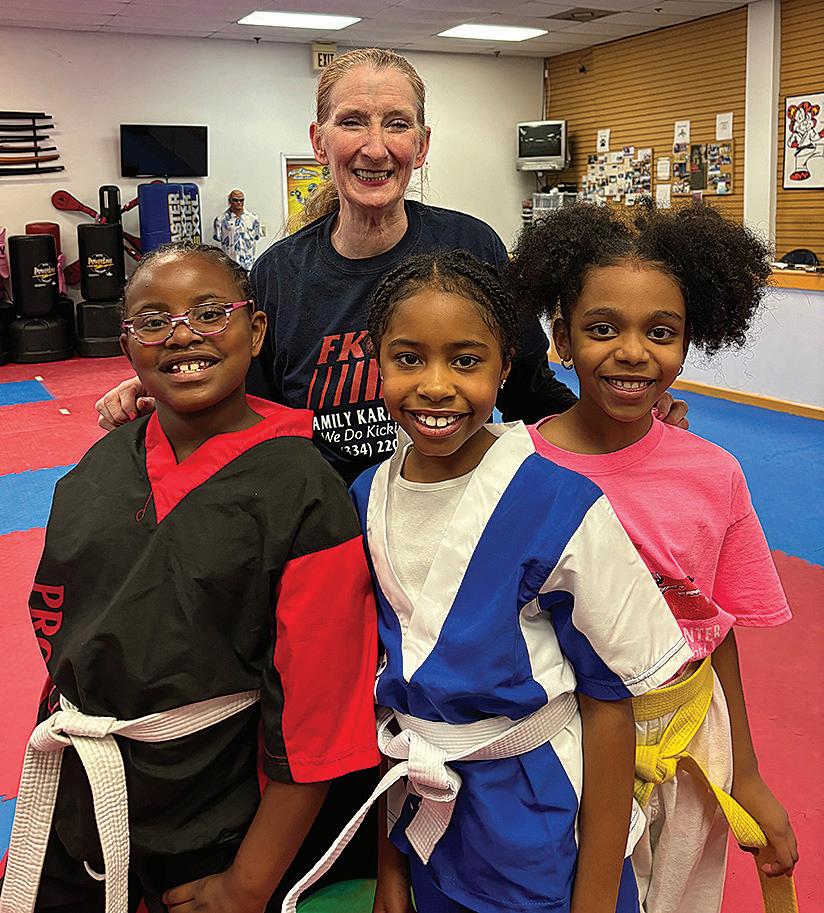

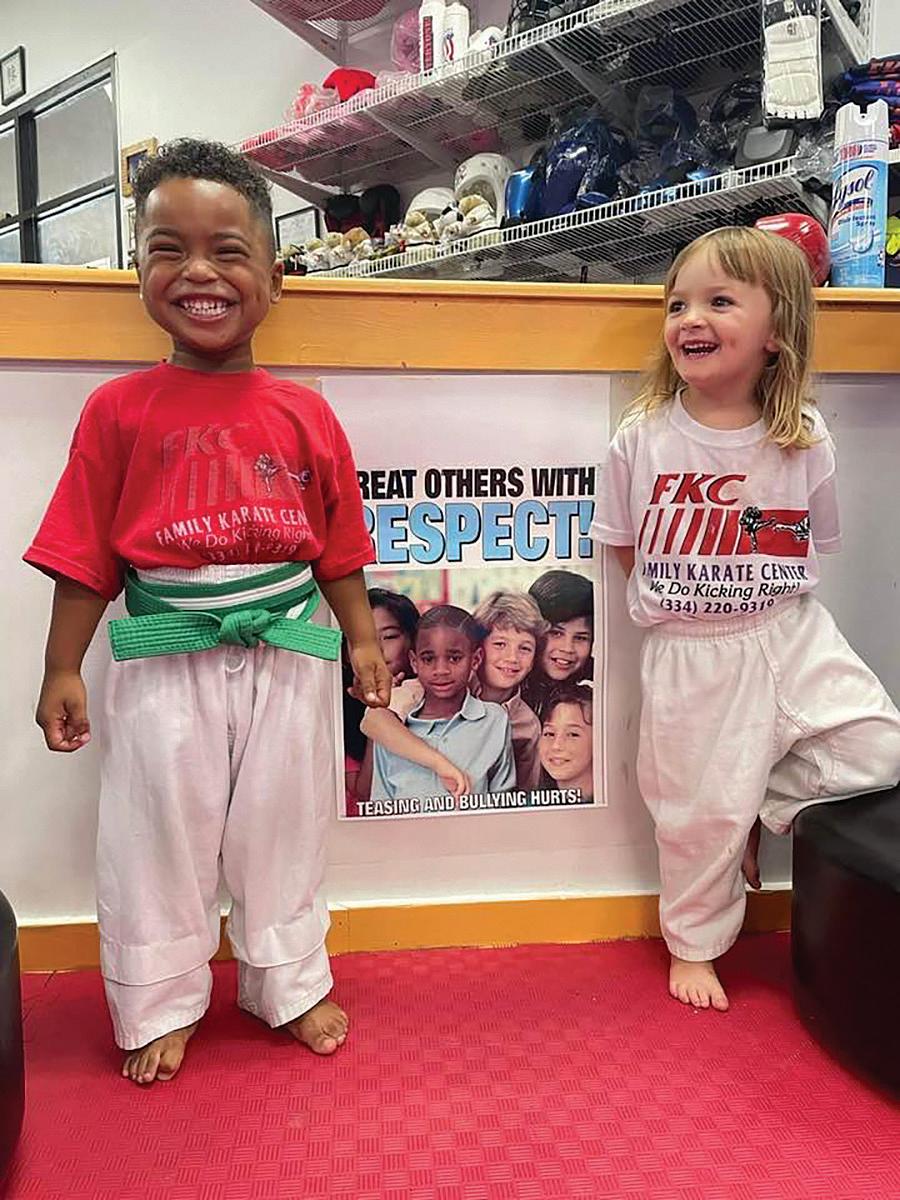
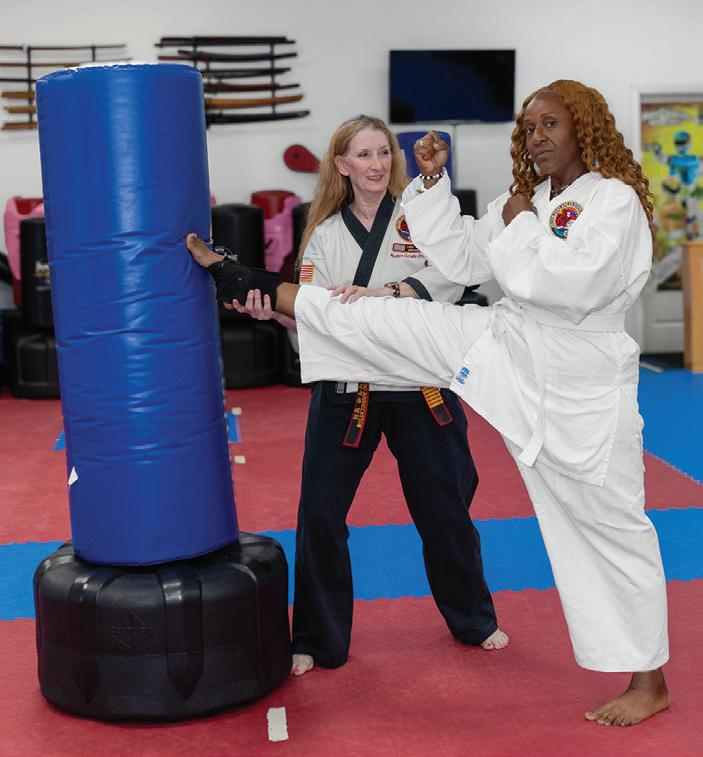
bad heart attack due to a genetic abnormality that enlarged his heart. This was right when we signed the lease for our new building, which was just sheetrock and cement floors. He wasn’t allowed to leave the UAB Heart Transplant Unit in case a new heart became available. So, I had to get the new school ready with the help of wonderful church friends. He was allowed to work slowly with students again. But he still needed a new heart. Morris was an excellent instructor. And we made a great team. But the replacement heart never came. He passed away in my arms after teaching class one night, doing what he loved most.
After 5 years of being a widow, living alone, running the school, and running Morris’ transmission shop, I met Sam Smith. I had never planned to remarry, and I was still heavily grieving Morris. But Sam and I started going to church together. My cats and church family loved him, so he “passed the test” as I laughed with him—because I’m very involved with my church and animal rescue.
BOOM!: You have experienced the grief of widowhood, like many of our readers, but you also found someone to share your new life with, your husband, Sam Smith. Would you share your and
Sam’s love story with us? Does he have a role in your business?
Carole: My husband, Morris Coker, and I operated the Family Karate Center together for 12 years. In 2004, he had a
BOOM!: Do you have time to be involved in the community, church, or civic organizations?
Carole: I am actually very involved
with two churches! I was born into Aldersgate UMC and started teaching martial arts at Vaughn Park Church of Christ in 1996. So, I call both churches my church family. I set up the 8:15 service in the chapel at Aldersgate, and I’m an usher, greeter, and praise team drummer. At Vaughn Park Church of Christ, I am on our Security Team and our MY ONE prayer team. Both of these churches were my saving grace when Morris died in 2007. I will forever be grateful for the love my two church families have always surrounded me with!
BOOM!: Besides teaching Karate, what are you most passionate about?
Carole: Besides teaching Karate, I am a drummer and animal rescuer. I started pulling out all my mom’s pots and pans when I started walking. I took a wooden spoon to play with them as long as she would let me. I watched my cousin, Regis Nicoll, play his drums. He would let me hold his drumsticks and hit each drum and cymbal. I was in such a perfectly happy place behind any set of drums. So, my mom bought a Ringo Starr Beatles drum set when I started kindergarten, and I’ve been mesmerized by playing drums since the first day I held real drumsticks. Marching with the Jeff Davis Marching Band for three years was the best years of my life. I played in different bands throughout college. And I now play for Aldersgate UMC.
My grandmother was an animal rescuer. She began taking me on cat rescues when I was old enough to be strapped in a car seat. Her home was a cat hospital/sanctuary. She taught me how to help injured cats, freezing, heat stroke, et cetera. She rescued cats until she passed away at 96. I’ve picked up her passion, rescuing animals with TAG (That Animal Group) here in Montgomery. We coordinate many fundraisers to help animals that need immediate attention. We trap, neuter, and release in order to reduce overpopulation. My car always has cat and dog food, bowls, water, emergency
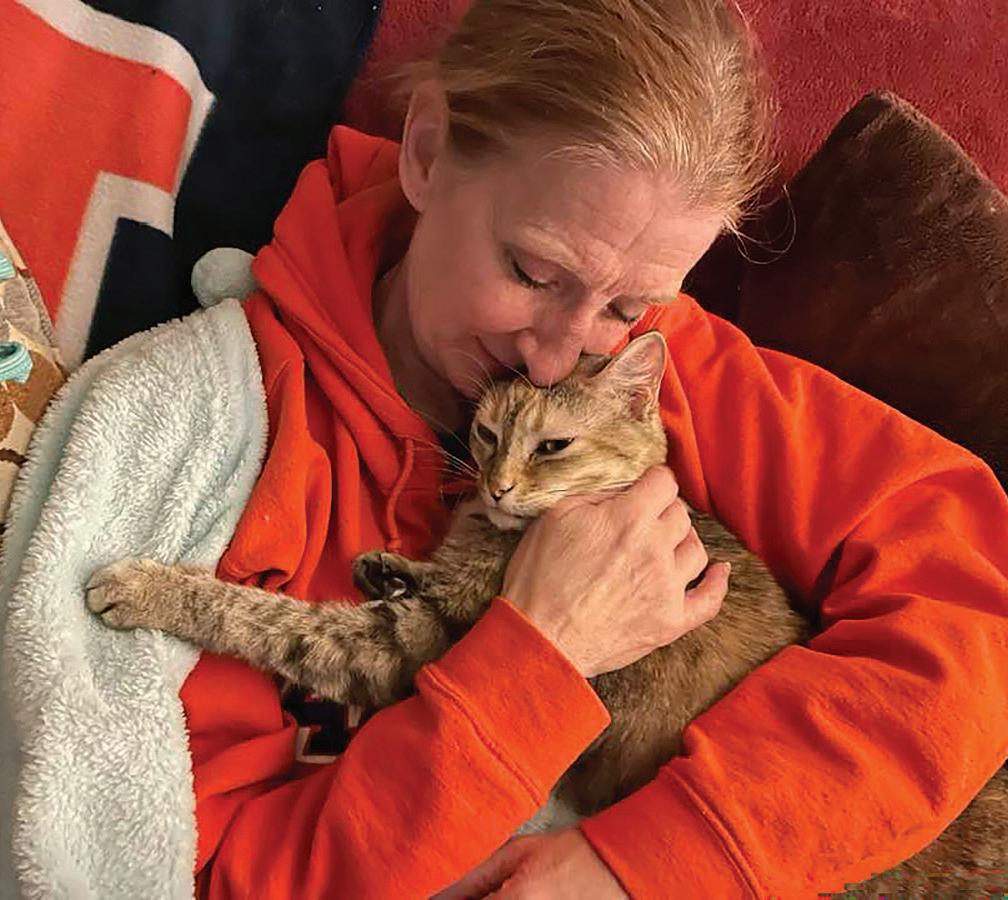
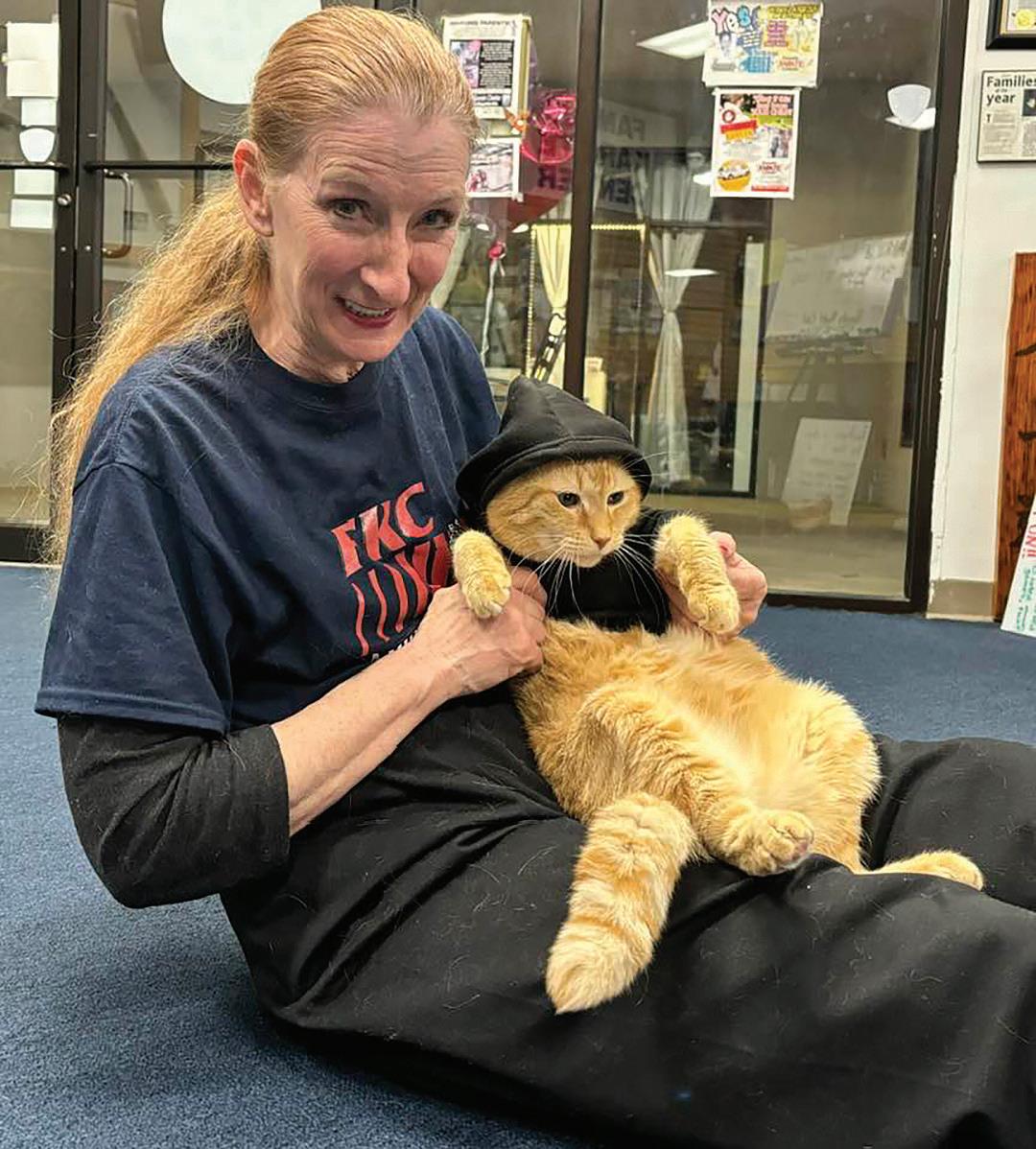
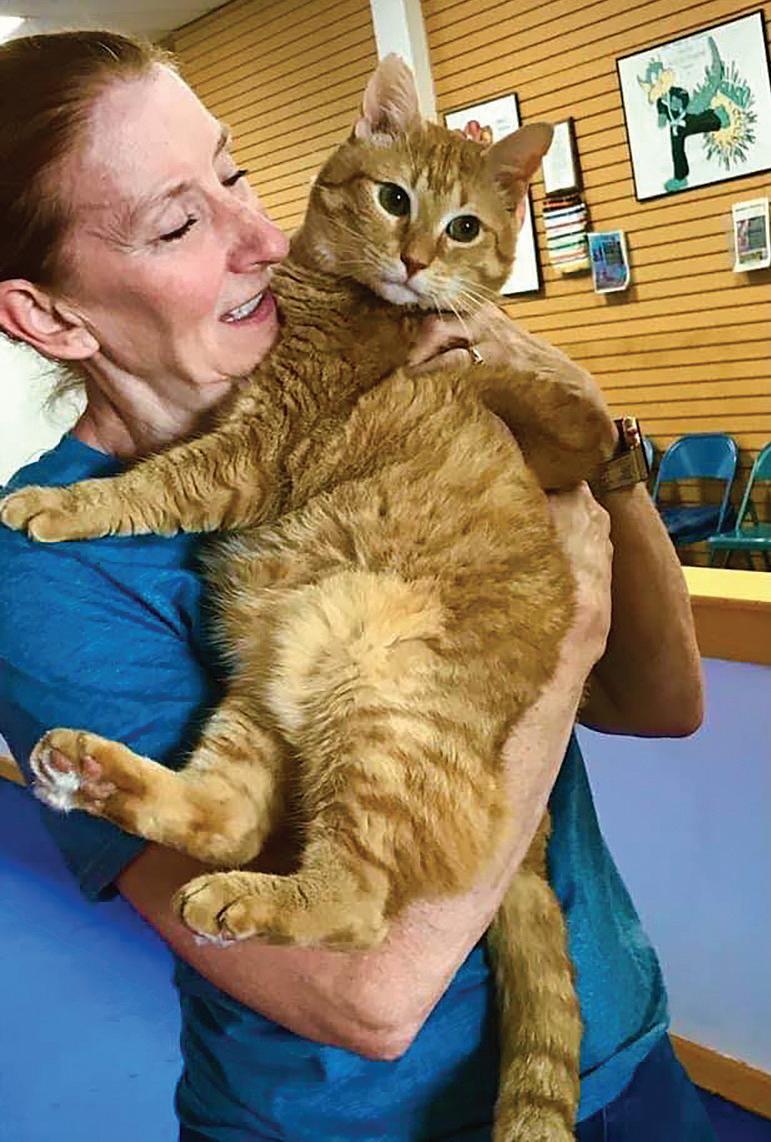
animal rescue supplies, people's food, and drumsticks. Always drumsticks!
BOOM!: What do you like about living in the Montgomery/River Region area? What do we need more of?
Carole: I have lived right here in the River Region all my life—in only two houses—and seen Montgomery change much in 63 years. When traveling on martial arts trips outside the South, I notice people's differences. Southerners wave at everybody. We stop and talk forever to people we don’t even know. Our kitchens are always open to everyone. Northerners aren’t familiar with Southern personalities—waving at red lights and all the talking. All of my family has passed, but I’ll be buried right here (in the South) someday alongside them.
BOOM!: How do you like to relax and wind down from a full day of activity?
Carole: After a long day of trapping cats for spay/neuter, teaching classes, feeding my colonies of homeless cats, and preparing food for the homeless people I help care for around our city, I love to come home to my cats and just hold them until we fall asleep together. I would say Aldersgate United Methodist and Vaughn Park Church of Christ would be relaxing/happy places too. My two church families are just more amazing and loving than I can put into words.
BOOM!: With a busy life, how do you like to spend time with family and friends?
Carole: As crazy as it can get trying to save all the homeless animals and people out there and run a full-time martial arts school by myself with the help of staff instructors, my friends are my Family Karate Center students, their parents, our instructors, my rescue village ladies, and my church family. In whatever capacity, serving God is what I love best!
BOOM!: What are some of your favorite
travel experiences?
Favorite getaway spot? Are any travel dreams planned?
Carole: Most of my travels are martial arts clinics and black belt testing. It’s hard to travel when you own a full-time business. But teaching martial arts is my passion and I’m living my dream job every day.
BOOM!: As you’ve aged, how have your priorities changed? How would you describe what it means to “age well”? What are your thoughts on retirement?
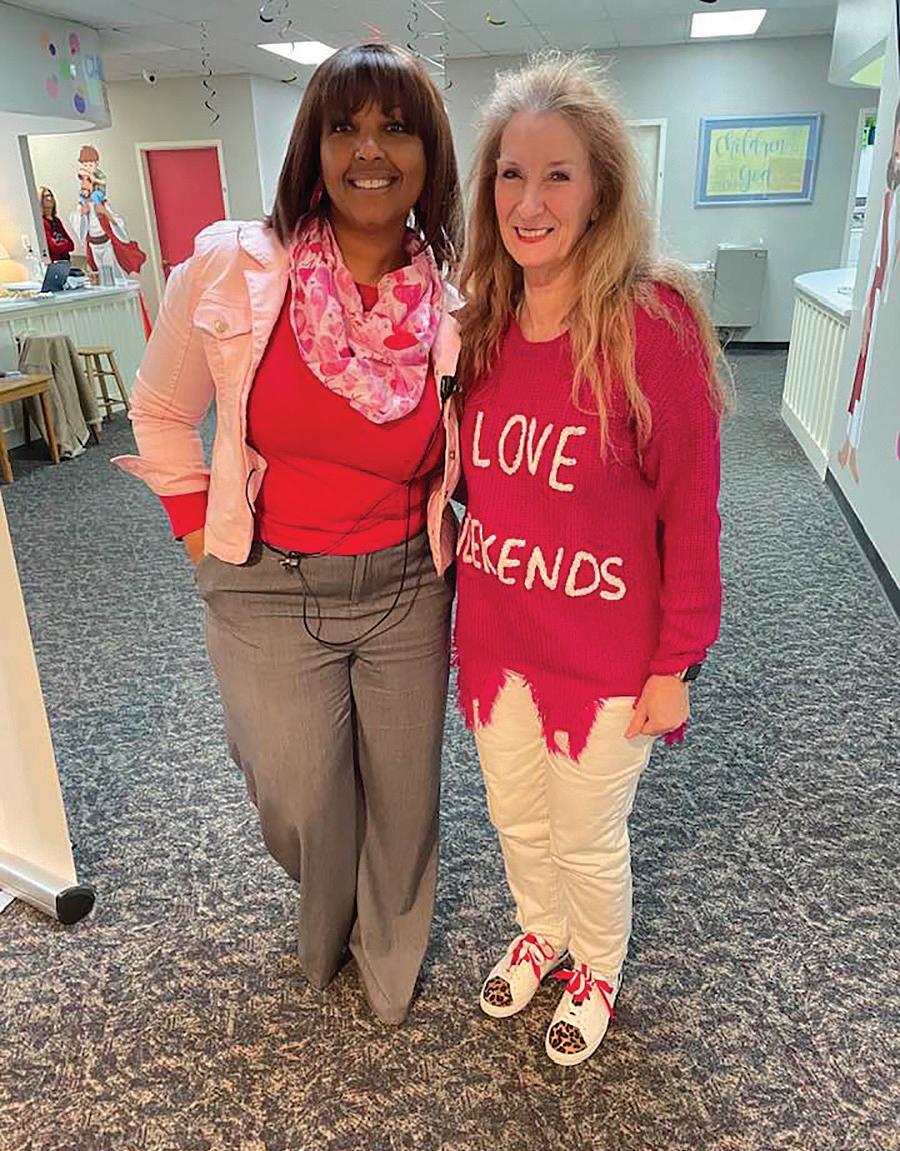
Carole: As I have aged, I am still learning so much more about martial arts and how to teach special needs students. We older instructors don’t like the aches and pains that take longer to heal after 60. But we welcome the bumps and bruises when we get out there with students during self-defense and sparring nights with boxing and kickboxing classes. My students say, “Wow, Master Smith, you kick fast for an old lady!” So, it’s true what they say: You don’t stop training because you get older; you get and feel older when you stop training!
BOOM!: Do you have any hobbies or other activities that grab your attention?
another Covidlike shutdown. Shutting down martial arts

Carole: Besides teaching Karate, playing drums for Aldersgate and animal rescue are my other main passions. Belonging to my two churches—being greeted at the door with so much love and feeling a part of a close, loving church family— is the best feeling ever. Serving God and loving my cats are my favorite things to do.
BOOM!: What future challenges are you contemplating for the Family Karate Center? For yourself?
Carole: I’m praying each day that we don’t have
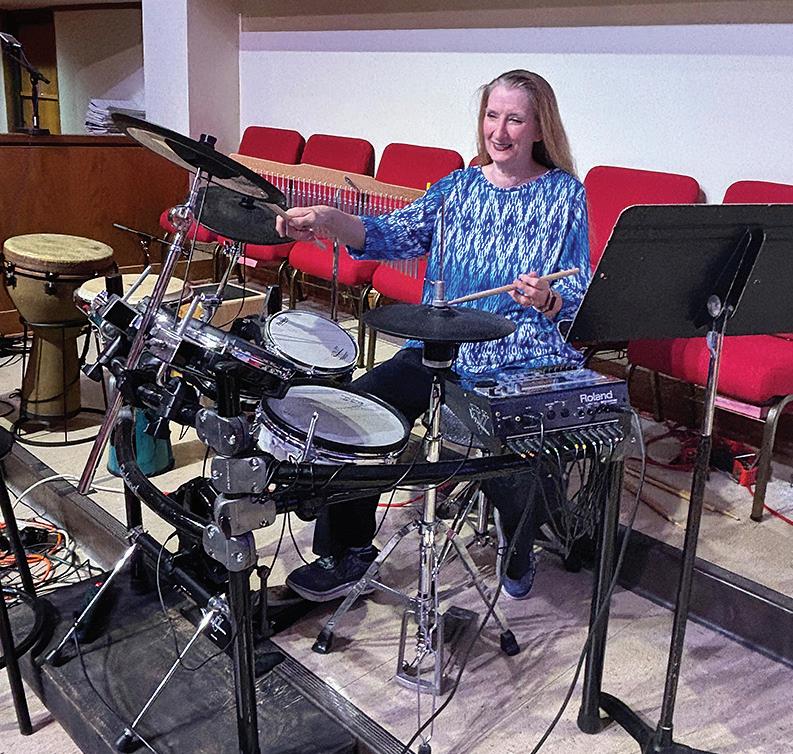
instruction two and a half years ago for three months was a very hard, challenging time. We couldn’t go
Our Family Karate Center is a safe place for children and adults who have been through traumatic experiences. We’re a home for special needs students who can’t participate in other sports. We have tutors that help children with their schoolwork. And we counsel anyone who is being bullied or has been through domestic abuse. Being a female Chief Instructor means women can come to me and discuss their situation that they don’t feel comfortable discussing with a man. We have our school open every day for the community—the community I’ve lived in all of my life.
BOOM!: Give us three words that describe you.
Carole: Three words that describe me? I asked my students to help with this question: Christian. Compassionate. Rescuer.
FKC Instructor Quotes:
to work, but our rent and utilities still came due. I don’t see myself ever retiring from teaching martial arts. Not saying it won’t happen. Just not anytime soon.
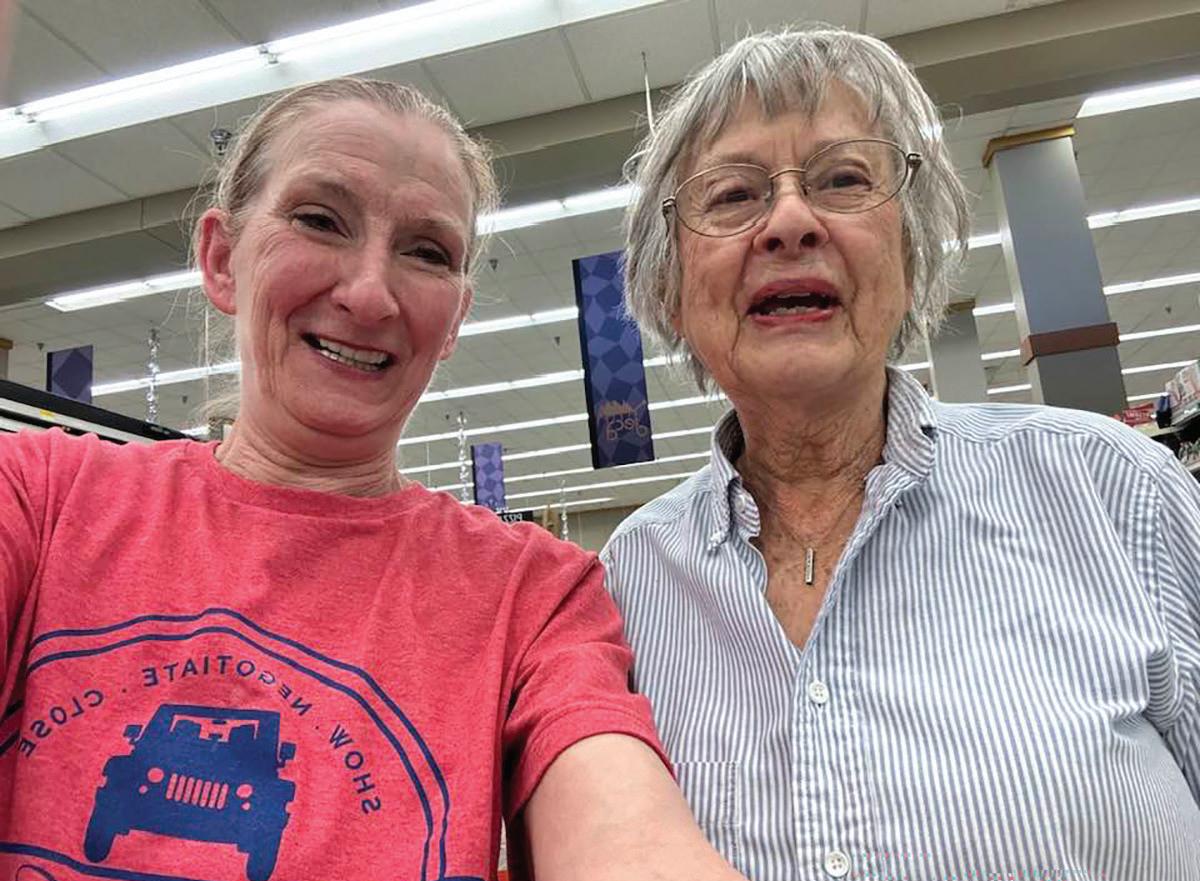
Cat trapper and feeder arrested in Wetumpka for helping starving homeless cats get food and spayed! At 86 years old, she was hand cuffed aggressively and put in the back of a police car in extreme heat!
Instructor Jennifer Majors: I’ve been here since I was a parent in 2015. Then, Carole convinced me to join in 2016. We brought my son here first to get some discipline. My son was on the spectrum—autistic things. He was having trouble focusing. Now he’s a 2nd-degree black belt. I’m a 2nd degree black belt. My husband is a 1st degree black belt. I started taking lessons because I’ve had RA (Rheumatoid Arthritis) since age 41. I’m 54 now. Karate keeps my joints from
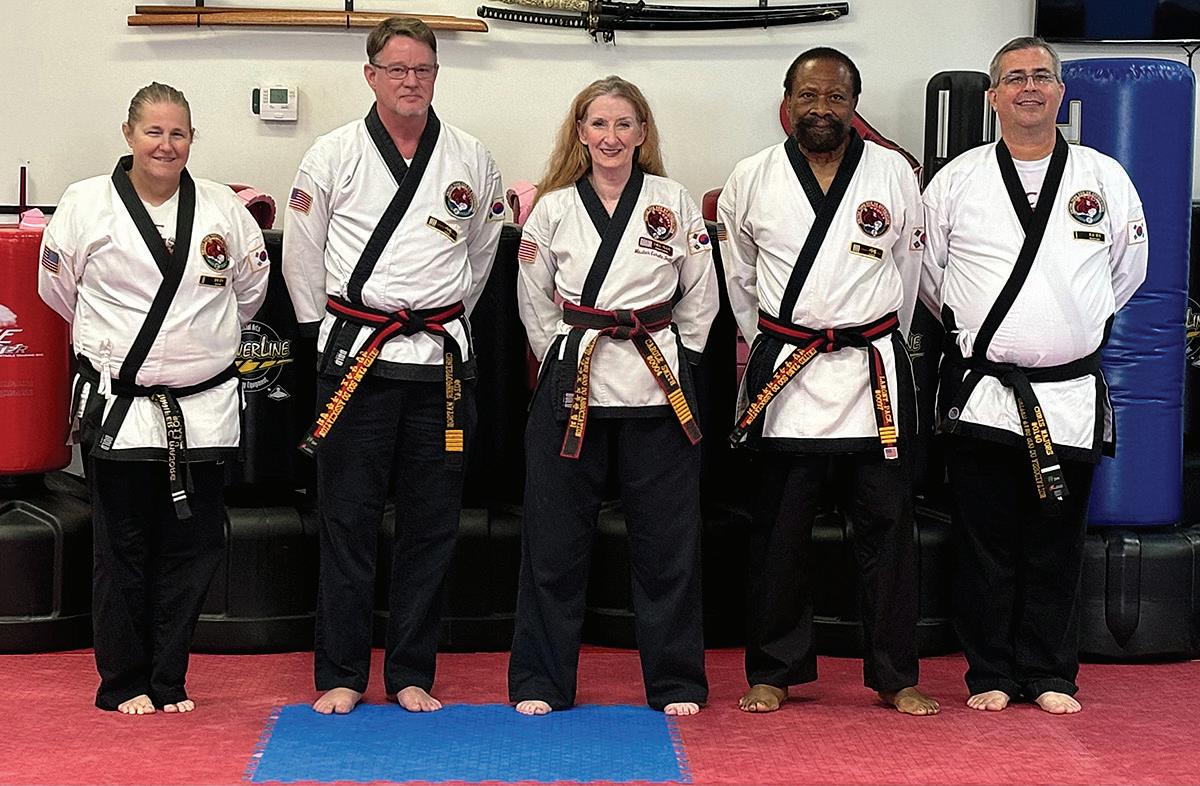
stiffening up. Even with medication, if you don’t move with RA, you still stiffen up. It’s kept me going because we stretch a lot before we do anything.
Instructor Chris Watson: What are some of the benefits of taking Karate classes? There are many benefits to taking Karate classes. One of the first things that I think about is how it has helped me maintain some flexibility which can help prevent more severe injuries as we are starting to get older. Another benefit that I find with Martial Arts is the discipline that it instills within you to keep going. Even when times are tough, we persevere and adapt. I have been working with Master Carole Coker Smith for close to 20 years now, and it is a wonderful experience to get to meet so many new students and to watch them grow and become martial artists and be promoted to black belts. To watch a beginning student learn their first form and get up to test in front of the higher ranks, the nervous expressions on their faces, and then to be told that now they are about to break a board to show how they have learned the technique. Then the amazement that they have once that board breaks. It is always a learning experience. Even as instructors,
we are all still learning and growing.
Instructor Chris Majors: My son, CJ, was taking lessons. My wife was taking lessons. I was not going to be the only one not breaking boards and kicking things! Karate has given CJ something he can feel mastery over. It really gave him mastery over his own body—being able to center and be confident about himself. And through that, be confident about dealing with others.
Master Lamont Pack: I was in Karate way back, starting in 1968, in Thailand. There was a Korean instructor on the base there. As a matter of fact, I started the first day I got there. They had a training building on the beach on the Gulf of Siam. This was during the Vietnam War. I signed up, I think, on a Monday. By Saturday, I was on a stage at the NCO Club in front of about 300 folks doing flying side-kicks and breaking boards. That’s how much the Korean instructor believed in me. He kept saying, “Concentrate, concentrate.” He didn’t speak too much English. But what he told you was enough to motivate you that you can do it. And that’s how I got started. When I left a year later, I was a brown belt. I left there and went to Vietnam. I continued
there as we had Korean instructors there, too—they were soldiers. They knew my instructor in Thailand. They all knew him very well. I guess he must have been a soldier at one time. So, I continued there during Vietnam. It took me many years to advance beyond brown belt. But when you’re a brown belt, you’re heck on wheels. Black belts begin to fear you because they kicked you all over the place when you were a white belt before you get to brown. But once you got to be a brown belt, you stood toe-to-toe with any black belt, and you gave them no rest.
What has your experience been like with Carole at Family Karate Center?
Super. Her values are my values. It’s all about the glory of God.
We want to thank Carole for sharing some of her life's story with us this month. Carole has much to share with all of us, especially how she serves others and connects with their emotional needs, including the many rescue animals she has embraced. We're proud to share her story. We hope you’ll share Carole's story with friends and family; they’ll enjoy the reading experience. If you want to reach out to Carole, please call Family Karate Center at 334-220.9319 or visit the center located at 8159 Vaughn Rd, Montgomery, AL. Her Facebook Page is is www.facebook.com/ smithstangsoodo/ Thanks to DiAnna Paulk and her creative photography skills. If you have questions, comments, or suggestions about our cover profiles, including nominating someone, please text them to Jim Watson at 334.324.3472 or email jim@riverregionboom.com
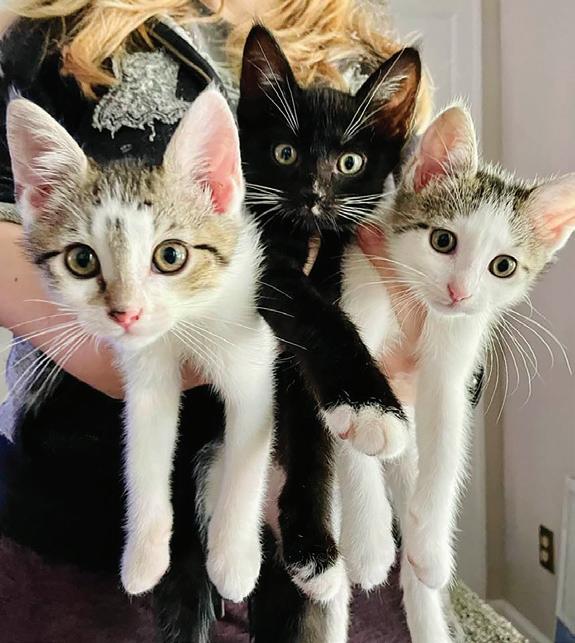



The statistics can’t be denied. Seventy percent ¹of Americans will need longterm care before they die. On average, someone needing long-term care will receive over four years of care in their home and then will go on to a facility, such as an assisted living, a memory care facility or a nursing home for another two years. Long-term care includes assistance with bathing, dressing, eating, moving around, toileting or incontinence due to physical limitations or cognitive impairment.
The interesting dynamic is how differently men and women tend to view long-term care, which relates to how they tend to think about risk. Harley Gordon, an influential elder law attorney, wrote a book about it, “The Conversation,” Helping Someone You Love Plan for an Extended Care Event.” He notes, “Men are wired to minimize if not dismiss risk in life. If there is no risk of a serious event happening, what consequences can there be? If there are no consequences, why put together a plan?” Whereas, he says, “women have an aversion to risk. They see the risk of serious event and the consequences of it as being inseparable.”
Gordon observes that trying to motivate men to plan for long-term care with the statistics doesn’t work because they don’t believe it will happen to them, whereas women hope it won’t but understand that the odds are that it will. He recommends that since men are most motivated by taking care of those they love, the conversation about planning for long-term care needs to focus on the consequences to those they love if they fail to take action and long-term care is needed.
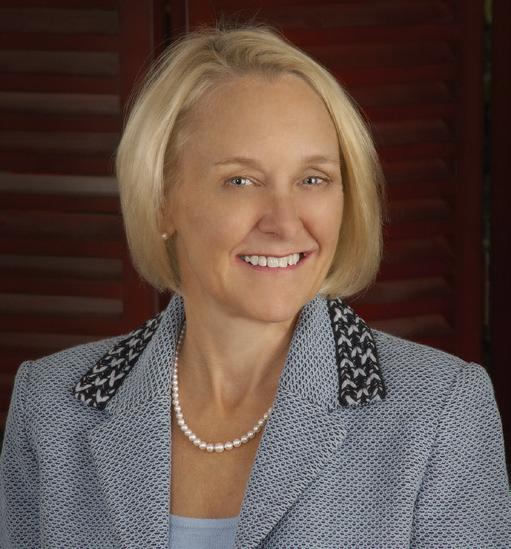
The cost of long-term care can be prohibitive. Genworth, in its annual ¹2023 Cost of Care Survey, estimated that a home health aide in Montgomery and Auburn area cost $2,097 a month or $25,164 a year. The cost of an assisted living facility in the Montgomery and Auburn area was estimated to be $4,345 a month, or $52,140 a year. So, six years of receiving long- term care in the Montgomery and Auburn area currently costs more than $312,000.
There are multiple ways to financially plan for long-term care, including traditional insurance, hybrid types of life insurance and long-term care insurance, long-term care annuities, self-insuring, etc. These methods will be covered in a Webinar format on Wednesday, July 24th by Susan Moore of Moore Wealth Management, Inc. at 12 p.m. Please call 334.270.1672, or email sarah@ moorewealthmanagement.com, for more information and reservations.
We conduct a variety of workshops and seminars at MWM. The mission statement of MWM is very simple: “and then some.” We attempt to do what is expected, what is required “and then some”. The Planning for Retirement workshop is part of our monthly “and then some” workshops. In addition, MWM conducts daily current events market updates that attempt to explain what is going on in the financial world. If you would like to be on the mailing list or receive email notifications of upcoming webinars, please call 334.270.1672
Susan Clayton Moore, J.D., is a financial advisor and wealth manager of Moore Wealth Management, Inc., with offices in Auburn, Montgomery, and Alexander City, AL. Susan has under advisement assets over $170 million (as of 1.21.2022) in brokerage and advisory assets through Kestra Financial and has been a financial planner for over 40 years. Contact Susan at 334.270.1672. Email contact is susan@moorewealthmanagement.com
The opinions expressed in this commentary are those of the author and may not necessarily reflect those held by Kestra Investment Services, LLC or Kestra Advisory Services, LLC. This is for general information only and is not intended to provide specific investment advice or recommendations for any individual. It is suggested that you consult your financial professional, attorney or tax advisor regarding your individual situation.
Securities offered through Kestra Investment Services, LLC (Kestra IS), member FINRA/SIPC. Investment Advisory Services offered through Kestra Advisory Services, LLC (Kestra AS), an affiliate of Kestra IS. Kestra IS or Kestra AS are not affiliated with Moore Wealth Management, Inc. https://bit.ly/KFDisclosures. ¹https://www.genworth.com/aging-and-you/ finances/cost-of-care.html
“It Won’t Happen to Me” Webinars Wednesday, July 24th, Noon, Register today 334.270.1672
There are multiple ways to financially plan for long-term care, including traditional insurance, hybrid types of life insurance and long-term care insurance, long-term care annuities, self-insuring, etc. These methods will be covered in a Webinar format on Wednesday, July 24th by Susan Moore of Moore Wealth Management, Inc. at 12 p.m. Please call 334.270.1672, or email sarah@moorewealthmanagement.com, for more information and reservations.
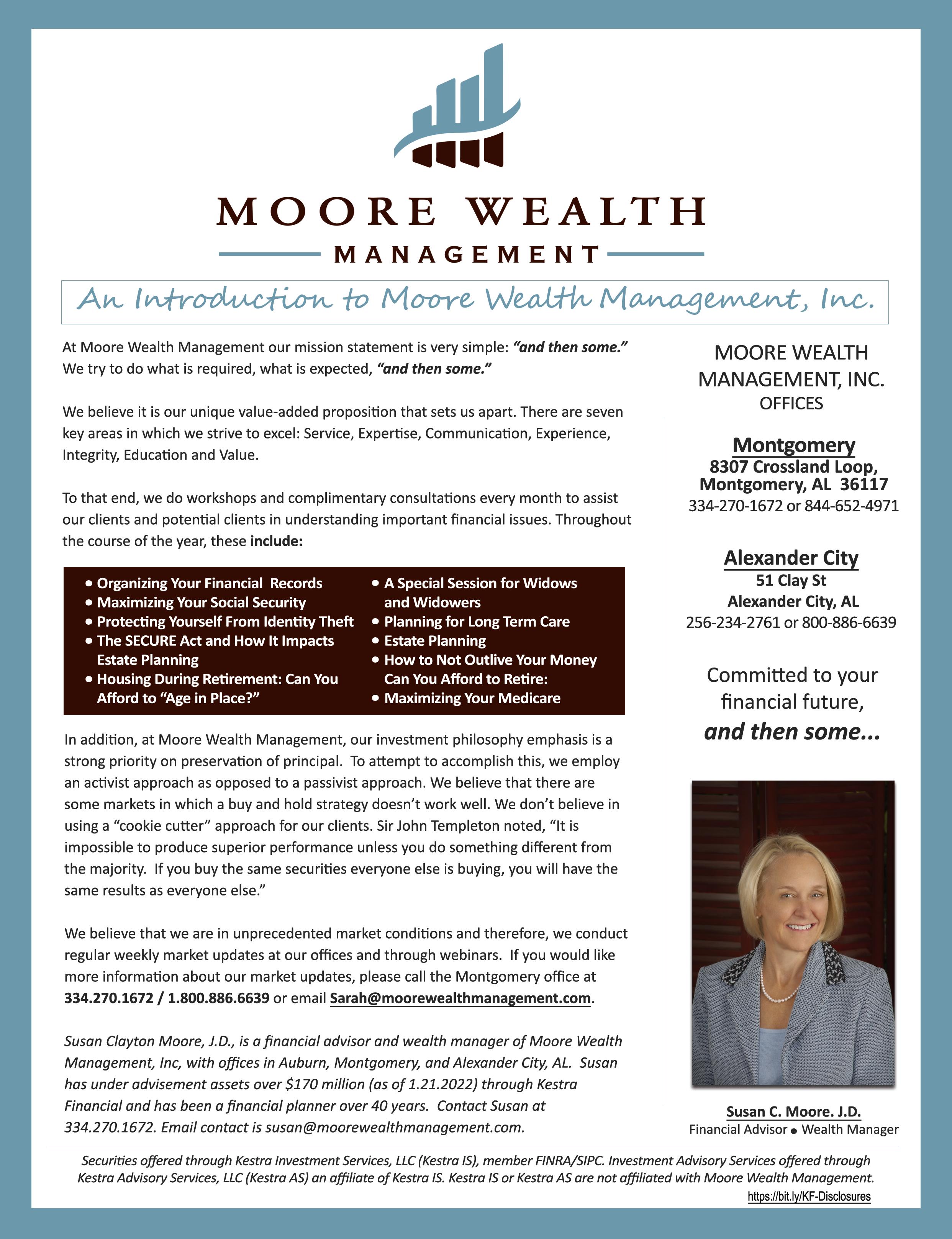
I read something this past month that really hit home for me. It rang true for so many areas of our lives, that I just thought it was important enough to share today.
In a nutshell - It doesn’t matter how small a change you make for the better, the continued nature of that change will have a bigger impact down the road.

I know we all know this deep down, but sometimes we just need reminding. I so often hear people say, for instance, that they don’t bother recycling “because none of it gets recycled anyway”. Well, if we all thought like that, then yes, obviously none would get recycled, but if we all recycled just one plastic bottle a day – properly, removing the top and the label, rinsing and emptying it out – then just in the US we would have recycled over 333 million bottles in just that one day! Just imagine the impact that would have on the environment.
What got me thinking about this was one small change Costco made recently. They switched from putting their hot rotisserie chicken in a double plastic container –black plastic base, clear plastic lid – to a plastic bag. Still plastic yes, but based on last year’s sales, it will save an estimated 17 MILLION pounds of plastic every year! Just from changing one form of packaging! And it goes beyond that; it takes up less space, so they can transport more on a truck at one time. One pallet of the new bags is equivalent to 5 pallets of the old containers, so Costco can remove 1000 of its freight trucks from the road each year.
This reduction in freight will eliminate over 4000 metric tons of carbon dioxide every year. (Information comes from Costco Connection, June 2024).
That whole series of domino effects from just that one simple switch was quite mind-blowing to me. For such a big series of improvements to have come from just one simple change by one single company was, quite frankly, awe inspiring. Why aren’t more companies doing this? Hopefully they are and will, but we can all contribute to that domino effect; we don’t have to be a big company like Costco to make a difference. Even small changes in our daily lives can add up to significant changes in the health of our planet and therefore our health and that of our children and grandchildren.
On the beauty and healthcare side, packaging has been historically over-sized and incredibly wasteful of resources. For example, I bought 6 (plastic) bottles of a healthcare supplement recently and when I opened them at home ALL the tablets from all 6 bottles would have fit in just 1! What an incredible waste.
There are companies out there now that are packing more conscientiously. Lush,
for example, is a brand that has been doing this for some time now. To start with they produce a lot of solid bars – solid shampoos and conditioners for example, that don’t need to be bottled, so can just be wrapped in paper packaging. Then their actual plastic pots are just the right size for their contents, are fully recyclable and have labels that easily peel off to do so (because it is a pain when you’re trying to do the right thing, but it becomes such a monstrous task trying to get the label off that you just give up.)
You will also see companies like L’Occitane and David’s using fully aluminium tubes so they can be recycled (the plastic ones generally cannot because you cannot clean them out sufficiently). Other companies will use bamboo packaging, which is great as it is a super-fast renewable resource, though I have only seen it in lip balm and deodorants so far, but hopefully more will be coming. Companies like Clarins make sure that their products are made from completely recycled materials. The list goes on.
There are options out there that are more environmentally friendly and if we all made just one switch in our daily routine, just think how big an impact 333 million small changes would have nationally, and then globally. We have an obligation to do this for our kids, and for their kids. This is not the time for complacency. This is the time for action; one small action from everybody will have a dramatic impact on our future world. I implore you to consider this the next time you go shopping.
email: nyrbhalla@gmail.com I web: us.nyrorganic.com/shop/tracybhalla I www. LogHouseAromatics.com

